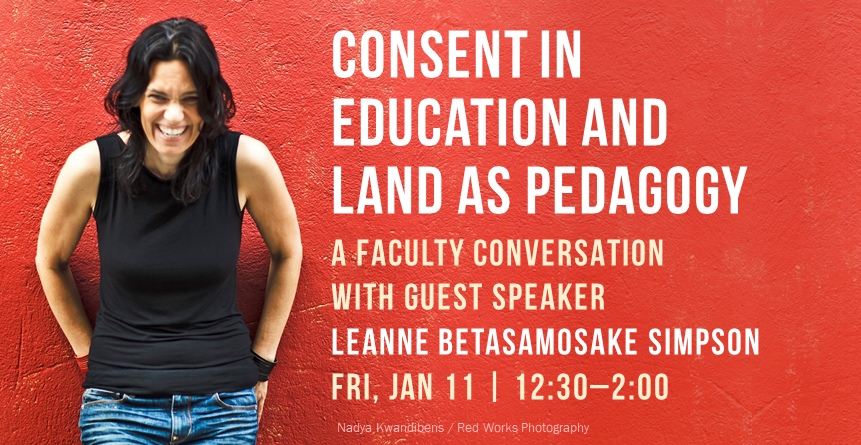
Learning and teaching event archive
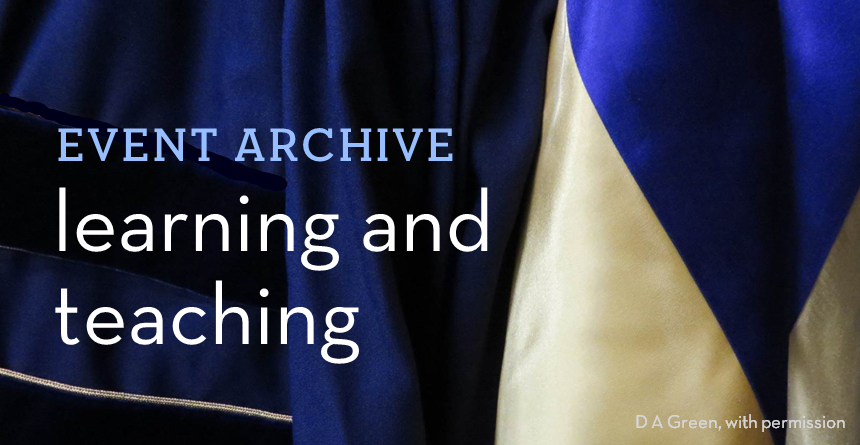
Below you will find an archive of our past events and programs on learning and teaching topics, listed in reverse chronological order. The Center for Faculty Development staff are able to consult with Seattle University faculty on any of these topics, and many other learning and teaching topics, as well.
Click the red plus below the year in order to view that year's list of events.
2023–24
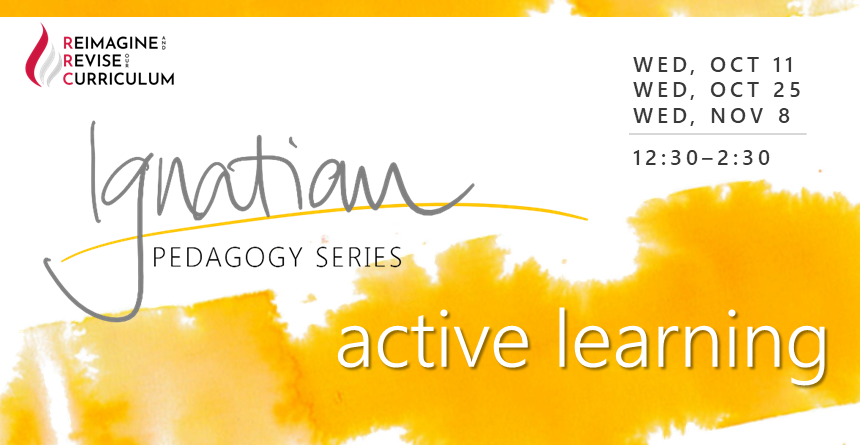
-
23FQ Ignatian Pedagogy: Active Learning - details
-
Ignatian Pedagogy Series: Active Learning
Co-sponsored by the Center for Jesuit Education (CJE)
As a participant in this module of the Ignatian Pedagogy Series, you will:
- Explore how active learning is supported both in higher education literature and in Ignatian Pedagogy.
- Experiment with a range of active learning approaches as both a student and a teacher.
- Examine active learning as a vehicle for transformative learning.
- Reflect on the experience of new active learning strategies.
- Develop concrete plans to embed active learning strategies in future courses.
What are the dates?
It’s important that participants attend all three sessions in the series.
- Wed, Oct 11 | 12:30–2:30 | In person | Casey Commons (CASY 530)
- Wed, Oct 25 | 12:30–2:30 | In person | Casey Commons (CASY 530)
- Wed, Nov 8 | 12:30–2:30 | In person | Loyola 302
Lunch and refreshments are provided at each session, with support from the Endowed Mission Fund.
Who is facilitating the module?
The entire series is co-facilitated by Andrea Verdan of the Center for Faculty Development and Jen Tilghman-Havens of the Center for Jesuit Education. Jenny Loertscher (Chemistry) and David Green (Center for Faculty Development/International Studies) will also be joining them in these sessions. All share a passion for this transformative educational approach.
How do I register?
Register using the regular link for this quarter’s events from the Center for Faculty Development (also included below). It’s essential that you can attend all three sessions of the series, so please be sure to block off all three times on your calendar before you receive confirmation of your place.
What if I have questions?
If you have any questions about the Ignatian Pedagogy Series, please email faculty-development@seattleu.edu or Andrea Verdan (verdana@seattleu.edu) or Jen Tilghman-Havens (tilghman@seattleu.edu) directly.
» Register
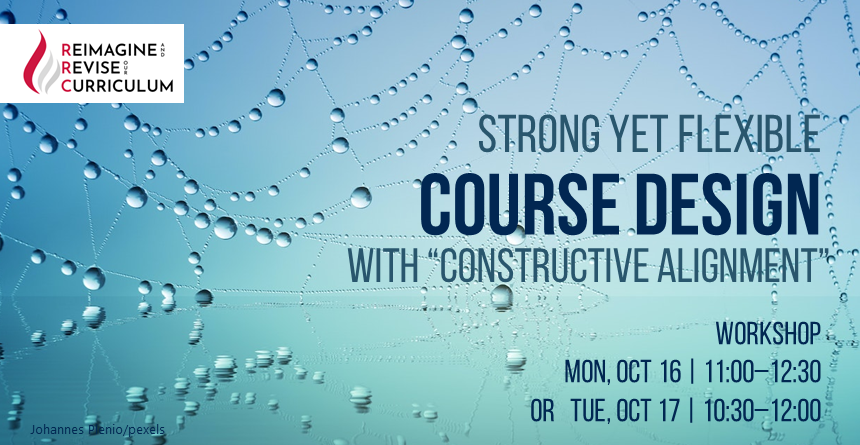
-
23FQ Course design with constructive alignment - details
-
Workshop
Strong yet flexible course design with "constructive alignment"
Mon, Oct 16 | 11:00–12:30 | Via Zoom | Zoom link provided upon registration
OR
Tue, Oct 17 | 10:30–12:00 | In person | Casey Commons (CASY 530) | Coffee, tea, and snacks provided
Co-facilitated by David Green and Katherine Raichle
Designing (or redesigning) a course can be overwhelming, and we are often unsure where to begin. What content should I include in my course? What do I want my students to do with the content in the course, and beyond? How will I assess my students?
In this session, we’ll address these questions. You will learn how to create an overarching course structure informed by the “constructive alignment” model of course design from the higher education research. This model provides a road map for course design that clearly aligns the learning outcomes that you have identified for the course with relevant learning and teaching activities and graded assignments.
This type of course design will provide a clear and manageable structure for you and your students in the course, as well as promoting their best learning. You’ll finish the session having made concrete progress in designing and/or redesigning a course.
In this session, you will learn how to:
- identify suitable learning outcomes for your course.
- design activities that link with your learning outcomes.
- develop graded assignments that align with your learning outcomes.
- align all of the above under a coherent course design structure.
» Register
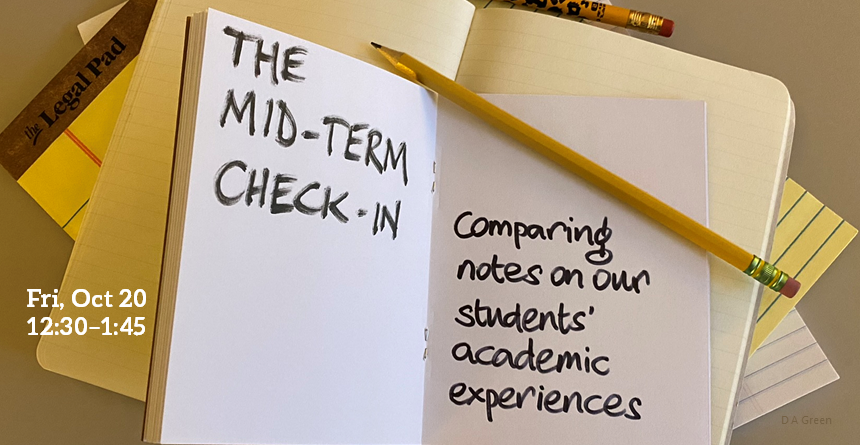
-
23FQ The Mid-term Check-in - details
-
Mid-term check-in session
The Mid-Term Check-in: Comparing notes on our students' academic experiences
Fri, Oct 20 | 12:30–1:45 | Via Zoom | Bring your lunch! | Zoom link provided upon registration
Co-sponsored by Learning Assistance Programs and the Center for Faculty Development
Co-Facilitated by David Green (Center for Faculty Development) and Angelique Jenkins (Learning Assistance Programs)
Join us for this inaugural gathering of faculty and student-facing staff focused on academic success.
What is happening in our classrooms and office hours this term? What are some of our key partners in supporting academics – such as Learning Assistance, Writing Center, and Disability Services – noticing in their own interactions with our students?
This metaphorical “half-time huddle” provides us an opportunity to share observations, experiences, and ideas that will help us all better understand shifts and patterns among our students.
Our goal here is to work in partnership to be better placed to support students’ academic success and to connect them with the right resources in a timely manner. It may also help faculty refine future courses in response to emergent issues, as well as shaping offices’ and centers’ future programming for both students and faculty.
As this format is experimental, we’d especially appreciate your post-session feedback so we can adjust and adapt in future quarters.
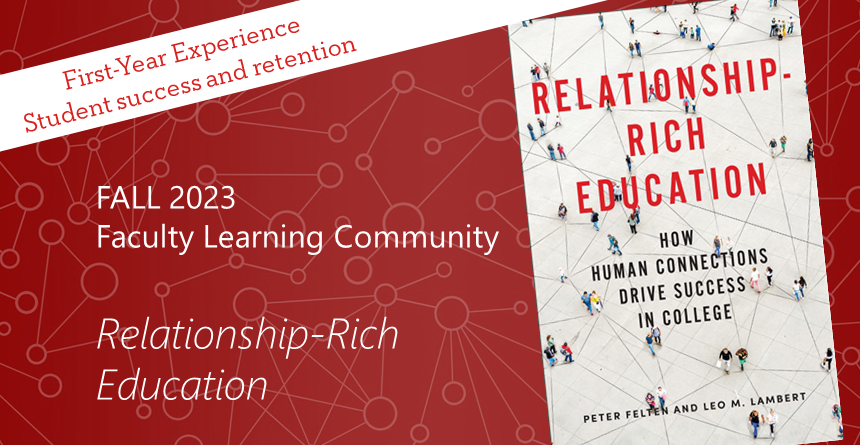
-
23FQ FLC Relationship-Rich Education - details
-
Faculty Learning Community
Relationship-rich education: How human connections drive success in college
Tuesdays: Oct 24, Nov 7, and Nov 28 | 11:00–12:15 | In person | Casey 515 | Coffee, tea, and snacks provided
Facilitated by Hilary Hawley (Director of First-Year Academic Engagement)
What can we do to boost our students’ sense of belonging and success in the classroom? What practical steps can make a difference? And how can we best support our growing number of students from first-gen and underrepresented backgrounds?
In Relationship-Rich Education, authors Peter Felten and Leo M. Lambert demonstrate that human relationships form the foundation of learning, belonging, and achieving in college, and they place special emphasis on the classroom: “the single most important site for students to experience welcome and care, to be inspired to learn, to build webs of relationships, and to ask questions of meaning and purpose” (p. 80).
The authors share stories from campuses large and small, in-person and virtual, to show how faculty have been able to make positive adjustments to their teaching to support both faculty-student and student-student relationships and mentoring.
Significantly, they note that while designing for welcome and inclusion is good for all students, relationship-rich education is especially beneficial for students on the margins of higher education, including first-generation students, BIPOC students, and LGBTQIA students.
In this three-session learning community for faculty, facilitated by Hilary Hawley (Director of First-Year Academic Engagement), you’ll read through the book with colleagues and explore questions both transformative and practical to your work as an educator.
Who is it suited to?
This community is open to all faculty looking to make concrete shifts in pedagogy and practice. Faculty
who regularly engage with first-year students are particularly encouraged to apply.15 places are available on a first-come, first-served basis.
Relationship-Rich Education is 160 pages long, and the reading will be split across the three sessions to be manageable for participants.
What are the dates?
This learning community meets in Casey 515 on:
- Tue, Oct 24 | 11:00-12:15
- Tue, Nov 7 | 11:00-12:15
- Tue, Nov 28 | 11:00-12:15
Tea, coffee, and snacks will be provided at all sessions.
- Register by 9:00 am on Wed, Oct 11
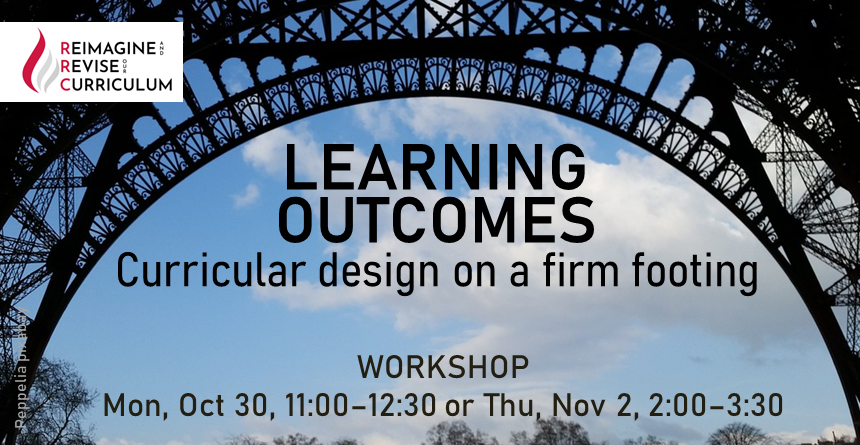
-
23FQ Learning Outcomes - details
-
Workshop
Learning outcomes: Curricular design on a firm footing
Mon, Oct 30 | 11:00–12:30 | Via Zoom | Zoom link provided upon registration
OR
Thu, Nov 2 | 2:00–3:30 | In person | Casey Commons (CASY 530) | Coffee and tea provided
Co-facilitated by David Green and Colette Hoption
As we reimagine the SU curriculum, it is essential that we set our courses and programs on a steady footing. To that end, this workshop focuses on learning outcomes because they are the foundation of curriculum design at both the course and program level.
At the course level, effective learning outcomes can help us stay on track, separate vital course material from the less essential, and give students cues about where to focus their energies.
At the program level, effective learning outcomes indicate what knowledge and skills we have chosen to prioritize and distinguish our programs from those at other institutions.
In this session, you will become familiar with common pitfalls of writing learning outcomes, as well as strategies to overcome them. You will also have dedicated time to making progress on the learning outcomes associated with your courses and programs,
If you’re working on revising a current course, feel free to bring a copy of the course syllabus with you.
» Register
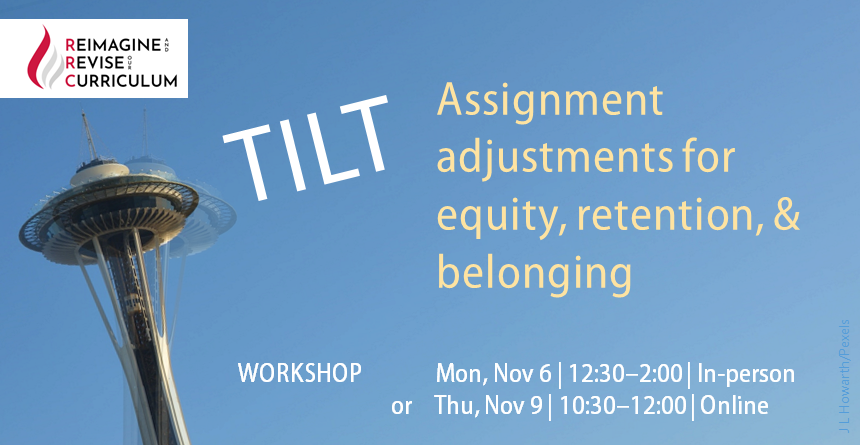
-
23FQ TILT - details
-
Workshop
TILT: Assignment adjustments for equity, retention, and belonging
Mon, Nov 6 | 12:30–2:00 | In person | Casey Commons (CASY 530) | Lunch provided
OR
Thu, Nov 9 | 10:30–12:00 | Via Zoom | Zoom link provided upon registrationCo-facilitated by Katherine Raichle and Jennifer Marrone (Management)
Transparent Design in Learning and Teaching (TILT) is a teaching approach involving a minor redesign of assignments that helps students better understand how and why they are learning course content.
TILT has been shown to benefit both students and faculty. For students, TILT boosts students’ sense of belonging, retention, and academic achievement, with additional gains in achievement for students from underrepresented backgrounds. For faculty, implementing TILT results in higher-quality student work, allowing faculty to feel greater satisfaction in their grading and teaching, as well as saved time.
Please remember to bring with you a copy of an upcoming assignment to apply the TILT approach to. You might want to focus on assignments where you’re disappointed with students’ performance, where you get a lot of push-back or questions from students, or where you find student motivation lacking.
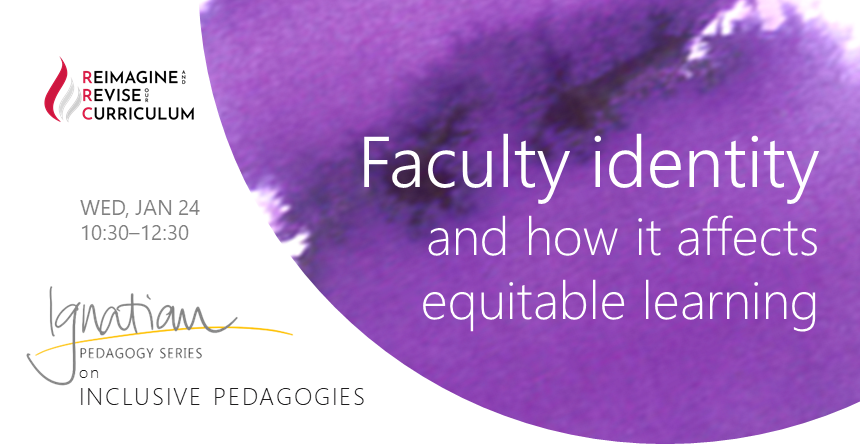
-
24WQ IPS-IP Faculty identity - details
-
Ignatian Pedagogy Series: Inclusive Pedagogies
Faculty identity – and how it affects equitable learning
Wed, Jan 24 | 10:30–12:30 | Via Zoom | Zoom link provided upon registration
Co-sponsored by the Center for Faculty Development, the Center for Jesuit Education, and the Office of Diversity & Inclusion
Over winter and spring, we are offering four individual sessions that combine to make the Ignatian Pedagogy Series on Inclusive Pedagogies.
To meet you where you are in your own learning, we invite you to participate in the sessions that are most relevant to you; you don’t need to register for all four sessions.
This session focuses on faculty identity as one of four key aspects of an inclusive pedagogical framework.
In this session, you’ll explore how your own social identities shape the classroom experience. Specifically, how do your identities influence:
- how you present yourself?
- how you see your students?
- how your students see you?
- how you teach?
At the conclusion of this session, you will be asked to complete a short, written reflection assignment.
As a participant in this module of the Ignatian Pedagogy Series, you will
- Explore what the higher education literature and Ignatian pedagogical principles teach us about inclusive pedagogies, with a clear focus on racial equity.
- Reflect on the interplay between the personal and the structural as they relate to racial justice.
The entire series is co-directed by Andrea Verdan of the Center for Faculty Development and Jen Tilghman-Havens of the Center for Jesuit Education. Joining them in this session is Colette Taylor, Special Assistant to the Provost for Strategic Directions.
If you have any questions about the Ignatian Pedagogy Series, please email faculty-development@seattleu.edu or Andrea Verdan (verdana@seattleu.edu) or Jen Tilghman-Havens (tilghman@seattleu.edu).
» Registration is now closed.
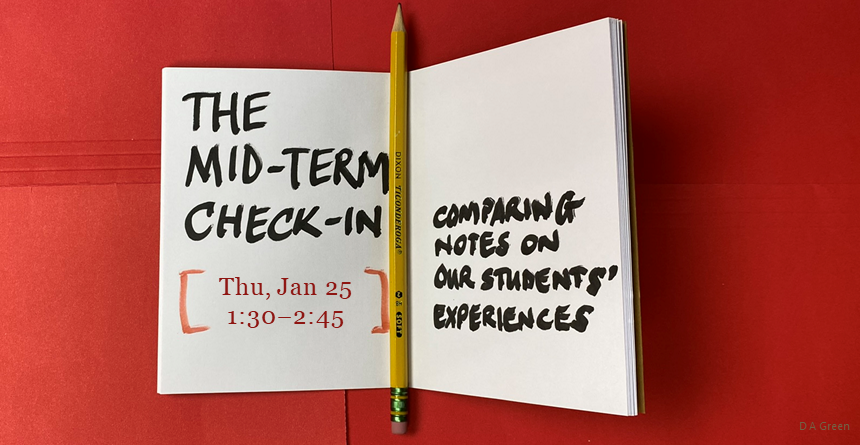
-
24WQ The Mid-Term Check-in - details
-
Mid-term check-in session
The Mid-Term Check-in: Comparing notes on our students' experiences
Thu, Jan 25 | 1:30–2:45 | Via Zoom | Zoom link provided upon registration
Co-sponsored by Learning Assistance Programs and the Center for Faculty Development
Co-Facilitated by Angelique Jenkins (Learning Assistance Programs) and David Green (Center for Faculty Development)
Join us for this second gathering of faculty and student-facing staff focused on academic success.
What is happening in our classrooms and office hours this term? What are some of our key partners in supporting students – Learning Assistance, MOSAIC Center, CAPS, Campus Ministry, and Wellness & Health Promotion – noticing in their own interactions with our students?
This metaphorical “half-time huddle” provides us an opportunity to share observations, experiences, and ideas that will help us all better understand shifts and patterns among our students.
Our goal here is to work in partnership to be better placed to support students’ academic success and to connect them with the right resources in a timely manner. It may also help faculty refine future courses in response to emergent issues, as well as shaping offices’ and centers’ future programming for both students and faculty.
As this format is experimental, we’d especially appreciate your post-session feedback so we can adjust and adapt in future quarters.
» Register
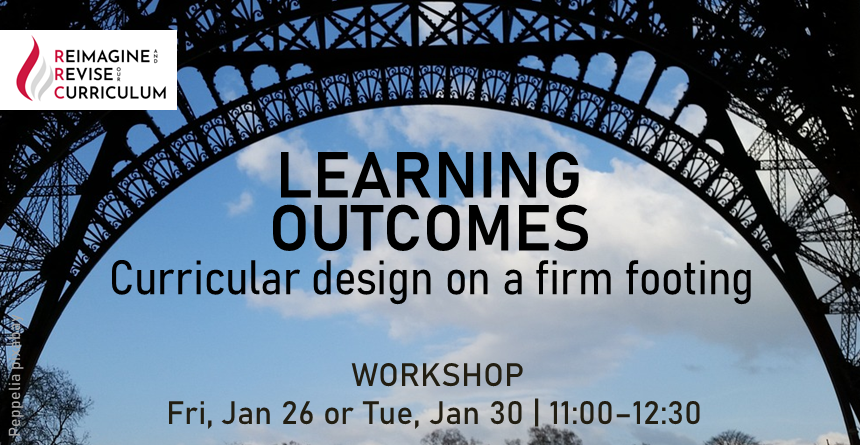
-
24WQ Learning outcomes - details
-
Workshop
Learning outcomes: Curricular design on a firm footing
Fri, Jan 26 | 11:00–12:30 | In person | Casey Commons (CASY 530) | Coffee, tea, and, snacks provided
OR
Tue, Jan 30 | 11:00–12:30 | Via Zoom | Zoom link provided upon registration
Co-facilitated by David Green and Colette Hoption
As we reimagine the SU curriculum, it is essential that we set our courses and programs on a steady footing. To that end, this workshop focuses on learning outcomes because they are the foundation of curriculum design at both the course and program level.
At the course level, effective learning outcomes can help us stay on track, separate vital course material from the less essential, and give students cues about where to focus their energies.
At the program level, effective learning outcomes indicate what knowledge and skills we have chosen to prioritize and distinguish our programs from those at other institutions.
In this session, you will become familiar with common pitfalls of writing learning outcomes, as well as strategies to overcome them. You will also have dedicated time to make progress on the learning outcomes associated with your courses and programs.
If you’re working on revising a current course, feel free to bring a copy of the course syllabus with you.
» Register
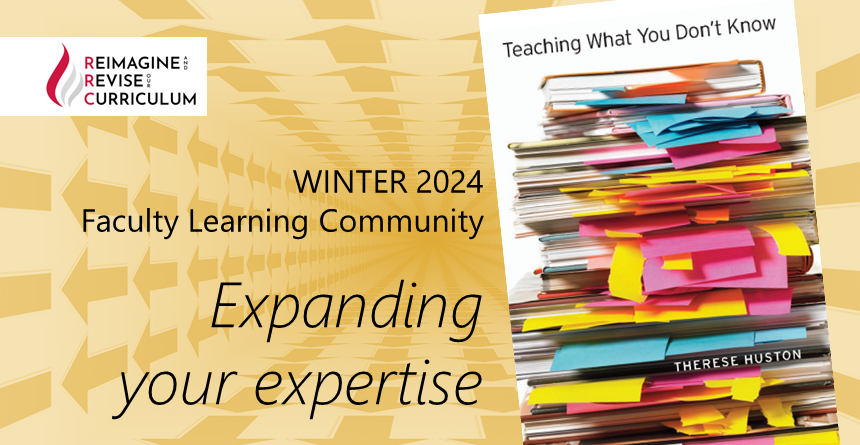
-
24WQ FLC Expanding your expertise - details
-
Faculty Learning Community
Expanding Your Expertise
Mondays: Jan 29, Feb 12, and Feb 26 | 12:301:45 | Via Zoom | Zoom link provided upon registration
Facilitated by Brenda Bourns (Biology)
As we Reimagine and Revise our Curriculum, many of us are realizing that we’re going to be teaching exciting new courses and topics. Sometimes, those topics dip into wells of prior knowledge that may need a little dusting off and brushing up from our days as grad students. But for many of us, these are going to be brand new areas – ones that ask us to expand and enrich our existing expertise to develop new areas of strength in our knowledge and teaching. So how do we get there?
In this learning community, facilitated by Dr Brenda Bourns (Biology), we’ll be guided by the work of Therese Huston, founding director of Seattle University's Center for Faculty Development, and her book Teaching What You Don’t Know. Through dozens of interviews with faculty across North America, Huston firstly establishes that teaching outside our expertise is the norm in higher education, not the exception. She then offers us creative strategies for dealing with typical issues related to teaching new subjects. How can you prepare most efficiently for a new course or a new area? How do you look credible? And what do you do when you don’t know how to answer a student’s question?
Encouraging us as faculty to think of ourselves as learners rather than experts, Huston points out that authority doesn’t come only, or even mostly, from perfect knowledge. She offers recommendations and examples for introducing new topics in a lively style, for gauging students’ understanding, for reaching unresponsive students, for planning your class so that you’re not overworked all the time, and – yes – for dealing with those impossible questions.
Over the course of three sessions, you’ll read through the book with colleagues and explore questions both transformative and practical to your work as both a learner and an educator in the process of expanding your expertise in your teaching.
Who is it suited to?
This community is open to all faculty who will be teaching new topics or new courses as part of the reimagined curriculum. No matter what level of students you teach – undergrad, grad, law – and whether in-person or remote, this series is suitable for you.
15 places are available, on a first-come, first-served basis.
Teaching What You Don’t Know is 263 enjoyable pages long, and the reading will be split across the three sessions to be manageable for participants. And if you choose to read the footnotes, you’ll find that the text even sparkles there, too.
» Register by 9:00 am on Fri, Jan 19th

-
24WQ FLC Teaching with AI tools - details
-
Faculty Learning Community
Teaching with AI tools
Tuesdays: Jan 30, Feb 13, and Feb 27 | 2:00–3:15 | Via Zoom | Zoom link to follow
Co-sponsored by the College of Science & Engineering
Facilitated by Onur Bakiner (Political Science)
For the past year, higher education around the world has been grappling with the implications of generative artificial intelligence (AI) on teaching and on students’ learning. In that time, new AI-powered educational tools have emerged and been promoted, leaving educators simultaneously excited and nervous. And as AI capabilities expand, we are presented with new opportunities – and at times new quandaries – to consider.
Knowing that our students already have access to generative AI, how do we work with AI tools for instruction and assignment design, and how do we help our students learn to do the same?
In this three-session learning community, participants and facilitator will be co-learners exploring the potential of working with AI tools in teaching and learning, as well as sharing their experiences to date – and potentially trying out some new ideas and reporting back.
In preparation for each of the three sessions, you’ll read or listen to some online materials so that the conversation can start from a shared understanding.
Who is is suited to?
This community is open to all faculty interested in exploring how they and their students can work WITH AI tools as part of the learning process at any educational level.
20 places are available, on a first-come, first-served basis.
» Register by 9:00 am on Thu, Jan 25th
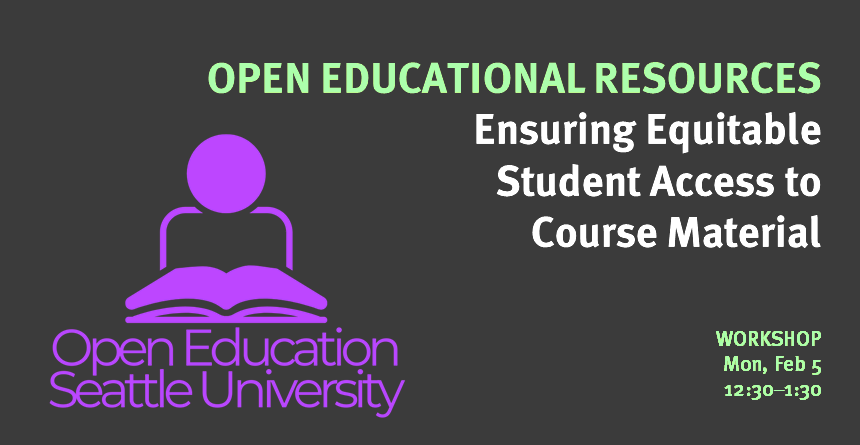
-
24WQ Open Educational Resources - details
-
In-Person Workshop
Open Educational Resources: Ensuring Equitable Student Access to Course Material
Mon, Feb 5 | 12:30–1:30 | In person | Oberto Commons (SINE 200) | Coffee and tea provided
Co-sponsored by the Open Education Task Force
Co-facilitated by Heather Brown (Biology), Kyle Brown (Library), Chris Granatino (Library)
As textbook costs rise, students are increasingly forced to choose between paying for necessities and paying for required course materials. Open educational resources — teaching and learning materials that can be freely accessed and adapted — are an alternative to these traditionally expensive materials and give you increased flexibility in your course design. Open resources offer an opportunity to lower costs and increase equity without compromising learning outcomes.
This workshop will review the challenges students face in affording course materials and discuss how open textbooks and other open educational resources can begin to address affordability challenges. You will also hear from faculty who have implemented open materials in their courses and learn about an opportunity to review an item in the Open Textbook Library (voluntary—stipend provided!).
What's in it for you?
During this workshop, you will:
- Learn about the benefits of open educational resources for your course(s)
- Learn about where to find open educational resources and how to incorporate them into your courses
- Connect with colleagues who are also interested in open educational resources
Who is it suited to?
The workshop is designed for individuals with any level of knowledge of open educational resources.
» Register
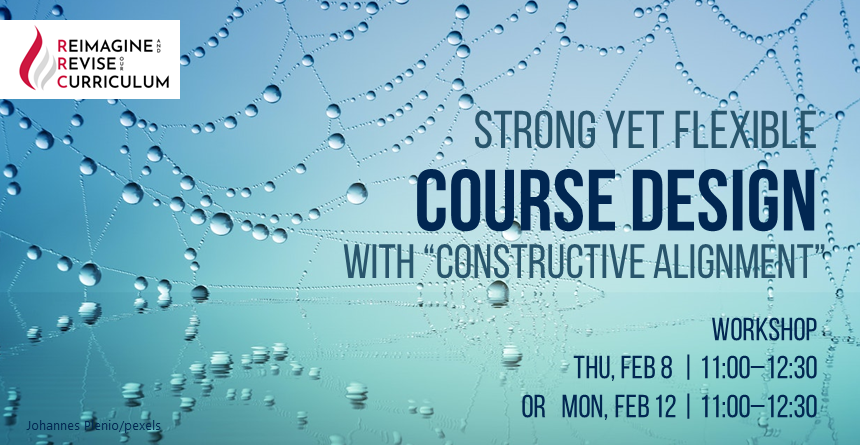
-
24WQ Course design with constructive alignment - details
-
Workshop
Strong yet flexible course design with "constructive alignment"
Thu, Feb 8 | 11:00–12:30 | Via Zoom | Zoom link provided upon registration
OR
Mon, Feb 12 | 11:00–12:30 | In person | Oberto Commons (SINE 200) | Coffee, tea, and snacks provided
Co-facilitated by David Green and Katherine Raichle
Designing (or redesigning) a course can be overwhelming, and we are often unsure where to begin. What content should I include in my course? What do I want my students to do with the content in the course, and beyond? How will I assess my students?
In this session, we’ll address these questions. You will learn how to create an overarching course structure informed by the “constructive alignment” model of course design from the higher education research. This model provides a road map for course design that clearly aligns the learning outcomes that you have identified for the course with relevant learning and teaching activities and graded assignments.
This type of course design will provide a clear and manageable structure for you and your students in the course, as well as promoting their best learning. You’ll finish the session having made concrete progress in designing and/or redesigning a course.
In this session, you will learn how to:
- identify suitable learning outcomes for your course.
- design activities that link with your learning outcomes.
- develop graded assignments that align with your learning outcomes.
- align all of the above under a coherent course design structure.
» Register
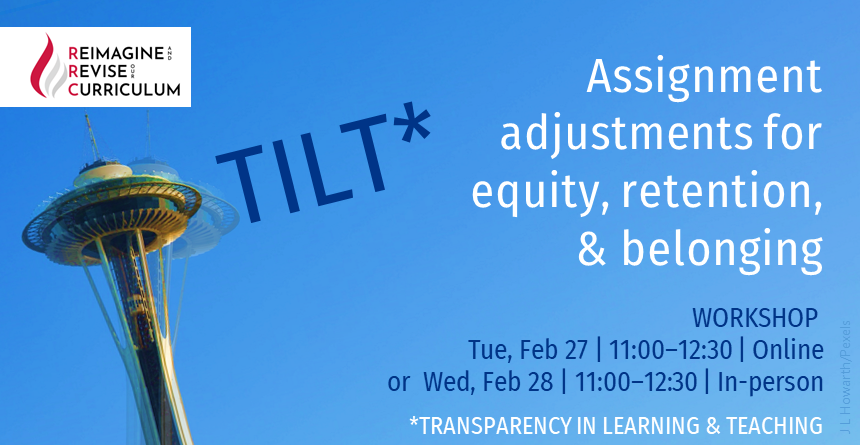
-
24WQ TILT - details
-
Workshop
TILT: Assignment adjustments for equity, retention, and belonging
Tue, Feb 27 | 11:00–12:30 | Via Zoom | Zoom link provided upon registration
OR
Wed, Feb 28 | 11:00–12:30 | In person | Casey Commons (CASY 530) | Coffee, tea, and snacks provided
Co-facilitated by Katherine Raichle and Jennifer Marrone (Management)
Transparent Design in Learning and Teaching (TILT) is a teaching approach involving a minor redesign of assignments that helps students better understand how and why they are learning course content.
TILT has been shown to benefit both students and faculty. For students, TILT boosts students’ sense of belonging, retention, and academic achievement, with additional gains in achievement for students from underrepresented backgrounds. For faculty, implementing TILT results in higher-quality student work, allowing faculty to feel greater satisfaction in their grading and teaching, as well as saved time.
Please remember to bring with you a copy of an upcoming assignment to apply the TILT approach to. You might want to focus on assignments where you’re disappointed with students’ performance, where you get a lot of push-back or questions from students, or where you find student motivation lacking.
» Register
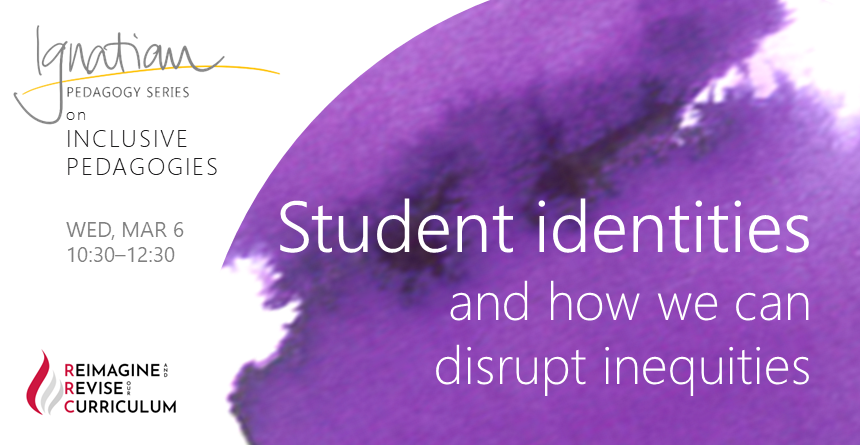
-
24WQ IPS-IP Student identities - details
-
Ignatian Pedagogy Series: Inclusive Pedagogies
Student identities – and how we can disrupt inequities
Wed, Mar 6 | 10:30–12:30 | Via Zoom | Zoom link provided upon registration
Co-sponsored by the Center for Faculty Development, the Center for Jesuit Education, and the Office of Diversity & Inclusion
Over winter and spring, we are offering four individual sessions that combine to make the Ignatian Pedagogy Series on Inclusive Pedagogies.
To meet you where you are in your own learning, we invite you to participate in the sessions that are most relevant to you; you don’t need to register for all four sessions.
This session focuses on student identities as one of four key aspects of an inclusive pedagogical framework.
In this session, you will explore these questions:
- How do the social identities of your students shape the classroom experience?
- How are your students impacted by structural inequities?
- How can you, as the teacher, disrupt structural inequities through your classroom policies and practices?
At the conclusion of this session, you will be asked to complete a short, written reflection assignment.
As a participant in this module of the Ignatian Pedagogy series, you will
- Explore what the higher education literature and Ignatian pedagogical principles teach us about inclusive pedagogies, with a clear focus on racial equity.
- Reflect on the interplay between the personal and the structural as they relate to racial justice.
The entire series is co-directed by Andrea Verdan of the Center for Faculty Development and Jen Tilghman-Havens of the Center for Jesuit Education. Joining them in this session is Paige Gardner, Assistant Professor of Student Development Administration in the College of Education.
If you have any questions about the Ignatian Pedagogy Series, please email faculty-development@seattleu.edu or Andrea Verdan (verdana@seattleu.edu) or Jen Tilghman-Havens (tilghman@seattleu.edu).
» Registration is now closed.
2022–23
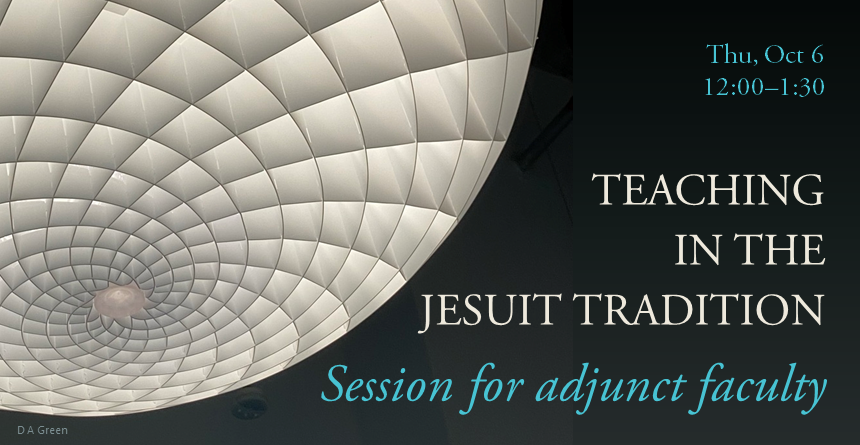
-
22FQ Teaching in the Jesuit Tradition - for Adjunct faculty - details
-
Workshop Series
Teaching in the Jesuit Tradition
Facilitated by Jenny Loertscher (Chemistry / Center for Jesuit Education) and rotating guest facilitators
Co-sponsored by the Center for Jesuit Education (CJE)
Teaching in the Jesuit Tradition (TJT) is a community-driven series aimed at building connections and exchanging ideas related to teaching and learning at a 21st century Jesuit university. All are welcome; faculty in their first few years at Seattle University are especially encouraged to attend.
There will be six sessions held over the 2022–23 academic year. You are welcome to attend as many sessions as you choose. Those who attend will be given access to the Canvas teaching repository and will be invited to contribute materials as well.
If you have any questions, would like to contribute teaching materials, or have ideas for topics for additional sessions, please contact Jenny Loertscher (loertscher@seattleu.edu).
Fall Quarter session #1
Teaching in the Jesuit Tradition as Adjunct and Part-time Faculty
Thu, Oct 6 | 12:00–1:30 | In person | Student Center 130 | Lunch and refreshments will be provided
Co-facilitated by Jenny Loertscher, Jeff Philpott (University Core / Communication), Stephanie Lewis (University Core), and Jen Tilghman-Havens (Center for Jesuit Education)
During this session we will explore what teaching and learning can look like at a contemporary Jesuit institution and how we can use aspects of the Jesuit educational tradition to enrich our teaching and students’ learning.
We hope that you will both receive pedagogical tools that you can use this quarter, as well as share effective teaching strategies with your colleagues.
This session is specially designed for colleagues who are teaching this academic year and have not attended the New Faculty Institute. All are welcome; VITAL faculty (visiting faculty, instructors, teaching assistants, adjuncts, and lecturers) are especially encouraged to attend.
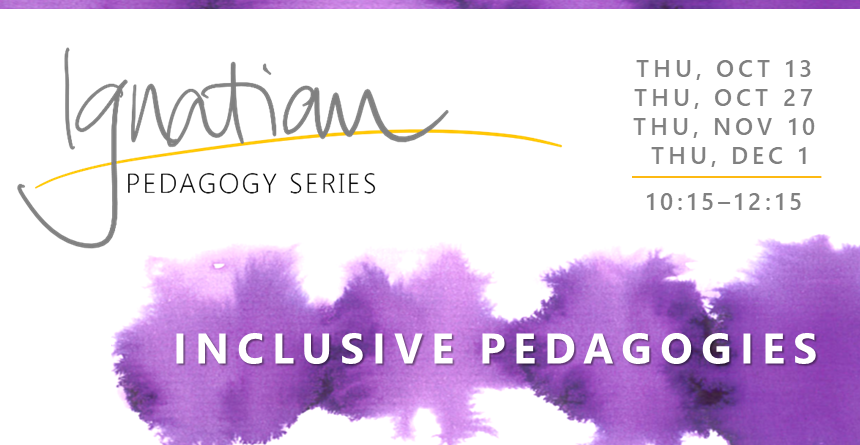
-
22FQ Ignatian Pedagogy Series III: Inclusive Pedagogies - details
-
Ignatian Pedagogy Series III: Inclusive Pedagogies
Co-sponsored by the Center for Jesuit Education (CJE) and the Office of Diversity and Inclusion (ODI)
As a participant in this module of the Ignatian Pedagogy Series, you will
- Explore what the higher education literature and Ignatian pedagogical principles teach us about inclusive pedagogies, with a clear focus on racial equity.
- Reflect on the interplay between the personal and the structural as they relate to racial justice.
- Consider how the social identities of both faculty and students shape classroom experiences.
- Examine your discipline’s sometimes surprising connections with racial in/justice.
- Examine inclusive pedagogies as a vehicle for transformative learning.
- Develop concrete plans to embed transparently inclusive pedagogies in future courses.
What are the dates?
It’s important that participants attend all four sessions in the series and complete short written reflection assignments between sessions.
- Thu, Oct 13 | 10:15–12:15 | In person | Casey Commons (CASY 530)
- Thu, Oct 27 | 10:15–12:15 | In person | Casey Commons (CASY 530)
- Thu, Nov 10 | 10:15–12:15 | In person | Chardin 142
- Thu, Dec 1 | 10:15–12:15 | In person | Casey Commons (CASY 530)
Coffee, tea, and snacks will be provided for each session, with support from the Endowed Mission Fund.
Up to twenty places are available, and participants will receive a $100 stipend from the Center for Jesuit Education on completion of the module and related reflection assignments.
Who is facilitating the module?
The entire series is co-directed by David Green of the Center for Faculty Development and Jen Tilghman-Havens of the Center for Jesuit Education. Joining them in this module are Andrea Verdan (Center for Faculty Development/Chemistry) and Katherine Raichle (Center for Faculty Development/Psychology).
How do I register?
Twenty spaces are available on a first-come, first-served basis. It’s essential that you can attend all four sessions of the series, so be sure to block off all four times on your calendar before you receive confirmation of your place. Register using the regular link for this quarter’s events from the Center for Faculty Development [link now closed] (also included below).
What if I have questions?
If you have any questions about the Ignatian Pedagogy Series, please email faculty-development@seattleu.edu or David Green (greend@seattleu.edu) or Jen Tilghman-Havens (tilghman@seattleu.edu).
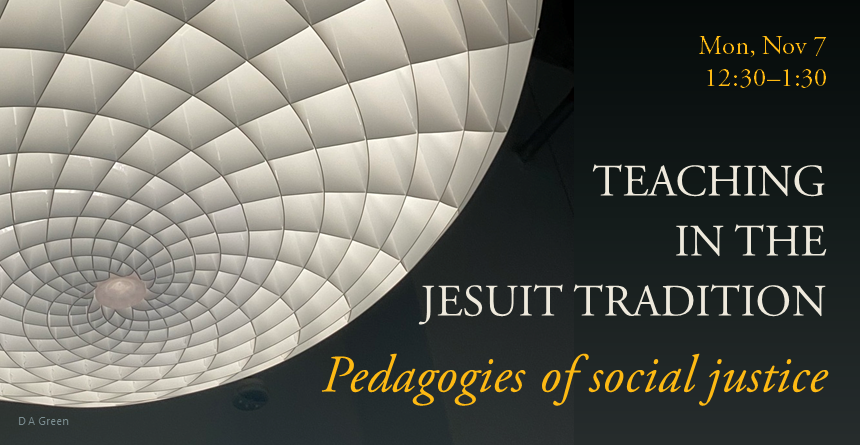
-
22FQ Teaching in the Jesuit Tradition - pedagogies of social justice - details
-
Workshop Series
Teaching in the Jesuit Tradition
Facilitated by Jenny Loertscher (Chemistry / Center for Jesuit Education) and rotating guest facilitators
Co-sponsored by the Center for Jesuit Education
Teaching in the Jesuit Tradition (TJT) is a community-driven series aimed at building connections and exchanging ideas related to teaching and learning at a 21st century Jesuit university. All are welcome; faculty in their first few years at Seattle University are especially encouraged to attend.
There will be six sessions held over the 2022–23 academic year. You are welcome to attend as many sessions as you choose. Those who attend will be given access to the Canvas teaching repository and will be invited to contribute materials as well.
If you have any questions, would like to contribute teaching materials, or have ideas for topics for additional sessions, please contact Jenny Loertscher (loertscher@seattleu.edu).
Fall Quarter session #2
Teaching in the Jesuit Tradition: Pedagogies of Social Justice
Mon, Nov 7 | 12:30–1:30 | In person | Casey Commons (CASY 530) | Lunch and refreshments will be provided
Co-facilitated by Jenny Loertscher and Kerry Soo Von Esch (College of Education)
Join us for an interactive session exploring what teaching for social justice might look like in your teaching and discipline. Engage in conversation with colleagues as we examine frameworks for social justice-centered teaching and discuss our own successes and challenges with creating more equitable and rich learning experiences for our students.
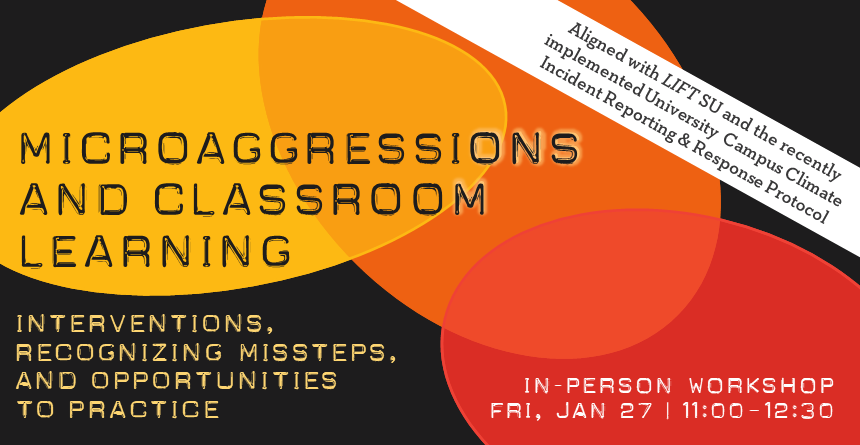
-
23WQ Microaggressions and classroom learning - details
-
In-person Workshop
Microaggressions and classroom learning: Interventions, recognizing missteps, and opportunities to practice
Fri, Jan 27 | 11:00–12:30 | In person | LeRoux Room (STCN 160) | Tea, coffee, and snacks provided
Co-sponsored by the Office of Diversity and Inclusion (ODI)
Co-facilitated by David Green, Andrea Verdan, Katherine Raichle, and Colette Taylor (College of Education)
No matter what subject we teach, our classrooms are spaces where (often unintentional) incendiary comments and actions can occur, including microaggressions related to people’s identities, such as race, gender, and sexual orientation (D W Sue, 2010).
Sometimes these comments come from students; sometimes from us as faculty. Either way, the research tells us that microaggressions in particular have a harmful effect on classroom environment and learning, and that faculty need to respond swiftly and with care to minimize harm and reestablish a healthier learning environment.
In response to both requests from faculty and recommendations from the Campus Climate Response Team, this workshop provides an opportunity for faculty to practice constructive interventions and corrections adjusting after missteps. It will 1) offer a framework for making decisions about the kinds of interventions or trust-repair we might consider when microaggressions occur, 2) allow participants to develop a personalized approach to these interventions based on our own identities, and 3) provide space for faculty to practice these strategies.
To accomplish the latter goal, we’re adapting a successful model piloted in the College of Arts & Sciences: as an experiment partway through the session, we’ll break into affinity groups of BIPOC faculty and white-identified faculty to practice in-the-moment responses. We’ll then regroup at the end to share and compare each groups’ thoughts and suggestions. This Jesuit-inspired approach allows us to bring our whole selves into our practice spaces, while also learning from each other across disciplines when we come back together.
Consistent with the principles of LIFT SU, this workshop is an invitation toward growth in service to our students’ learning and thriving. For participants who want to continue in this work, a follow-up session will provide further opportunity to deepen our practice and build our confidence in responding constructively to enhance our campus climate.
Optional follow-up session
Attendees who would like to check back in on this topic can do so in an hour-long discussion and debrief.
Fri, Feb 10 | 11:00–12:00 | In person | Casey Commons (CASY 530) | Tea, coffee, and snacks provided
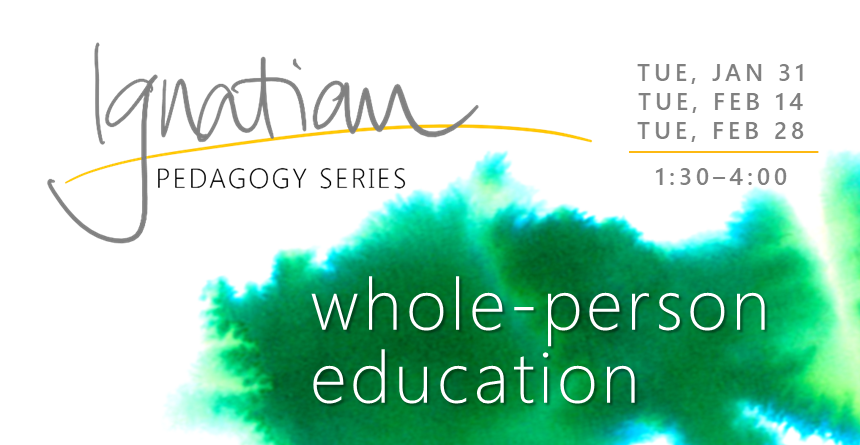
-
23WQ Ignatian Pedagogy Series: Whole Person Education - details
-
Ignatian Pedagogy Series
Whole Person Education: Strategies for Cultivating Competence, Compassion, and Connection
Co-sponsored by the Center for Jesuit Education (CJE) and Center for Faculty Development
What is the Ignatian Pedagogy Series?
In the Ignatian Pedagogy Series, participating faculty and staff will form themselves more deeply in the connections between present-day research into student learning in higher education and the 450 year-old Ignatian pedagogical tradition. Throughout the history of Jesuit education, learning has always been about more than rote learning. It has been about engaging the mind, heart, senses, and spirit holistically, inviting students to consider how they will use what they learn to transform the world. Through a series of workshops, coupled with short readings, follow-up activities, and short reflection assignments, you will learn how Ignatian pedagogy aligns with current research into student learning and how best to apply it in your role at Seattle University.
What will I learn in this series?
Both staff and faculty are educators of Seattle University students. As a participant in this module of the Ignatian Pedagogy Series, you will
- Develop common language that enables all community members to see themselves as educators who contribute to the university’s mission.
- Explore the “evaluation” element of Ignatian pedagogy and discover why it is integral to whole person education.
- Practice using tools designed to track and reflect on holistic growth in students’ and educators’ attitudes, priorities, and actions.
- Build community and connections with staff and faculty colleagues who are engaged in activities to support holistic student growth and development; share resources and ideas with colleagues.
What will I gain in this series?
- An in-depth, inter-disciplinary, cross-campus conversation about supporting students in our current context.
- Resources to apply directly to your work.
- Access to a database of educational resources.
- Refreshments at each meeting.
Who should apply for this series?
- All staff and faculty are invited to apply; colleagues who are engaged in activities to support holistic student growth and development are particularly encouraged to apply.
- This series could benefit staff and faculty at all levels and at any point in their careers.
- Participating colleagues should be interested in putting principles from the series into practice in their work at the university.
What is the commitment?
It is important that participants attend all three sessions in the series and complete three short assignments. We expect a total time commitment of approximately 10 hours over the course of the quarter. Sessions will be held at the following times on campus. For all sessions, the last 25 minutes is optional community-building time, with refreshments provided.
- Tue, Jan 31 | 1:30–4:00 | In person | Student Center 130
- Tue, Feb 14 | 1:30–4:00 | In person | Oberto Commons (SINE 200)
- Tue, Feb 28 | 1:30–4:00 | In person | Oberto Commons (SINE 200)
Who is facilitating the module?
The series is co-facilitated by Carol Lwali (Director of Career Engagement), Audrey Hudgins (Associate Clinical Professor, Matteo Ricci Institute and affiliate faculty, International Studies), Mike Bayard, S.J. (Jesuit Assistant for Pastoral and Spiritual Outreach at the Center for Jesuit Education), and Jenny Loertscher (Professor of Chemistry and Faculty Associate at the Center for Jesuit Education).
How do I apply?
Apply for the series by completing this short set of questions [link closed] by January 17, 2023. It is essential that you can attend all three sessions of the series, so be sure to block off all three times on your calendar before you receive confirmation of your place. We hope to accommodate all applicants, however, if there are more applicants than we can accommodate, we will form a waiting list. We will notify all applicants of their participation by January 20, 2023.
What if I have questions?
If you have any questions about this module of the Ignatian Pedagogy Series, please email Jenny Loertscher at loertscher@seattleu.edu. If you have questions about the status of your registration, you may email faculty-development@seattleu.edu.
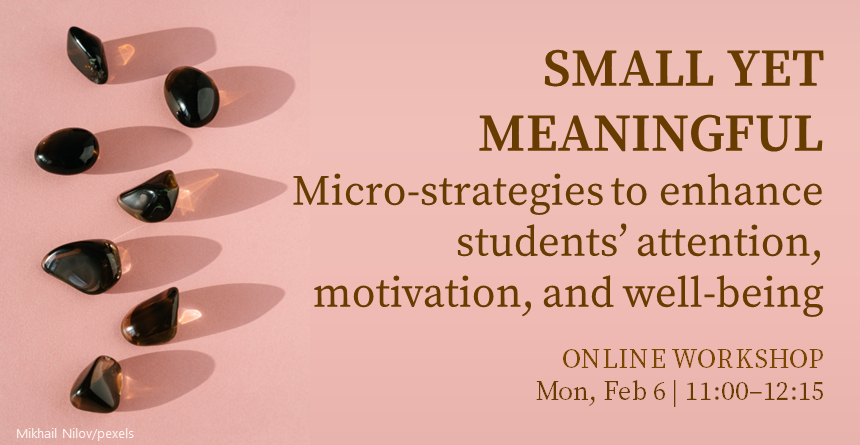
-
23WQ Micro-strategies to enhance student well-being - details
-
Online Workshop
Small yet meaningful: Micro-strategies to enhance students' attention, motivation, and well-being
Mon, Feb 6 | 11:00–12:15 | Via Zoom | Zoom link provided upon registration
Facilitated by Rachel Turow (Psychology)
Co-sponsored by the Psychology Department
Faculty members around the country are expressing concerns about their students’ well-being as they adjust to learning in a higher education context that has been irrevocably altered by the pandemic. Here at SU, too, faculty are asking how they might be able to promote their students’ attention, engagement, and well-being in their classes, without playing the inappropriate role of amateur counselor or therapist.
Encouragingly, studies indicate that micro-strategies – lasting only a minute or two, and not requiring any special training or background – can yield powerful returns for our students. In this workshop, Dr. Rachel Turow (Psychology) will introduce participants to eight such strategies that can promote students’ attention, engagement, and well-being and can be incorporated into any class.
Why might it be wise for us, as faculty, to introduce micro-strategies?
- Most students can benefit from increasing mental awareness and control – not only students who exhibit problems – and there are other students who are struggling internally but who appear fine externally.
- Evidence indicates that students build mental health skills best by practicing new techniques, rather than only being taught them.
- Mental regulation techniques are important for learning, so the classroom setting presents an ideal context in which to practice.
- Regulating attention and mood are lifelong tasks, and cultivating those capacities aligns with the Jesuit model of whole-person education.
During this online workshop, Dr. Turow will share the evidence supporting each micro-strategy and invite participants to try out the technique for one or two minutes on their own. She will also encourage faculty to share other micro-techniques that they are already using to boost students’ focus and well-being.
About the facilitator
Dr. Rachel Turow is an adjunct professor in the Psychology Department at Seattle University. She teaches three “science and practice” classes, in which students explore research regarding practices to promote well-being and simultaneously implement the strategies in their own lives. She is the author of The Self-Talk Workout: Six Science-Backed Strategies to Dissolve Self-Criticism and Transform the Voice in Your Head (Shambhala).
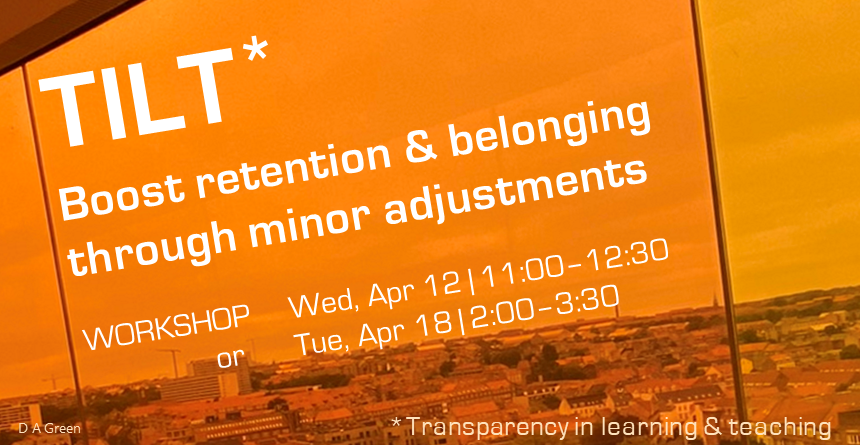
-
23SQ TILT - details
-
Workshop
TILT: Boost retention and belonging through minor adjustments
Wed, Apr 12 | 11:00–12:30 | In person | Hunthausen 110 | Tea, coffee, and snacks provided
OR
Tue, Apr 18 | 2:00–3:30 | In person | Hunthausen 110 | Tea and coffee provided
Co-facilitated by David Green and Andrea Verdan
Transparent Design in Learning and Teaching (TILT) is a teaching approach involving a minor redesign of assignments that helps students better understand how and why they are learning course content.
TILT has been shown to benefit both students and faculty. For students, TILT boosts students’ sense of belonging, retention, and academic achievement, with additional gains in achievement for students from underrepresented backgrounds. For faculty, implementing TILT results in higher-quality student work, allowing faculty to feel greater satisfaction in their grading and teaching, as well as saved time.
This quarter, we are prioritizing introductory courses in any degree program. This is because the TILT research has found that students continue to benefit for at least two years from their first experience of TILT. And even if you’re not teaching an intro course, you’re very welcome to join us!
Please remember to bring with you a copy of an upcoming assignment to apply the TILT approach to. You might want to focus on assignments where you’re disappointed with students’ performance, where you get a lot of push-back or questions from students, or where you find student motivation lacking.
» Register
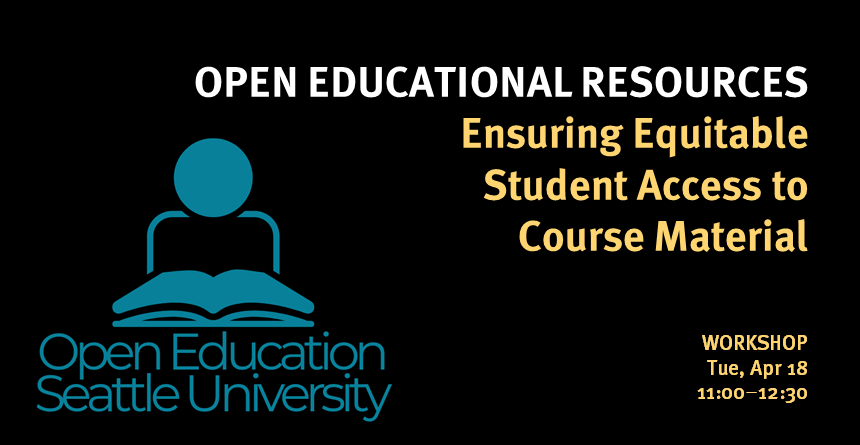
-
23SQ Open Educational Resources - details
-
In-Person Workshop
Open Educational Resources: Ensuring Equitable Student Access to Course Material
Tue, Apr 18 | 11:00–12:30 | In person | Hunthausen 110 | Tea and coffee provided
Co-sponsored by the Open Education Task Force
Co-facilitated by Lydia Bello (Library), Kathryn Bollich-Ziegler (Psychology), and Heather Brown (Biology)
As textbook costs rise, students are increasingly forced to choose between paying for necessities and paying for required course materials. Open educational resources — teaching and learning materials that can be freely accessed and adapted — are an alternative to these traditionally expensive materials and give you increased flexibility in your course design. Open resources offer an opportunity to lower costs and increase equity without compromising learning outcomes.
This workshop will review the challenges students face in affording course materials and discuss how open textbooks and other open educational resources can begin to address affordability challenges. You will also hear from faculty who have implemented open materials in their courses and learn about an opportunity to review an item in the Open Textbook Library (voluntary—stipend provided!).
What's in it for you?
During this workshop, you will:
- Learn about the benefits of open educational resources for your course(s)
- Learn about where to find open educational resources and how to incorporate them into your courses
- Connect with colleagues who are also interested in open educational resources
Who is it suited to?
The workshop is designed for individuals with any level of knowledge of open educational resources.
» Register
2021–22
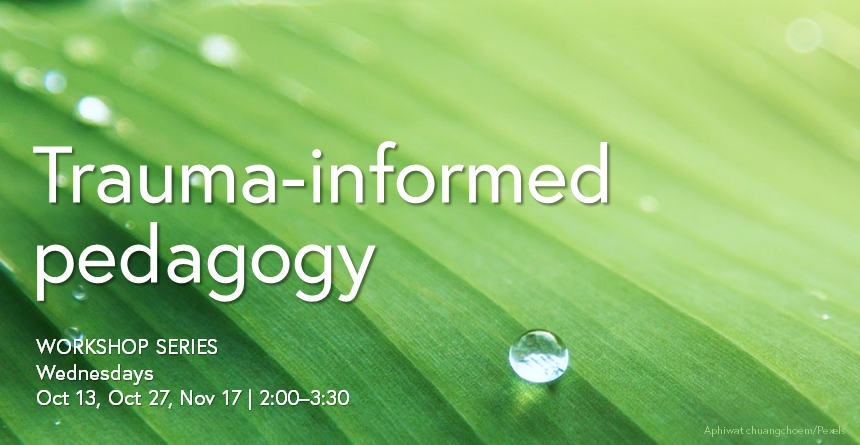
-
21FQ Trauma-informed pedagogy - details
-
Workshop series
Trauma-Informed Pedagogy
Wednesdays: Oct 13, Oct 27, and Nov 17 | 2:00–3:30 | Zoom link provided upon registration
Facilitated by Katherine Raichle, Holly Slay Ferraro, and David Green
Before the pandemic, many students were already experiencing a range of emotions from chronic stress to trauma – a situation that often went unnoticed. In contrast, these past 18 months have highlighted for all of us the critical interface of learning and mental wellness, urgently calling on us to change our pedagogical practices.
Trauma-Informed Pedagogy is one such approach. Connecting existing, but previously discrete, research-based practices that are known to enhance learning for all students, Trauma-Informed Pedagogy offers holistic benefits that are timeless, born from the knowledge that trauma is ubiquitous in our classes.
This workshop series is for any faculty who would like to make subtle yet substantive changes to their pedagogical practices that will enhance trust, community, engagement, and learning for all students. All levels of teaching experience are welcomed.
In this three-part series, we will:
- Examine how we have tended to interpret student behaviors, broadening the scope of our understanding of, and empathy for, our students.
- Identify the ways that trauma can manifest in compromised learning for our students.
- Apply the principles of Trauma-Informed Pedagogy to our current and/or future classes.
- Put into practice, reflect on, and discuss trauma-informed practices.
- Explore the benefits of Trauma-Informed Pedagogy for our students, but also for ourselves.
» Register
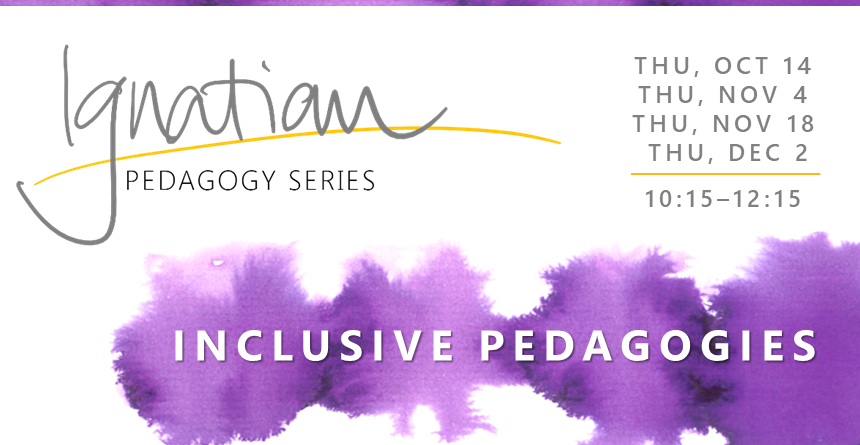
-
21FQ Ignatian Pedagogy Series III: Inclusive Pedagogies - details
-
Ignatian Pedagogy Series III: Inclusive Pedagogies
Co-sponsored by the Center for Jesuit Education (CJE) and the Office of Diversity and Inclusion (ODI)
As a participant in this module of the Ignatian Pedagogy Series, you will
- Explore what the higher education literature and Ignatian pedagogical principles teach us about inclusive pedagogies, with a clear focus on racial equity.
- Reflect on the interplay between the personal and the structural as they relate to racial justice.
- Consider how the social identities of both faculty and students shape classroom experiences.
- Examine your disciplines’ sometimes surprising connections with racial in/justice.
- Examine inclusive pedagogies as a vehicle for transformative learning.
- Develop concrete plans to embed transparently inclusive pedagogies in future courses.
What are the dates?
It's important that participants attend all four sessions in the series and complete short written reflection assignments between sessions.
- Thu, Oct 14 | 10:15–12:15
- Thu, Nov 4 | 10:15–12:15
- Thu, Nov 18 | 10:15–12:15
- Thu, Dec 2 | 10:15–12:15
- Zoom link provided upon registration
Up to fifteen places are available, and participants will receive a $100 stipend from the Center for Jesuit Education upon completion of the module and related reflection assignments.
Who is facilitating the module?
The entire series is co-directed by David Green of the Center for Faculty Development and Jen Tilghman-Havens of the Center for Jesuit Education. Joining them in this module are Holly Slay Ferraro (Center for Faculty Development/Management) and Katherine Raichle (Center for Faculty Development/Psychology).
How do I register?
Fifteen spaces are available on a first-come, first-served basis. It's essential that you can attend all four sessions of the series, so be sure to block off all four times on your calendar before you receive confirmation of your place. Register using the regular link for this quarter's events from the Center for Faculty Development (also included below).
What if I have questions?
If you have any questions about the Ignatian Pedagogy Series, please email faculty-development@seattleu.edu, David Green (greend@seattleu.edu), or Jen Tilghman-Havens (tilghman@seattleu.edu).
» Register
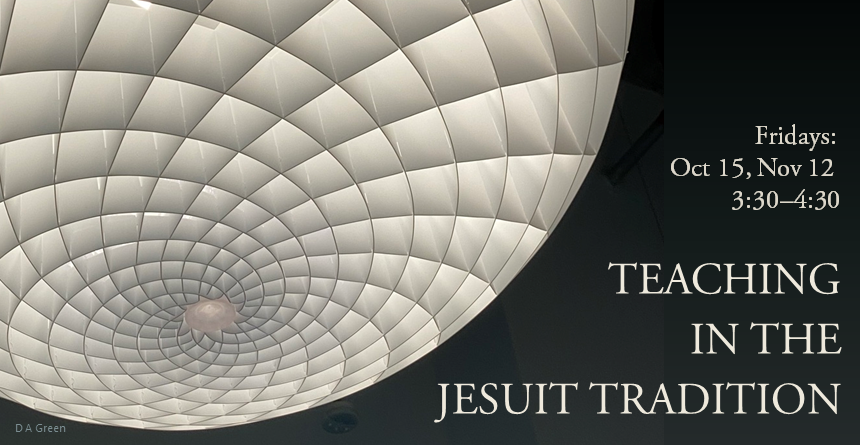
-
21FQ Teaching in the Jesuit Tradition - details
-
Workshop Series
Teaching in the Jesuit Tradition
Facilitated by Jenny Loertscher and rotating guest facilitators
Co-sponsored by the Center for Jesuit Education (CJE)
Teaching in the Jesuit Tradition (TJT) is a community-driven series aimed at building connections and exchanging ideas related to teaching and learning at a 21st century Jesuit university. All are welcome; faculty in their first few years at Seattle University are especially encouraged to attend.
There will be six hour-long Zoom sessions held over the 2021–22 academic year. You are welcome to attend as many sessions as you choose. Those who attend will be given access to the Canvas teaching repository and will be invited to contribute materials as well.
If you have any questions, would like to contribute teaching materials, or have ideas for topics for winter or spring quarter sessions, please contact Jenny Loertscher (loertscher@seattleu.edu).
Fall Quarter sessions
Teaching in the Jesuit Tradition: Let's get started! Ready-to-use resources for teaching and learning in the Jesuit tradition
Fri, Oct 15 | 3:30–4:30 | Zoom link provided upon registration
Co-facilitated by Jenny Loertscher and Jen Tilghman-Havens (Center for Jesuit Education)
Are you new to teaching at Seattle University? Are you a seasoned faculty member looking for fresh ways to infuse contemporary Jesuit education in your teaching? Join us for us for our first session of Teaching in the Jesuit Tradition in this new academic year.
During this session we will explore a community-generated Canvas repository of teaching resources based on the principles of Ignatian pedagogy. Participants will be encouraged to identify teaching strategies for use in ongoing and upcoming courses and will be invited to contribute new materials to the repository.
» Register
Teaching in the Jesuit Tradition: Pedagogies for Social Justice
Fri, Nov 12 | 3:30–4:30 | Zoom link provided upon registration
Co-facilitated by Jenny Loertscher and Kerry Soo Von Esch (College of Education)
Join us for an interactive session exploring what teaching for social justice might look like in your teaching and discipline. Engage in conversation with colleagues as we examine frameworks for social justice-centered teaching, and discuss our own successes and challenges with creating more equitable and rich learning experiences for our students. Bring a syllabus, course activity, or assignment to work on and receive feedback as part of this session.
» Register
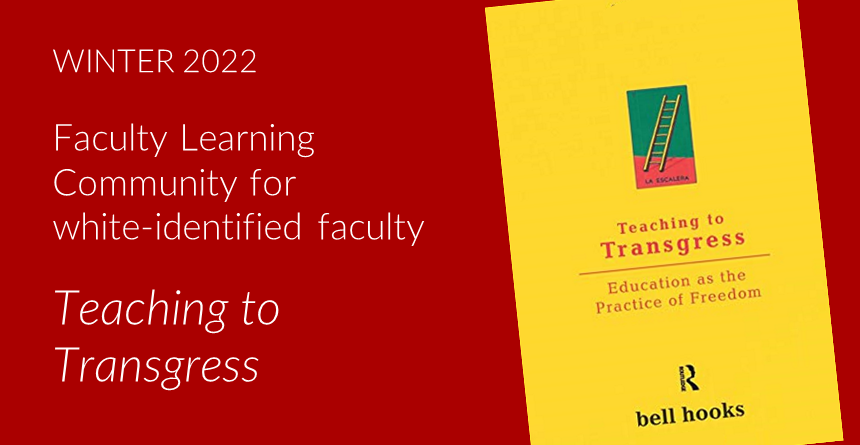
-
22WQ FLC Teaching to Transgress - details
-
Faculty Learning Community
Teaching to Transgress
Mondays: Jan 24, Feb 7, and Feb 28 | 12:30–1:45 | Zoom link provided upon registration
Facilitated by Roxy Hornbeck (Performing Arts & Arts Leadership)
Co-sponsored by the Office of Diversity and Inclusion
Almost 20 years since its publication, Teaching to Transgress remains essential reading for educators seeking to reground their own practice in social and racial justice. In her book, hooks calls on educators to "transgress" against current educational practices that sustain racial, gender, and class inequities. Rather, she challenges us to reimagine a more liberatory practice of teaching, inviting us into a conversation about how to institute deep systemic change in our pedagogy, and reshaping our practices beyond the superficial. In her own words, "To educate as the practice of freedom is a way of teaching that anyone can learn." In this learning community, we will focus on the unique work that white faculty members need to do in their roles as leaders and teachers to promote more just and equitable spaces.
The author of Teaching to Transgress, Black feminist intellectual, professor, and activist, bell hooks, passed away on December 15, 2021 at the age of 69. This learning community honors her legacy and reminds us that the voices of Black Women who came before can be carried on in the work we do today.
In this three-session learning community for white-identified faculty, facilitated by Roxy Hornbeck (assistant professor of Arts Leadership), you'll read through the book with colleagues and explore how hooks's ideas and challenges can reshape your own work as an educator.
Who is it suited to?
This community is for any white-identified faculty member who wants to move beyond self-awareness around racial identity to make concrete shifts in pedagogy and practice.
Fifteen spaces are available on a first-come, first-served basis.
Teaching to Transgress is 200 pages long and the reading will be split across the three sessions to be manageable for participants. It is available to SU faculty electronically via Lemieux Library. Alternatively, the Center is pleased to be able to offer hard copies of the book, to be delivered to a location of your choice.
What are the dates?
The three dates in Winter Quarter are:
- Mon, Jan 24 | 12:30–1:45
- Mon, Feb 7 | 12:30–1:45
- Mon, Feb 28 | 12:30–1:45
» Register
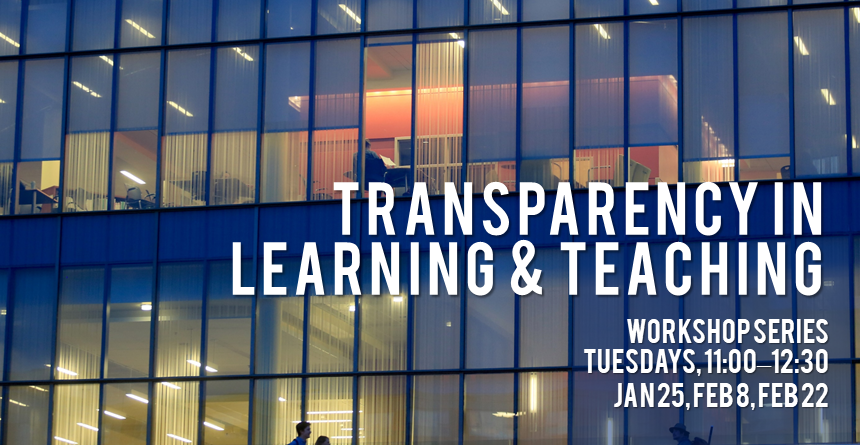
-
22WQ TILT series - details
-
Workshop series
Transparency in Learning and Teaching (TILT)
Tuesdays: Jan 25, Feb 8, and Feb 22 | 11:00–12:30 | Zoom link provided upon registration
Facilitated by Katherine Raichle and David Green
Co-sponsored by the Office of Diversity and Inclusion
We know from decades of research that access to learning in higher education is inequitable for marginalized students. These inequities have been heightened during the pandemic, deepening an unjust pattern of underrepresentation and underachievement in higher education for many groups of students. Faculty are often left feeling that addressing such discrepancies is beyond their control or bandwidth. Yet there are simple and immediate ways to create more equitable access to learning in your classes.
In this three-part series we will explore a simple and high-impact transformational approach to teaching – the Transparent Design in Learning and Teaching initiative in higher education (TILT). Put simply, TILT is an approach to teaching that helps students better understand how and why they are learning course content. Even tiny adjustments to teaching practices informed by TILT have been shown to bridge inequitable access to learning, enhancing learning for ALL students, while importantly benefiting underrepresented students in particular. Moreover, research has shown a lasting impact of TILT on students’ confidence, metacognitive self-awareness, sense of belonging, and persistence. Faculty, too, have experienced their own benefits, including higher-quality student work, thus feeling greater satisfaction in their grading and teaching.
This is a hands-on and practice-oriented series with advance readings to complete. We will learn about TILT and apply its principles to the design of assignments, grading criteria, and teaching practices in our classes.
What's in it for you?
Over the three sessions, you'll learn how to:
- Make small and immediate changes to your classes that enhance the learning outcomes for all your students – especially those from underrepresented groups
- Apply the principles of Transparency in Learning and Teaching to the teaching practices in your classes
- Design assignments that align with Transparency in Learning and Teaching practices
Who is it suited to?
This community is for any faculty member who is seeking to enhance their students’ learning and make their learning practices more equitably accessible to all students.
» Registration is now closed.
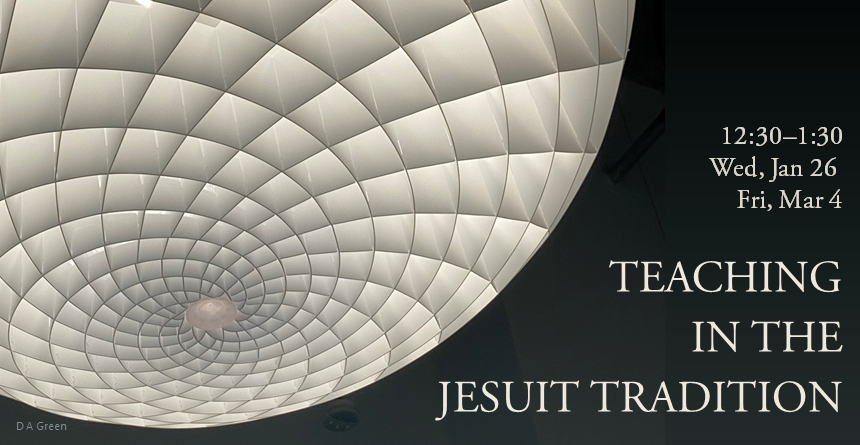
-
22WQ Teaching in the Jesuit Tradition - details
-
Workshop Series
Teaching in the Jesuit Tradition
Facilitated by Jenny Loertscher (Chemistry) and rotating guest facilitators
Co-sponsored by the Center for Jesuit Education
Teaching in the Jesuit Tradition (TJT) is a community-driven series aimed at building connections and exchanging ideas related to teaching and learning at a 21st century Jesuit university. All are welcome; faculty in their first few years at Seattle University are especially encouraged to attend.
There will be six hour-long Zoom sessions held over the 2021–22 academic year. You are welcome to attend as many sessions as you choose. Those who attend will be given access to the Canvas teaching repository and will be invited to contribute materials as well.
If you have any questions, would like to contribute teaching materials, or have ideas for topics for the spring quarter sessions, please contact Jenny Loertscher (loertscher@seattleu.edu).
Winter Quarter sessions
Pedagogies for Social Justice: Structuring Learning Experiences
Wed, Jan 26 | 12:30–1:30 | Zoom link provided upon registration
Co-facilitated by Jenny Loertscher and Kerry Soo Von Esch (College of Education)
Join colleagues in developing ways to structure learning experiences to promote social justice in the classroom and beyond.
» Register
Using Reflective Practices to Deepen Teaching and Learning
Fri, Mar 4 | 12:30–1:30 | Zoom link provided upon registration
Co-facilitated by Jenny Loertscher and Andrea Fontana (Center for Jesuit Education)
Join colleagues in learning how reflective practices can be used by faculty and students to help deepen their experience of teaching and learning. As part of this session, we will participate in a guided reflective exercise, a thoughtful review of the quarter, followed by discussion of how these reflective practices could lead to making different choices as an instructor and enhancing your students’ learning.
» Register
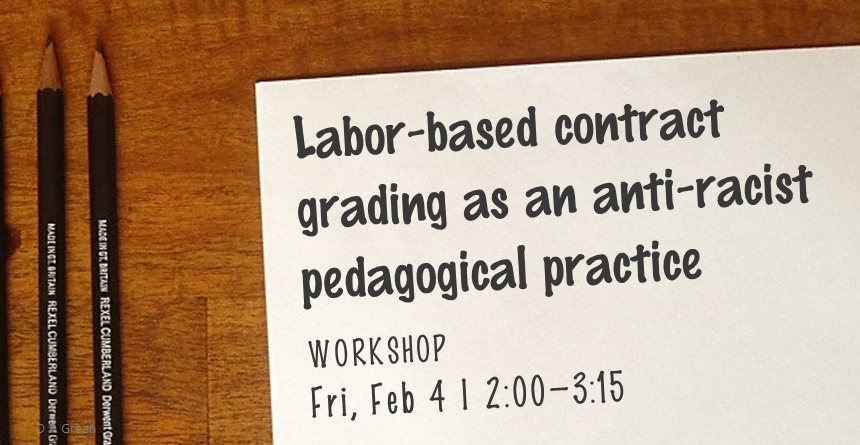
-
22WQ Labor-based contract grading - details
-
Workshop
Labor-based contract grading as an anti-racist pedagogical practice
Fri, Feb 4 | 2:00–3:15 | Zoom link provided upon registration
Co-sponsored by the Office of the Provost, the Office of Diversity and Inclusion, and the Office of Sponsored Projects
Facilitated by Tara Roth (English), Alex Smith (English), and Hannah Tracy (English)
Labor-based contract grading is an anti-racist writing assessment practice grounded in composition and critical race theories. Recent scholarship and current praxis in the field of Composition and Rhetoric demonstrate that labor-based contract grading encourages students to take risks and think critically about language and writing assessment as historically and socially contextualized rather than governed by a universal standard. Grading contracts benefit both faculty and students by creating more supportive relationships and removing barriers to student success.
What’s different for faculty?
Grading contracts are highly customizable, allowing faculty flexibility in design and implementation. Grades are based on the amount of labor a student performs in the course instead of the instructor’s perception of the “quality” of student writing. The instructor therefore takes on the role of coach, rather than judge, and models rhetorical listening as a way to disrupt traditional frameworks, racialized power dynamics, and classroom hierarchies. In the process, this model also returns compassion to our courses – a timely reframing in our current climate.
What’s different for students?
Students are encouraged to meet their own writing and critical thinking goals as they make revisions based on constructive instructor feedback. When given freedom to choose which suggestions to accept or reject, students learn to trust their own abilities as writers. Grading contracts also alleviate anxiety for students who struggle with writing, allowing them to relax during the writing process knowing they won’t be penalized for doing something “wrong.”
In this interactive and research-based workshop, we will share what we have learned in piloting labor-based contract grading in our classrooms, share samples, field questions, and help facilitate a conversation about strategies for incorporating this assessment strategy into your own courses.
» Registration is now closed.
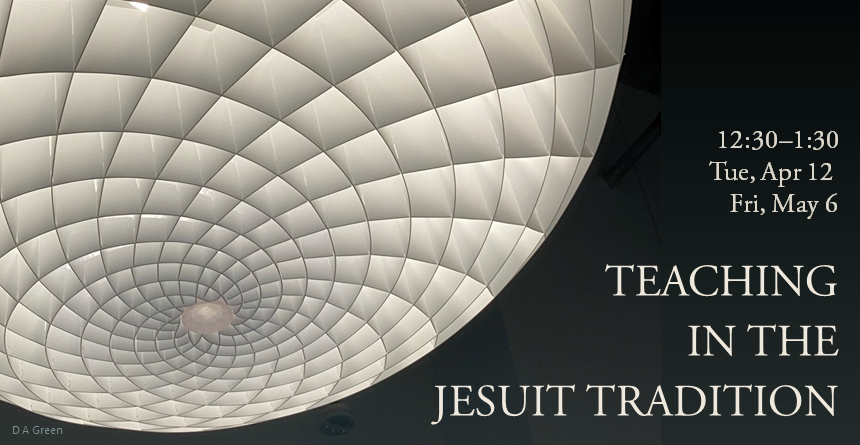
-
22SQ Teaching in the Jesuit Tradition - details
-
Workshop Series
Teaching in the Jesuit Tradition
Facilitated by Jenny Loertscher (Chemistry) and rotating guest facilitators
Co-sponsored by the Center for Jesuit Education (CJE)
Teaching in the Jesuit Tradition (TJT) is a community-driven series aimed at building connections and exchanging ideas related to teaching and learning at a 21st century Jesuit university. All are welcome; faculty in their first few years at Seattle University are especially encouraged to attend.
There will be six hour-long sessions held over the 2021–22 academic year. You are welcome to attend as many sessions as you choose. Those who attend will be given access to the Canvas teaching repository and will be invited to contribute materials as well.
If you have any questions, would like to contribute teaching materials, or have ideas for topics for additional sessions, please contact Jenny Loertscher (loertscher@seattleu.edu).
Spring Quarter sessions
Teaching in the Jesuit Tradition as Adjunct and Part-time Faculty
Tue, Apr 12 | 12:30–1:30 | Zoom link provided upon registration
Co-facilitated by Jenny Loertscher and Jeff Philpott (University Core / Communication)
During this session we will discuss the principles of Ignatian pedagogy and explore the practical teaching resources available to all community members on the Teaching in the Jesuit Tradition (TJT) Canvas site.
We hope that you will both receive pedagogical tools that you can use this quarter, as well as share effective teaching strategies with your colleagues.
All are welcome; VITAL faculty (visiting faculty, instructors, teaching assistants, adjuncts, and lecturers) are especially encouraged to attend.
» Registration is now closed
Celebration and Reflection on Two Years of Teaching in the Jesuit Tradition
Fri, May 6 | 12:30–1:30 | Casey Commons (CASY 530) | Lunch and refreshments provided
Co-facilitated by Jenny Loertscher and Jen Tilghman-Havens (Center for Jesuit Education)
Join us as we gather for our first in-person meeting of Teaching in the Jesuit Tradition (TJT) since this grassroots community started in Fall 2020.
TJT arose from a desire from faculty for greater interdisciplinary conversation around Ignatian Pedagogy. It creates a space for faculty and staff to share ideas and resources for putting Ignatian Pedagogy into action.
Join us for lunch and conversation as we share ideas, challenges, and hopes for supporting student learning using the tools of the Jesuit tradition.
» Registration is now closed.
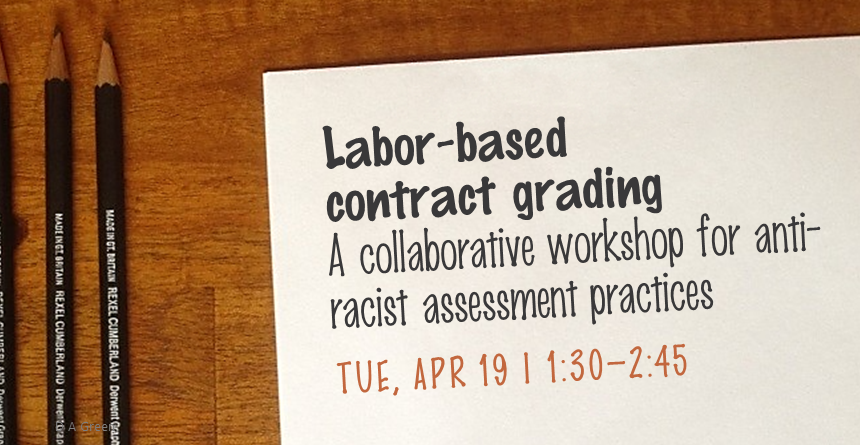
-
22SQ Labor-based contract grading - details
-
Afternoon Workshop
Labor-based contract grading
A collaborative workshop for anti-racist assessment practices
Tue, Apr 19 | 1:30–2:45 | Zoom link provided upon registration
Co-sponsored by the Office of Diversity and Inclusion (ODI)
Co-facilitated by Tara Roth (English), Alex Smith (English), and Hannah Tracy (English)
Labor-based contract grading is an anti-racist writing assessment practice grounded in composition and critical race theories. It encourages students to take risks and think critically about language and the assessment of writing: they come to understand writing assessment, in particular, as historically and socially contextualized rather than governed by a single, universal standard. Grading contracts benefit both faculty and students by creating more supportive relationships and removing barriers to student success, as has been shown in recent scholarship.
This workshop will offer collegial space for further critical engagement with the concept and the opportunity to workshop ideas for how you might adapt contract grading for your own classrooms. While it builds on our discussion in February, this session is open to all faculty interested in drafting grading contracts through structured, collaborative support.
How might attendees prepare?
We ask that you bring one of the following: a draft of your contract to workshop, materials to start putting together your contract, and/or questions regarding this assessment strategy. We will break off into groups based on preparation level. For a refresher on the background, research, and resources on this topic, please see the collaborative folder we have put together.
» Registration is now closed
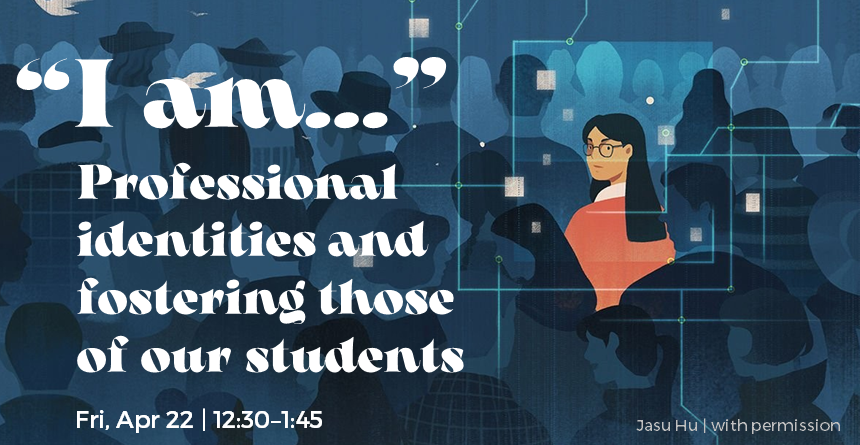
-
22SQ Professional Identities - details
-
Lunchtime Workshop
I am...: Professional identities and fostering those of our students
Fri, Apr 22 | 12:30–1:45 | Zoom link provided upon registration
Facilitated by Andrea Verdan (Chemistry)
The formation of professional identity—the relatively stable sense of one’s own self based on the attributes, beliefs, values, motives, and experiences within a professional context—has been recognized as a vital component of socialization into profession. This is particularly important for our students as they transition from higher education to their working lives.
In this workshop, attendees will first reflect on their own professional identities. Following a discussion of these identities, we will then explore practical ways to promote the professional identities of our students in the classroom; that is, what practices and learning activities can we develop that will allow our students to have a greater sense of belonging in their professional communities? We will also discover inclusive and equity-oriented practices for fostering our students’ transition to their future careers.
This workshop would support all faculty interested in fostering the development of professional identities of their students at any course level.
» Registration is now closed
[Illustration: Jasu Hu, with permission. http://www.jasuhuart.com/]
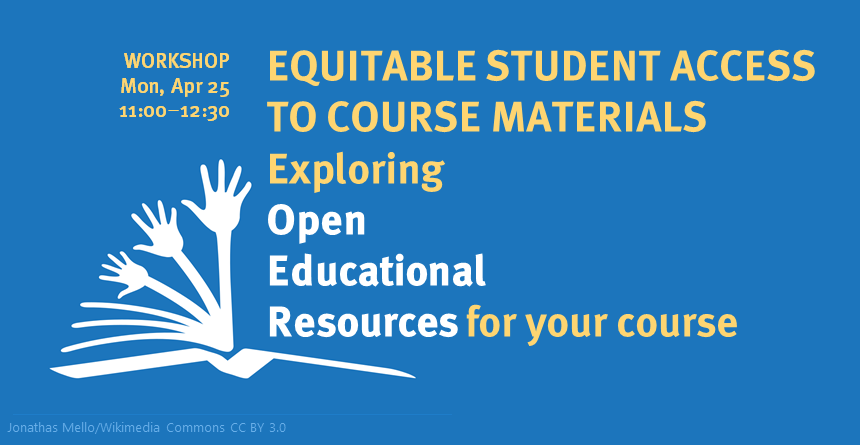
-
22SQ Exploring Open Educational Resources - details
-
Morning Workshop
Equitable student access to course materials: Exploring open educational resources for your course
Mon, Apr 25 | 11:00–12:30 | Zoom link provided upon registration
Co-sponsored by the Open Education Task Force
Co-facilitated by Lydia Bello (Library), Kathryn Bollich-Ziegler (Psychology), and Rochelle Lundy (Library)
As textbook costs rise, university students are increasingly forced to choose between paying for necessities and paying for required course materials. Open educational resources — teaching and learning materials that can be freely accessed and adapted — are an alternative to the traditional textbooks and commercially published course materials that impose significant costs on Seattle University students. Open resources offer an opportunity to lower costs and increase equity without compromising learning outcomes, making them a valuable tool in promoting student success.
This workshop will review the challenges students face in affording course materials, introduce open textbooks and other open educational resources, and discuss how these open materials can begin to address affordability challenges. You will also be invited to review an item in the Open Textbook Library. Completion of a textbook review following the workshop is voluntary and will be compensated with a stipend.
What's in it for you?
During this workshop, you will:
- Learn about the benefits of open educational resources for your course(s)
- Learn about what makes an open educational resource and where to begin looking for them
- Connect with colleagues who are also interested in open educational resources
Who is it suited to?
The workshop is designed for individuals with any level of knowledge of open educational resources, from newcomers to veterans.
» Registration is now closed
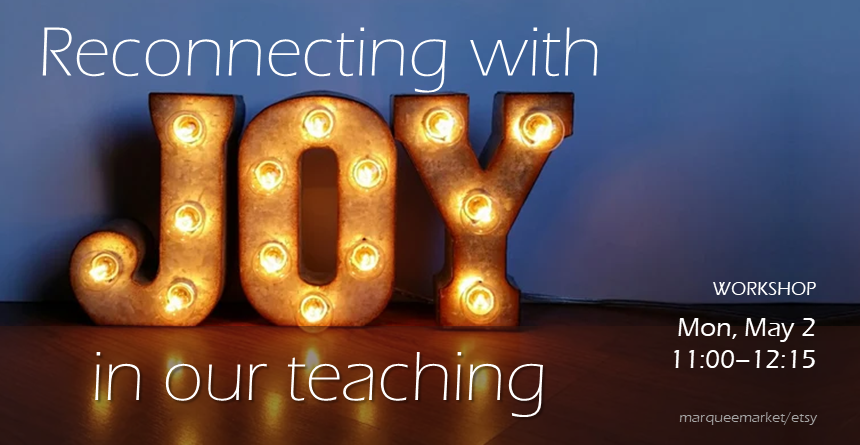
-
22SQ Reconnecting with joy in our teaching - details
-
Morning Workshop
Reconnecting with joy in our teaching
Mon, May 2 | 11:00–12:15 | Zoom link provided upon registration
Facilitated by Erica Martin (School of Theology & Ministry)
Does finding joy in the teaching experience make us better teachers? Numerous studies demonstrate just that! As The Effect of Enjoyment on Learning found, “enjoyment positively influences the didactic process, increases the satisfaction of participants and can positively affect the memorization of information” (Hernik and Jaworska, 2018).
What can we do to maximize enjoyment and mitigate the factors that decrease our delight in teaching? Even before the pandemic, the stresses of faculty life had the ability to suck joy out of the job. Overwork, limited resources, and that endless stack of grading have been compounded by pivots between in-person and online instruction and caring for students whose college experience has been profoundly altered. Faculty voices frequently attest to feeling strain, frustration, and high levels of exhaustion. With our energetic reserves depleted, the joy of teaching can be harder to access.
Could your pleasure in teaching use rekindling? Or do you have a surfeit of joy to share with others? In this workshop, we will explore the role of pleasure in the teaching and learning experience, recognize the elements of teaching that bring each of us the most pleasure, and identify ways we can support ourselves and each other in reconnecting with joy in our teaching practice.
» Registration is now closed
2020–21
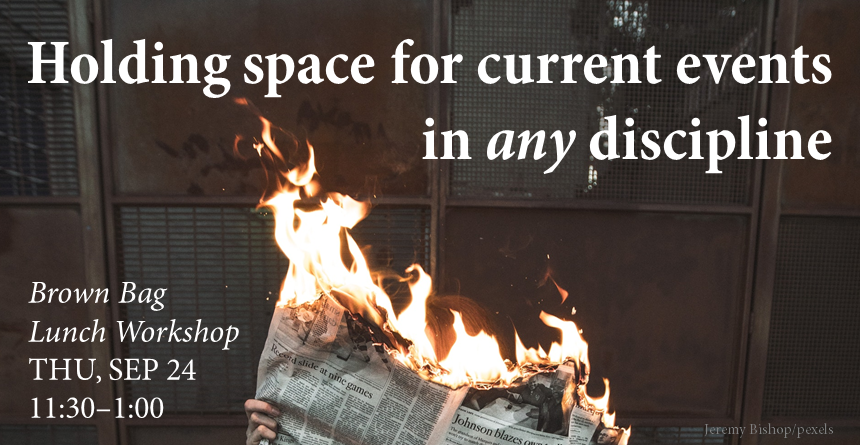
-
20FQ Holding space for current events - details
-
Brown Bag Lunch Workshop
Holding space for current events in any discipline
Thu, Sept 24 | 11:30–1:00 | Zoom link provided upon registration
Facilitated by Holly Slay Ferraro, David Green, and Katherine Raichle
We are living through a critical time in the history of the United States and the world. COVID-19 challenges governments, communities, and individuals around the globe. Racial inequity and police brutality have launched urban unrest. A contentious presidential election, fraught with misogynistic and racist dog whistles in the United States will reach its culmination during our fall teaching schedule. Should we weave current events into our classroom discussions? And, if so, how can we do so in meaningful ways?
In this session, we’ll explore the research on integrating current events and managing political trauma within classrooms. According to the research, such weaving can serve multiple purposes. For example, current topics may be in service of the course and in the interest of students. That is, the aims of the course may be enhanced by introducing structured discussions of the moment. Research has also demonstrated that “responding with socio-emotional and relational pedagogy” (Sondel, Baggett, & Dunn, 2018, p. 180) can be accomplished by providing comfort and protecting safe space. Overall, in the wake of collective tragedies, students found that faculty engaging, rather than ignoring, current events was helpful (Huston & DiPietro, 2007).
All faculty are welcome, and this workshop is especially for you if you are afraid that the academic objectives of your course cannot be met by bringing current events into the classroom or if you feel you do not have the expertise to handle student requests to discuss current events!
Optional Follow-up Session
Attendees who would like to check back in on this topic can do so in a later discussion and debrief.
Thu, Oct 15 | 11:30–12:30 | Zoom
» Registration is now closed
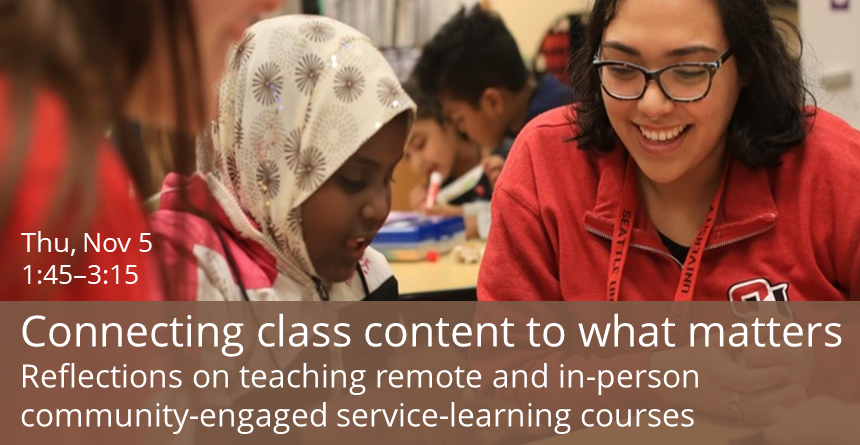
-
20FQ Connecting class content to what matters - details
-
Panel Discussion
Connecting class content to what matters: Reflections on teaching remote and in-person community-engaged service-learning courses
Thu, Nov 5 | 1:45–3:15 | Zoom link provided upon registration
Co-sponsored by the Center for Community Engagement (CCE)
Facilitated by Kristi Lee (College of Education) and Elizabeth Seymour (Center for Community Engagement)
Many questions arise when faculty hear about community-engaged or service-learning courses:
- “Can this work with remote learning?”
- “How can I structure it so that service-learning and course content are integrated and holistic?”
- “How do I prepare students to work in communities that might not be their own?”
Despite the real-world difference these pedagogies can make, we are often held back from exploring them because we can’t quite picture how they will work in practice.
In this interactive panel session, members of the 2019–2020 cohort of Academic Service-Learning Faculty Fellows will share how they used community engagement to enhance student learning and deepen partnerships with local nonprofits. They’ll provide an opportunity to reimagine your courses, connect to the community around us, and provide a richer, more meaningful learning experience for our students.
We’ll end the session by discussing practical steps for building community engaged service-learning into a current course or a course still in development.
» Registration is now closed
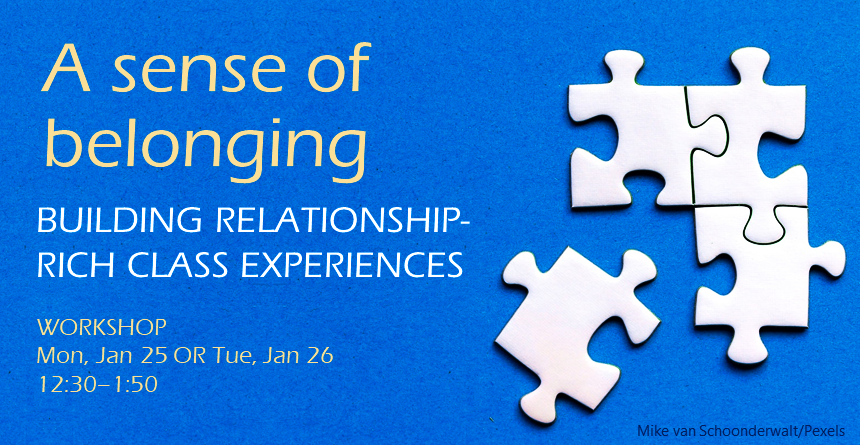
-
21WQ A sense of belonging - details
-
Lunchtime Workshop
A sense of belonging: Building relationship-rich class experiences
Mon, Jan 25 or Tue, Jan 26 | 12:30–1:50 | Zoom link provided upon registration
Co-sponsored by the Assistant Provost for Student Academic Engagement and the Center for Digital Learning and Innovation (CDLI)
Facilitated by David Green
The higher education research tells us that a sense of belonging is key to a successful student learning experience. Yet many students begin their college careers uncertain of whether they truly belong, with feelings of imposterism, isolation, and even shame undermining their chance to thrive. These feelings are found to be more pronounced for underrepresented and first-generation students. Among Seattle U students, a lack of belonging and community is often cited as a reason for students to drop out or transfer to another institution, so we know this is an area that deserves our attention.
In their new book, Relationship-Rich Education (2020), Felten and Lambert identify four principles that drive student success – all of them revolving around human connection and a sense of belonging. During this workshop, we’ll explore these ideas as they pertain to course-related interactions – time in class, office hours, and peer–to–peer engagement. We’ll then focus on a research-based model for designing class activities that frontload relationship-building and trust before moving students to the ultimate goals of knowledge construction and reflection that are central to an enriching learning experience. You’ll leave the session with a roadmap for tweaking your courses to boost your students’ sense of belonging and connection.
Optional follow-up session
Attendees who would like to check back in on this topic can do so in an hour-long discussion and debrief.
Tue, Feb 16 | 12:30–1:30 | Zoom link provided following initial workshop
» Registration is now closed.
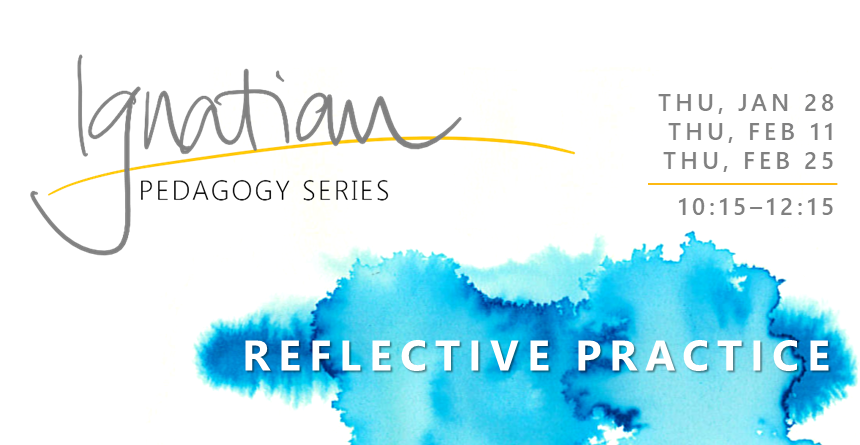
-
21WQ Ignatian Pedagogy Series II: Reflective Practice - details
-
Ignatian Pedagogy Series II: Reflective Practice
Co-sponsored by the Center for Jesuit Education
As a participant in this module of the Ignatian Pedagogy Series, you will
- Discover why reflection is an integral part of Ignatian pedagogy
- Explore models for thinking about reflective practice, both as an instructor and in your students' learning
- Learn ways to use reflection for multiple purposes
- Consider methods of effectively assessing reflection
What are the dates?
It's important that participants attend all three sessions in the series and complete two short written assignments between sessions
- Thu, Jan 28 | 10:15–12:15 | Zoom link provided upon registration
- Thu, Feb 11 | 10:15–12:15 | Zoom link provided upon registration
- Thu, Feb 25 | 10:15–12:15 | Zoom link provided upon registration
Up to twenty-four places are available, and participants will receive a $100 stipend from the Center for Jesuit Education on completion of the module and the related reflection assignments.
Who is facilitating the module?
The entire series is co-directed by David Green of the Center for Faculty Development and Jen Tilghman-Havens of the Center for Jesuit Education. Joining them in this series are Jen Schulz (Interdisciplinary Liberal Studies) and Jenny Loertscher (Chemistry).
How do I apply?
Twenty-four spaces are available on a first-come, first-served basis. It's essential that you can attend all three sessions of the series. To apply, please complete the application form [now closed] on Survey Monkey. You will receive an email confirming your participation in the module in early January.
Please be sure to block off the three sessions in your calendar when you apply so that you are definitely available.
What if I have questions?
If you have any questions about the Ignatian Pedagogy Series, please email faculty-development@seattleu.edu or David Green (greend@seattleu.edu).
» Applications are now closed.
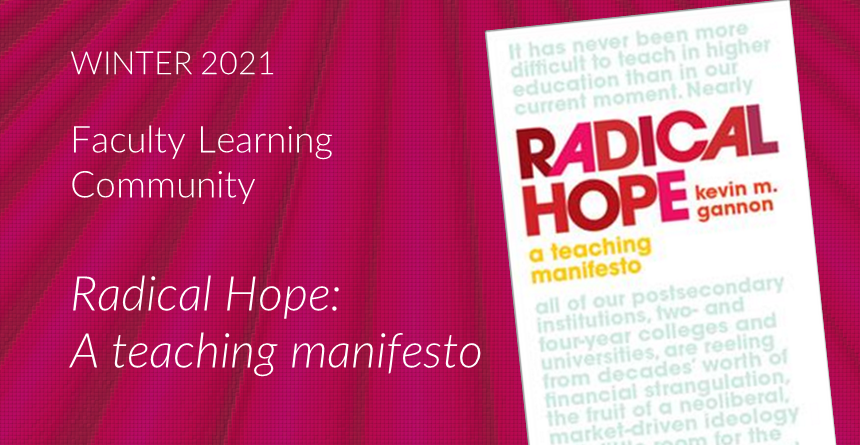
-
21WQ FLC Radical Hope - details
-
Faculty Learning Community
Radical hope: A teaching manifesto
Higher education nationally is fraught with challenges: its value is frequently questioned, its financial stability is in jeopardy, its inequities have become more apparent in the pandemic, and it is far from immune to the myriad racial and social injustices in society. For many faculty, our current work situation brings deep desolations. Against this disquieting landscape of higher ed, Kevin M. Gannon's book, Radical Hope, offers both a path forward for educators and reasons for hope in our time.
From the publisher: "Radical Hope is an ambitious response to this state of affairs, at once political and practical - the work of an activist, teacher, and public intellectual grappling with some of the most pressing topics at the intersection of higher education and social justice. Kevin Gannon asks that the contemporary university's manifold problems be approached as opportunities for critical engagement, arguing that, when done effectively, teaching is by definition emancipatory and hopeful.
"Considering individual pedagogical practice, the students who are the primary audience and beneficiaries of teaching, and the institutions and systems within which teaching occurs, Radical Hope surveys the field, tackling everything from impostor syndrome to cell phones in class to allegations of a campus 'free speech crisis.' Throughout, Gannon translates ideals into tangible strategies and practices (including key takeaways at the conclusion of each chapter), with the goal of reclaiming teachers' essential role in the discourse of higher education."
In this three-session Learning Community, facilitated by Katherine Raichle, you'll read through the book with colleagues and explore how this material applies to your work as an educator.
What's in it for you?
Over the three sessions, you'll learn how to:
- Re-examine higher education with the goal of fostering a renewed hope in your role as an educator to face challenge.
- Identify ways that social injustice is manifest in your classrooms and how to make needed changes.
- Alter your pedagogical practices to create more equitable access to education for all your students.
Who is it suited to?
This community is for any faculty member who seeks to change their teaching practices and curricula in the face of the numerous challenges at the heart of higher ed.
Radical Hope is 152 pages long, and the reading will be split across the three sessions to be manageable for participants.
What are the dates?
The three dates in Winter Quarter are:
- Fri, Jan 29 | 11:00–12:15 | Zoom link provided upon registration
- Fri, Feb 12 | 11:00–12:15 | Zoom link provided upon registration
- Fri, Feb 26 | 11:00–12:15 | Zoom link provided upon registration
Please register by noon on Wednesday, January 20.
» Registration is now closed.
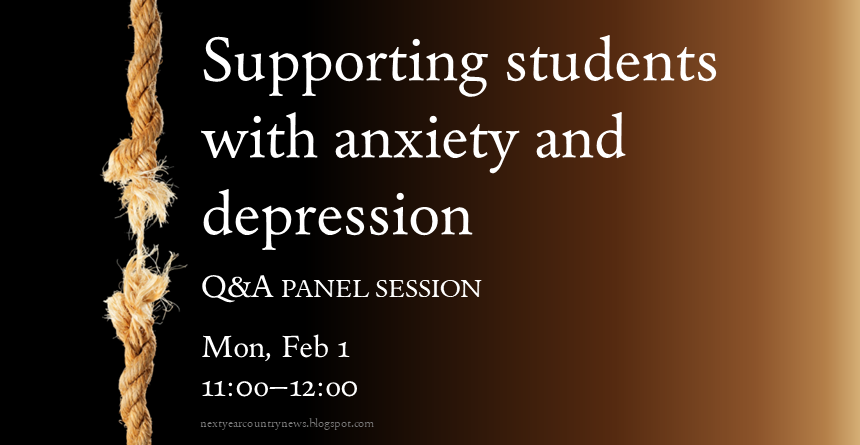
-
21WQ Supporting students with anxiety and depression - details
-
Q&A Panel Session
Supporting students with anxiety and depression
Mon, Feb 1 | 11:00–12:00 | Zoom link provided upon registration
Co-sponsored by Disability Services and Counseling and Psychological Services
Moderated by David Green
Data on student mental health presents a sobering picture: A study of 48,000 US college students found that 63% of students had experienced anxiety in the previous 12 months, while 42% had felt so depressed they found it hard to function. Over the same period, 50% had found academics difficult to handle and 58% reported higher than average levels of stress.
Especially concerning for educators is that this study was published two years before the pandemic (American College Health Association, 2018). Our students were already anxious and depressed before the introduction of restrictions to protect the population from COVID-19 - restrictions that simultaneously removed or reshaped many of the support structures students relied on for their mental health.
Faculty are not employed as mental health professionals. Our role is not to diagnose or offer therapy. Yet there are things we can be doing to support our students and to connect them to relevant university services so that they are encouraged and aided as we struggle through this extraordinary period together.
In this Q&A session, you'll have the opportunity to talk with and learn from Kim Thompson of Disability Services (DS) and Aimée Coonerty-Femiano of Counseling and Psychological Services (CAPS). Find out how you can best help your students, what they can expect when working with DS and CAPS, and how you can engage with these two key offices to create a network of student support that enables our students to succeed.
» Registration is now closed.
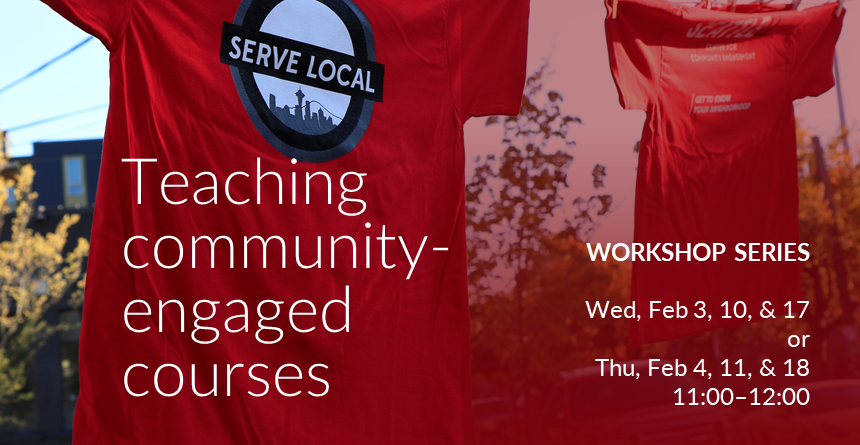
-
21WQ Teaching community-engaged courses - details
-
Workshop Series
Teaching community-engaged courses
Co-sponsored by the Center for Community Engagement
Facilitated by Dr. Kristi Lee (College of Education) and Elizabeth Seymour (Center for Community Engagement)
Faculty who would like to include a community-engagement/service-learning component in a course are invited to participate in a series of three one-hour workshops and a consultation.
What's in it for you?
This program will provide you with:
- an introduction to community-engaged service-learning pedagogy and principles of good practice
- examples of community-engaged service-learning courses
- hands-on opportunities to develop your project and incorporate it into the syllabus
- an individual consultation to identify community partner organizations
Participants will also receive a $150 stipend for attending all three sessions.
Who is it suited to?
This opportunity is open to all faculty.
What are the dates?
Two sections of this series will be run in Winter Quarter, in order to accommodate different teaching schedules. You can choose to attend sessions on Wednesdays or Thursdays. The dates are as follows:
Wednesday section
- Wed, Feb 3 | 11:00–12:00 | Zoom link to follow
- Wed, Feb 10 | 11:00–12:00 | Zoom link to follow
- Wed, Feb 17 | 11:00–12:00 | Zoom link to follow
Thursday section
- Thu, Feb 4 | 11:00–12:00 | Zoom link to follow
- Thu, Feb 11 | 11:00–12:00 | Zoom link to follow
- Thu, Feb 18 | 11:00–12:00 | Zoom link to follow
How do I apply?
To apply for this workshop series, please complete this [application form is now closed] on Survey Monkey by Thursday, January 21 at 12:00pm.
We will notify all applicants of their participation by Monday, January 25 at 5:00pm.
Please be sure to block off the three sessions in your calendar when you apply so that you are definitely available.
Any questions about the series can be directed to Kristi Lee (leekrist@seattleu.edu) or Elizabeth Seymour (eseymour@seattleu.edu).
*The application form for this series is separate from the registration form for other Center events.
» Registration is now closed
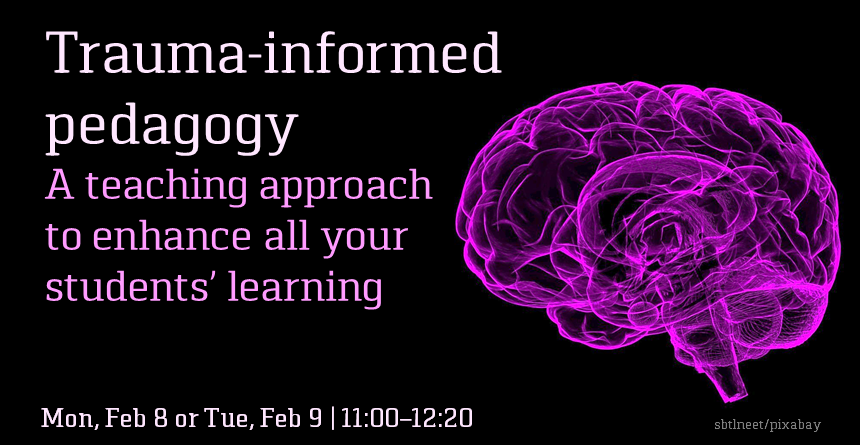
-
21WQ Trauma-informed pedagogy - details
-
Morning Workshop
Trauma-informed pedagogy: A teaching approach to enhance all your students' learning
Mon, Feb 8 or Tue, Feb 9 | 11:00–12:20 | Zoom link provided upon registration
Facilitated by Katherine Raichle
The past year has been unprecedented in its challenges and ongoing traumas. The ensuing stress has limited the bandwidth of many of our students to deeply engage in our courses. We know that the impact of trauma is detrimental to learning, thus the common observations that some students appear "checked out" or "disorganized." This past year has foregrounded the critical interface of mental wellness and learning, urgently calling on us to change our pedagogical practices.
Trauma-Informed Pedagogy is an approach to teaching that considers the needs of our students, thus enhances their learning during this most challenging time. However, benefits of this pedagogy are timeless, born from the knowledge that trauma is ubiquitous amongst our students. Moreover, these practices are well-known to enhance learning for all students.
This workshop is for anyone who would like to make subtle yet substantive changes to their pedagogical practices that will enhance trust, community, engagement, and learning for all students. All levels of teaching experience are welcomed.
In this workshop, we will:
- Examine our own biases around student "misbehavior," broadening the scope of our understanding of, and empathy for, our students.
- Identify the ways that trauma can manifest in compromised learning for our students.
- Apply the principles of Trauma-Informed Pedagogy to your current and/or future classes.
- Explore the benefits of Trauma-Informed Pedagogy for our students, but also for ourselves.
Optional follow-up session
Attendees who would like to check back in on this topic can do so in an hour-long discussion and debrief.
Mon, Feb 22 | 11:00–12:00 | Zoom link provided following initial workshop
» Registration is now closed.
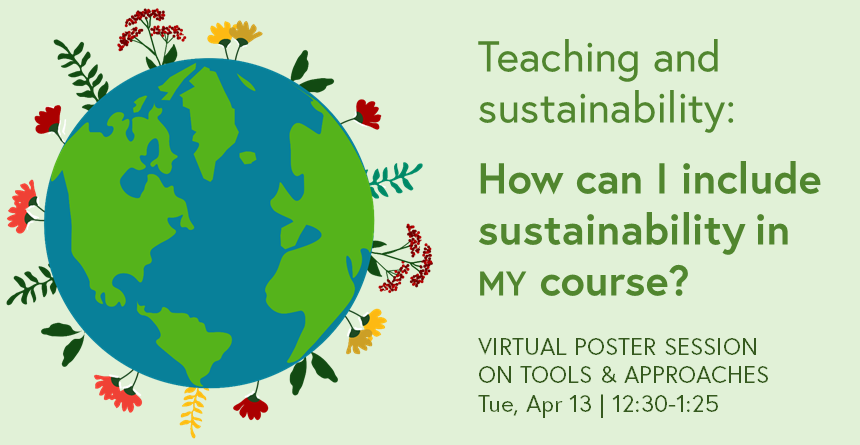
-
21SQ Teaching and sustainability - details
-
Virtual Poster Session
Teaching and sustainability: How can I include sustainability in my course?
Tue, Apr 13 | 12:30–1:25 | Zoom link provided upon registration
Co-sponsored by the President's Committee for Sustainability (PCS) and the Center for Environmental Justice and Sustainability (CEJS)
Facilitated by the President's Committee for Sustainability
When faculty members contemplate teaching a course that includes material outside their expertise areas, the result is often anxiety - and avoidance.
The topic of sustainability epitomizes this challenge. At Seattle University, we define sustainability in an inclusive way, encompassing human and ecological health, social justice, secure livelihoods, and a better world for all generations. No single course could possibly address every aspect of sustainability, and no faculty member has a deep understanding of every sustainability-related concept. Nevertheless, sustainability is a significant part of Seattle University's Strategic Plan and is included in the learning outcomes of many programs on campus. While many of us already address sustainability at some level in our courses, we sometimes feel out of our depth, or we wish we could develop different or deeper ways to address the core sustainability concepts and issues within our courses. Given the breadth of the topic, different strategies can be implemented. This virtual poster session is designed to provide ideas and concrete tools for addressing sustainability-related concepts in your courses by providing examples from those who have successfully developed and used them in their classes.
This session will feature a variety of faculty from across the Seattle University campus and curriculum; each will briefly "show and tell" a sustainability-related activity, project, exercise, or model that they have found to work well. They will also reflect upon their experiences, highlighting "lessons learned."
This poster session will provide an opportunity to hear about a variety of teaching techniques and methods and is intended to help you brainstorm how you can more effectively cover the cross-disciplinary concepts so central to sustainability, whatever your specific expertise. Please join us!
» Registration is now closed.
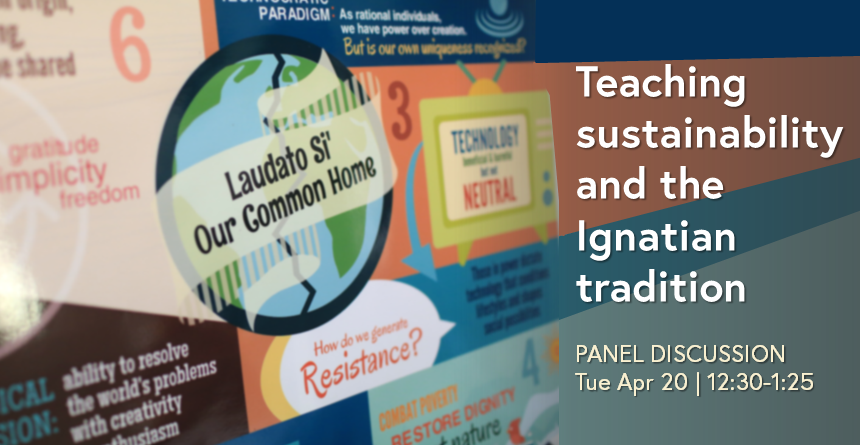
-
21SQ Teaching sustainability and the Ignatian tradition - details
-
Panel Discussion
Teaching sustainability and the Ignatian tradition
Tue, Apr 20 | 12:30–1:25 | Zoom link provided upon registration
Co-sponsored by the President's Committee for Sustainability (PCS) and the Center for Environmental Justice and Sustainability (CEJS)
Facilitated by the President's Committee for Sustainability
At Seattle University, we define sustainability in an inclusive way, encompassing human and ecological health, social justice, secure livelihoods, and a better world for all generations.
A group of specialists in Ignatian pedagogy and in teaching sustainability will share their expertise, experience, and perspectives in this lunchtime panel discussion focusing on teaching sustainability using the Ignatian approach.
Sustainability features prominently in Seattle University's Strategic Plan and is in the learning outcomes of many SU programs. Many of us already cover some sustainability-related material in our courses, but we may not be familiar with the ways Ignatian teaching traditions may relate to the teaching of sustainability concepts and issues.
Planned speakers for this panel discussion will share their experience with Ignatian fundamentals and/or sustainability teaching, their expertise in these areas, their ideas and perspectives about the intersection of these concepts, and the rich promise of a teaching focus that capitalizes on this intersection. Invited speakers will include:
- Ignatian scholars/program developers from Seattle University
- SU faculty who have implemented Ignatian pedagogical practices in their teaching of topics related to sustainability
- Potentially scholars from other universities who are specialists in this teaching approach and intersectional area
This promises to be a thought-provoking discussion - please join us!
» Registration is now closed.
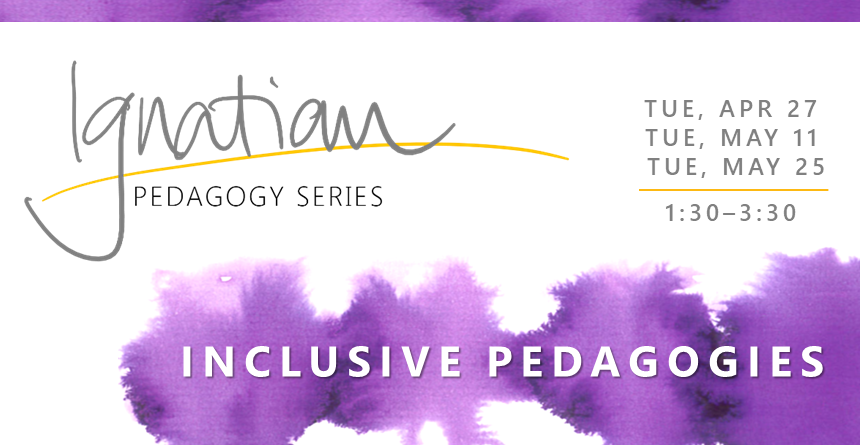
-
21SQ Ignatian Pedagogy Series III: Inclusive Pedagogies - details
-
Ignatian Pedagogy Series III: Inclusive Pedagogies
Co-sponsored by the Center for Jesuit Education and the Office of Diversity and Inclusion
As a participant in this module of the Ignatian Pedagogy Series, you will
- Explore what the higher education literature and Ignatian pedagogical principles teach us about inclusive pedagogies, with a focus on racial diversity.
- Experiment with a range of inclusive approaches to pedagogy as both a student and a teacher.
- Examine inclusive pedagogies as a vehicle for transformative learning.
- Reflect on the experience of new pedagogical strategies.
- Develop concrete plans to embed transparently inclusive pedagogies in future courses.
What are the dates?
It's important that participants attend all three sessions in the series and complete two short written assignments between sessions
- Tuesday, April 27 | 1:30–3:30 | Zoom link provided upon registration
- Tuesday, May 11 | 1:30–3:30 | Zoom link provided upon registration
- Tuesday, May 25 | 1:30–3:30 | Zoom link provided upon registration
Up to twelve places are available, and participants will receive a $100 stipend from the Center for Jesuit Education on completion of the module and related reflection assignments.
Who is facilitating the module?
The entire series is co-directed by David Green of the Center for Faculty Development and Jen Tilghman-Havens of the Center for Jesuit Education. Joining them in this module are Holly Slay Ferraro (Center for Faculty Development/Management) and Katherine Raichle (Center for Faculty Development/Psychology).
How do I apply?
Twelve spaces are available on a first-come, first-served basis. It's essential that you can attend all three sessions of the series. To apply, please complete this Ignatian Pedagogy Series application form [now closed] on Survey Monkey. You will receive an email confirming your participation in the module in early April.
Please be sure to block off the three sessions in your calendar when you apply so that you are definitely available.
What if I have questions?
If you have any questions about the Ignatian Pedagogy Series, please email faculty-development@seattleu.edu, David Green (greend@seattleu.edu), or Jen Tilghman-Havens (tilghman@seattleu.edu).
» Applications are now closed.
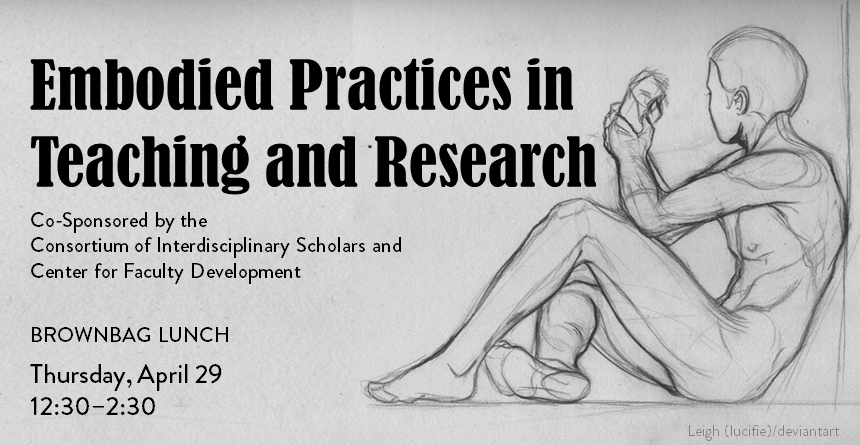
-
21SQ Embodied practices in teaching and research - details
-
Panel Discussion
Embodied practices in teaching and research
Thu, Apr 29 | 12:30–1:30 main event, with a follow-up discussion until 2:30 | Zoom link provided upon registration
Co-sponsored by the Consortium of Interdisciplinary Scholars (CIS)
Facilitated by Jen Schulz (Interdisciplinary Liberal Studies)
After a year of working in the oft-labeled "disembodied" Zoom space, many of us are recognizing how, faced with the lack of opportunities for interpersonal engagement as well as the fear of infection, we have become increasingly aware of our own embodiment. The ubiquitous threat that discriminatory practices, systems, and implicit bias poses to certain bodies over others has, again, been thrown into bold relief during this time.
Come listen to Jasmine Mahmoud (College of Arts and Sciences), Alic Shook (College of Nursing), and Dean Spade (School of Law) respond to the following question:
How do you attend to embodiment (conceptually and/or in practice) in your teaching and your research?
Following each talk, we will invite you into lively conversation and collaboration. Bring your lunch and stay, if you can, for the next hour.
» Registration is now closed.
2019–20
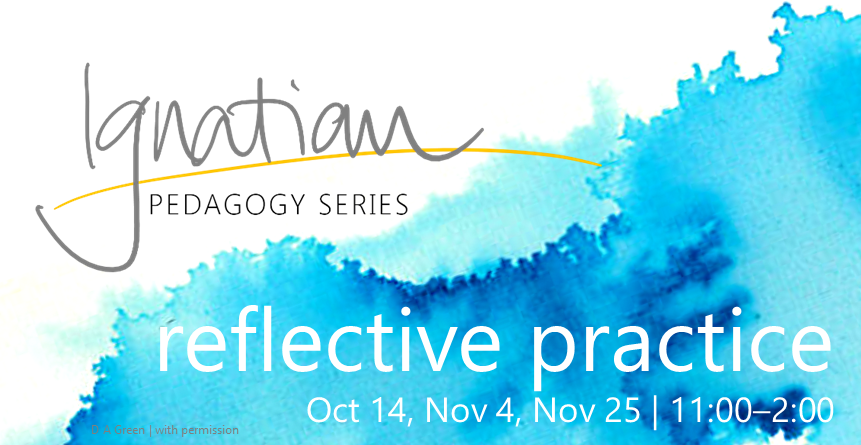
-
19FQ Ignatian Pedagogy Series II: Reflective Practice - details
-
Ignatian Pedagogy Series II: Reflective practice
As a participant in this module of the Ignatian Pedagogy Series, you will
- Discover why reflection is an integral part of Ignatian pedagogy
- Explore models for thinking about reflective practice, both as an instructor and in your students’ learning
- Learn ways to use reflection for multiple purposes
- Consider methods of effectively assessing reflection
What are the dates?
It’s important that participants attend all three sessions in the series and complete two short written assignments between sessions:
- Monday, October 14 | 11:00–2:00 | Hunthausen 110
- Monday, November 4 | 11:00–2:00 | Hunthausen 110
- Monday, November 25 | 11:00–2:00 | Hunthausen 110
Lunch is provided at each session, with support from the Endowed Mission Fund.
Up to twenty places are available, and participants will receive a $100 stipend from the Center for Jesuit Education on completion of the module and the related reflection assignments.
Who is facilitating the module?
The entire series is co-directed by David Green of the Center for Faculty Development and Jen Tilghman-Havens of the Center for Jesuit Education. They are atheist and Catholic, respectively, and both share a passion for this transformative educational approach.
Joining them in this series is Jen Schulz (Interdisciplinary Liberal Studies), with further contributions from faculty from across campus.
How do I apply?
Twenty spaces are available.
To apply, please complete the application form at https://www.surveymonkey.com/r/SUcetl19FQIPS-RP by [Registration is now closed].
We will notify all applicants of their participation by Friday, October 4.
Please be sure to block off the three sessions in your calendar when you apply so that you are definitely available.
What if I have questions?
If you have any questions about the Ignatian Pedagogy Series, please email faculty-development@seattleu.edu or call David Green (206-296-5386) or Jen Tilghman-Havens (206-296-2335).
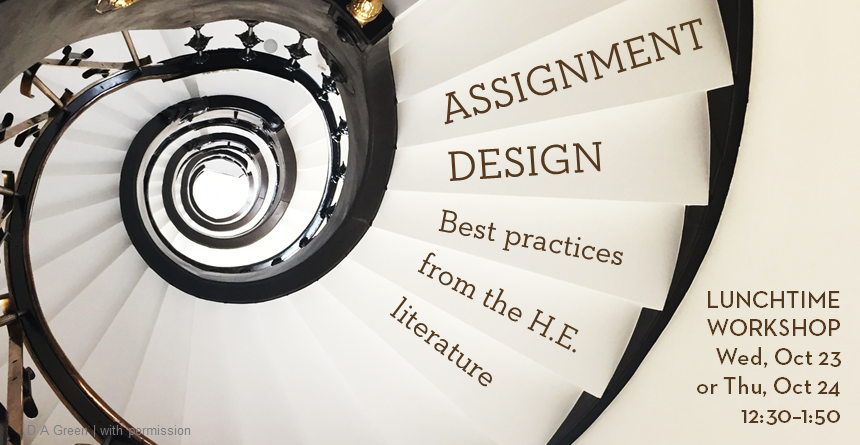
-
19FQ Assignment design: Best practices from the H.E. literature - details
-
Lunchtime Workshop
Wed, Oct 23 | 12:30–1:50 | HUNT 110
or
Thu, Oct 24 | 12:30–1:50 | HUNT 100
Facilitated by Katherine RaichleOne of the most challenging aspects of our work as educators is to create assignments that challenge and motivate students to engage deeply with our course material.
The most effective assignments invite our students to immerse themselves fully and critically in the course content, and create an opportunity for formative and summative feedback for our students’ ongoing learning, as well as aligning with our learning outcomes. In the end, we hope that our assignments encourage students to take ownership over their work, calling on them to be more imaginative, critical, and ambitious in their studies.
In this workshop, we’ll explore assignment design that seeks to meet these ideals. We’ll explore designing assignments that align with your course learning outcomes and capture the appropriate level of challenge you expect from your students at different points in the term. Finally, we will challenge you to consider how to develop creative assignment formats that invite students to become more motivated to engage in, and take ownership over, their assignments.
Please come to the workshop with a specific course in mind!
Optional Follow-up Session
Attendees who would like to check back in on this topic can do so in an hour-long discussion and debrief.
Wed, Nov 6 | 2:30–3:30 | Wismer Room (LOYA 400) | Coffee, tea, and appetizers provided
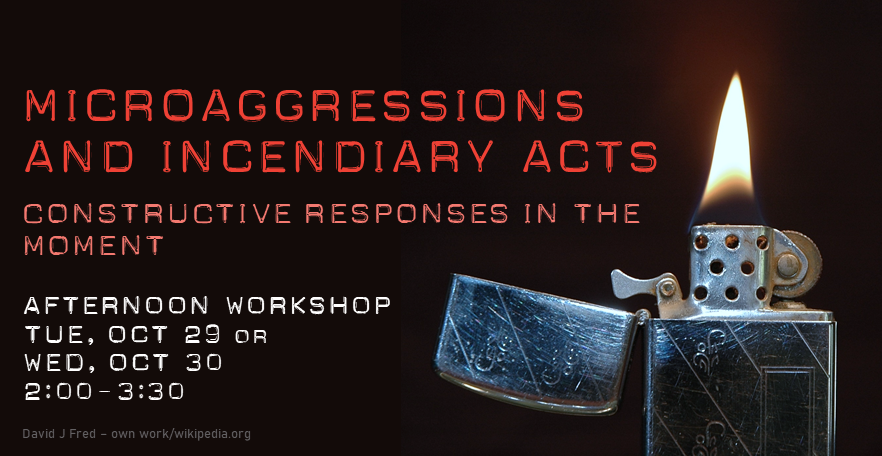
-
19FQ Microaggressions and incendiary acts - details
-
Afternoon Workshop
Tue, Oct 29 or Wed, Oct 30 | 2:00–3:30 | HUNT 110
Co-sponsored by the Office of Diversity and Inclusion
Facilitated by Holly Slay Ferraro and David GreenNo matter what subject we teach, we hear surprising, sometimes incendiary, comments and asides in the classroom that can severely hinder students’ learning and sense of well-being – as well as catching faculty members unprepared. At times these incidents relate to the sensitive topics that some of us teach, but more often than not, they appear out of the blue.
A subset of these incendiary acts – microaggressions (D W Sue, 2010) – relates specifically to people’s identities, invoking such components as race, gender, religion, and sexual orientation. Research tells us microaggressions have a harmful effect on classroom environment and learning, and that faculty need to respond to them swiftly for balance to be reestablished and learning to occur.
How can faculty respond to these unexpected, incendiary acts and comments in ways that maintain a positive learning environment and help our students reflect on how their comments and actions influence classroom dynamics? What strategies can we use to ensure these hot moments are addressed as quickly as possible and enhance rather than detract from learning? In this workshop, we’ll share recommendations from the literature and rehearse real-life SU scenarios to practice our agility in handling incendiary acts and microaggressions.
Optional Follow-up Session
Attendees who would like to check back in on this topic can do so in an hour-long discussion and debrief.
Wed, Nov 20 | 3:30–4:30 | Wismer Room (LOYA 400) | Drinks and appetizers provided
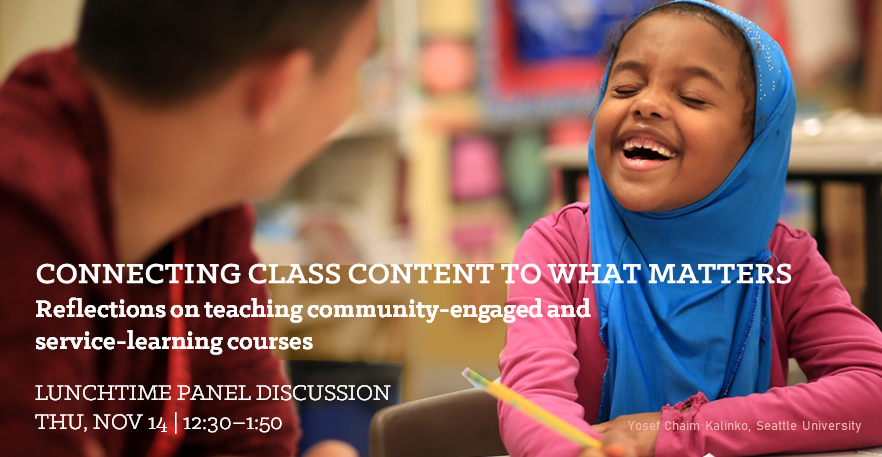
-
19FQ Connecting class content to what matters - details
-
Lunchtime Panel Discussion
Thu, Nov 14 | 12:30–1:50 | Rolfe Room (ADAL)
Co-sponsored by the Center for Community Engagement
Facilitated by Kristi Lee and Elizabeth SeymourMany questions arise when faculty hear about community-engaged or service-learning courses:
- “Can this work in my discipline?”
- “How can I structure it so that service learning and course content are integrated and holistic?”
- “How do I prepare students to work in communities that might not be their own?”
- “Will my students learn what I want them to from their community engagement?”
Despite the real-world difference these pedagogies can make, we are often held back from exploring them because we can’t quite picture how they will work in practice.
In this interactive panel session, members of the 2018–2019 cohort of Academic Service-Learning Faculty Fellows will share how they used community engagement to enhance student learning and deepen partnerships with local nonprofits. They provide an opportunity to reimagine your courses, connect to the community around us, and provide a richer, more meaningful learning experience for our students.
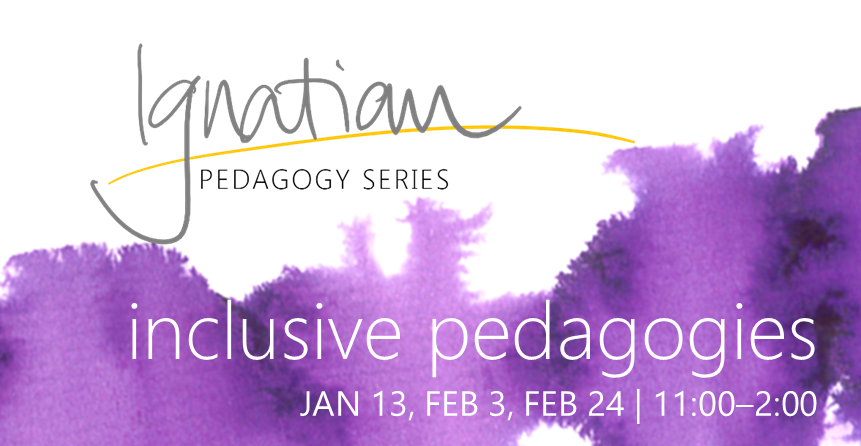
-
20WQ Ignatian Pedagogy Series III: Inclusive Pedagogies - details
-
Co-sponsored by the Center for Jesuit Education and the Office of Diversity and Inclusion
In this module of the series, participants will
- Explore what the higher education literature and Ignatian pedagogical principles teach us about inclusive pedagogies, with a focus on racial diversity.
- Experiment with a range of inclusive approaches to pedagogy as both a student and a teacher.
- Examine inclusive pedagogies as a vehicle for transformative learning.
- Reflect on the experience of new pedagogical strategies.
- Develop concrete plans to embed transparently inclusive pedagogies in future courses.
What are the dates?
It's important that participants attend all three sessions in the series and complete two short written assignments between sessions:
- Monday, January 13 | 11:00–2:00 | Student Center 210
- Monday, February 3 | 11:00–2:00 | Student Center 210
- Monday, February 24 | 11:00–2:00 | Student Center 210
Lunch is provided at each session, with support from the Endowed Mission Fund.
Who is facilitating the module?
The entire series is co-directed by David Green of the Center for Faculty Development and Jen Tilghman-Havens of the Center for Jesuit Education. They are atheist and Catholic, respectively, and both share a passion for this transformative educational approach.
Joining them in this module are Holly Slay Ferraro (Center for Faculty Development/Management) and Katherine Raichle (Center for Faculty Development/Psychology).
How do I apply?
Twenty spaces are available.
Please apply for Winter Quarter's Ignatian Pedagogy Series by filling out this application form by [Applications are now closed].
We will notify all applicants of their participation by Friday, December 13.
Please be sure to block off the three sessions in your calendar when you apply so that you are definitely available.
What if I have questions?
If you have any questions about the Ignatian Pedagogy Series, please email faculty-development@seattleu.edu or call David Green (206-296-5386) or Jen Tilghman-Havens (206-296-2335).
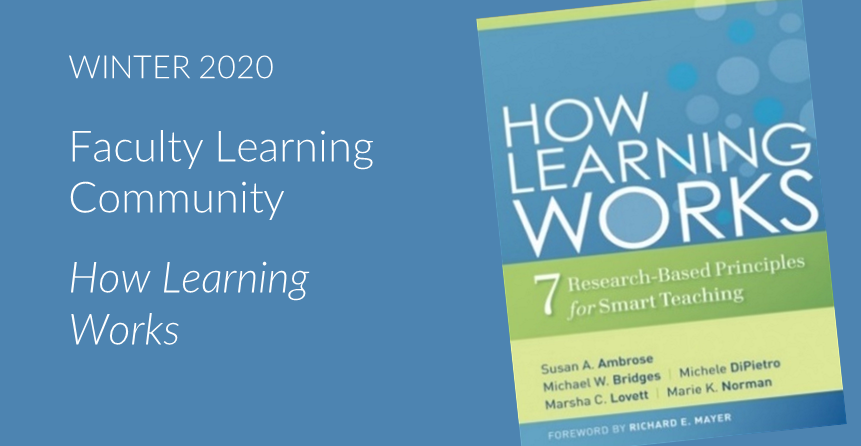
-
20WQ FLC - How learning works - click for details
-
Faculty Learning Community
How learning works: Seven research-based principles for smart teaching
Are you interested in finding out more about your students’ learning and adjusting your own courses as a result? How Learning Works, written by faculty developers from Carnegie Mellon University, is grounded in evidence from cognitive sciences, education, and psychology, and presents seven key principles that you can use to inform the design of your courses. Covering such topics as mastery, prior knowledge, motivation, and classroom climate, this book has gained an international reputation for its clarity, rigor, and practicality. In this four-session Learning Community, facilitated by Katherine Raichle (Center for Faculty Development), you’ll be able to increase your understanding of learning, plan concrete changes for your classes, and discuss the results of these changes with an interdisciplinary group of peers.
What's in it for you?
Over the course of this learning community, you'll:
- Set regular goals to try out new ideas in your current courses,
- Learn insights from the book and other group members,
- Provide one another feedback on your course experiments and adjustments,
- Have the support of colleagues who are facing similar issues and,
- Gain confidence in your ability to make well-informed decisions to aid your students’ learning.
Who is it suited to?
This community is for any faculty member who would like to take a more research-based approach to teaching. Ideally, you would be teaching in Winter so that you can put new ideas into practice immediately and are therefore better able to contribute to group discussion and reflection. This will give everyone greater insight into the variability of teaching contexts and norms, and can lead to a deeper appreciation of disciplinary nuances in higher education.
How learning works: Seven research-based principles for smart teaching is 224 pages long, and the reading will be split across the four sessions to be manageable for participants.
What are the dates?
The four dates in Winter Quarter are
- Tuesday, Jan 28 | 2:00–3:15 | Wismer Room (Loyola 400) | Coffee/tea provided
- Tuesday, Feb 11 | 2:00–3:15 | Wismer Room (Loyola 400) | Coffee/tea provided
- Tuesday, Feb 25 | 2:00–3:15 | Wismer Room (Loyola 400) | Coffee/tea provided
- Tuesday, Mar 10 | 2:00–3:15 | Wismer Room (Loyola 400) | Coffee/tea provided
»Registration is now closed.
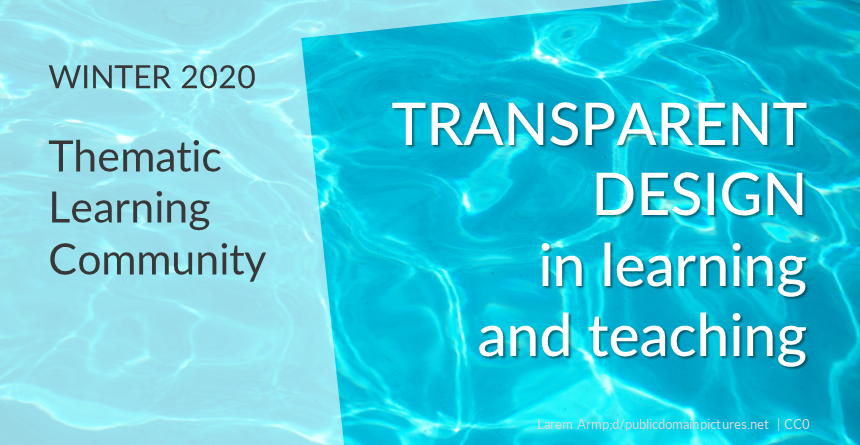
-
20WQ TLC - Transparent design - click for details
-
Thematic Learning Community
Transparent design in higher education teaching and leadership: A guide to implementing the transparency framework institution-wide to improve learning and retention
Co-sponsored by the Office of Diversity and Inclusion (ODI)
We know from decades of research that access to learning is inequitable for students, continuing an unjust pattern of underrepresentation and underachievement in higher education for specific groups of people. Faculty are often left feeling that addressing such huge discrepancies is beyond their control. Yet there are simple and immediate ways to create more equitable access to learning in your classes.
In this learning community, facilitated by Katherine Raichle (Center for Faculty Development), we will explore a simple and high-impact transformational approach to teaching – the Transparent Design in Learning and Teaching initiative in higher education (TILT). Put simply, TILT is an approach to teaching that helps students better understand how and why they are learning course content. Even tiny adjustments to teaching practices informed by TILT have been shown to bridge inequitable access to learning, enhancing learning for all students, while importantly benefiting underrepresented students in particular. Moreover, research has shown a lasting impact of TILT on student confidence, metacognitive self-awareness, sense of belonging, and persistence.
This is a hands-on and practice-oriented thematic learning community where we will learn about TILT and apply its principles to the design of assignments and teaching practices in our classes.
What's in it for you?
Over the four sessions, you'll learn how to:
- Make small and immediate changes to your classes that enhance the learning outcomes for all your students – especially those from underrepresented groups,
- Apply the principles of Transparency in Learning and Teaching to the teaching practices in your classes,
- Design assignments that align with Transparency in Learning and Teaching practices.
Who is it suited to?
This community is for any faculty member who is seeking to enhance their students’ learning and make their learning practices more equitably accessible to all students.
We will cover several selected readings, including sections of the book Transparent design in higher education teaching and leadership, a copy of which we will provide for you. The readings will be split across the four sessions to be manageable for participants.
What are the dates?
The four dates in Winter Quarter are
- Fri, Jan 31 | 9:30–10:45 | ADMN 323 | Coffee/tea provided
- Fri, Feb 14 | 9:30–10:45 | Casey Commons (CASY 530) | Coffee/tea provided
- Fri, Feb 28 | 9:30–10:45 | Casey Commons (CASY 530) | Coffee/tea provided
- Fri, Mar 13 | 9:30–10:45 | Casey Commons (CASY 530) | Coffee/tea provided
»Registration is now closed.
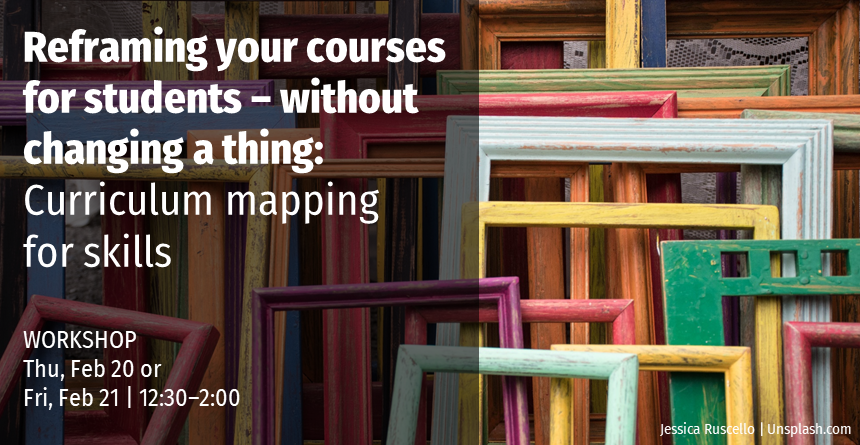
-
20WQ Reframing courses for skills - click for details
-
Lunchtime Workshop
Facilitated by David Green
Thu, Feb 20 | 12:30–2:00 | HUNT 100 | Lunch provided
OR
Fri, Feb 21 | 12:30–2:00 | HUNT 100 | Lunch provided
With the high cost of higher education in the USA, many students and their families are understandably concerned about their career readiness on graduation, conscious that student loans will need paying off sooner, rather than later.
What students may not be aware of is the extent to which they build up a wide array of transferable skills before graduation – ones that employers and organizations are clamoring for. In some cases, they’ll also have artifacts to demonstrate those abilities, whether through written assignments, video presentations, creative works, or simply through evidence of their own advanced organizational processes. These skills can be intellectual, interpersonal, (intra)personal, creative, and technical.
In this session, we’ll share a pilot project that maps the skills that students already use in an entire major, and you will have a chance to try it out for one or two of your own courses. These “curriculum maps for skills” can serve two functions: first, they show current and potential students what skills they can expect to practice and develop during your course, and second, at the program level, they allow teams to gain an overview of an entire program and look for potential gaps that might be filled through only minor adjustments. In turn, these maps could become useful resources to add to programs’ web pages, particularly for programs where there is no direct, linear career target, such as many social science, humanities, and arts fields.
Bring along a copy of a syllabus or two so that you can test out the mapping process for your own classes. We particularly encourage department chairs and program directors to join us!
»Registration is now closed.
Optional Follow-up Session
Attendees who would like to check back in on this topic can do so in a later discussion and debrief.
Fri, Mar 13 | 12:15–1:15 | HUNT 100 | Lunch provided
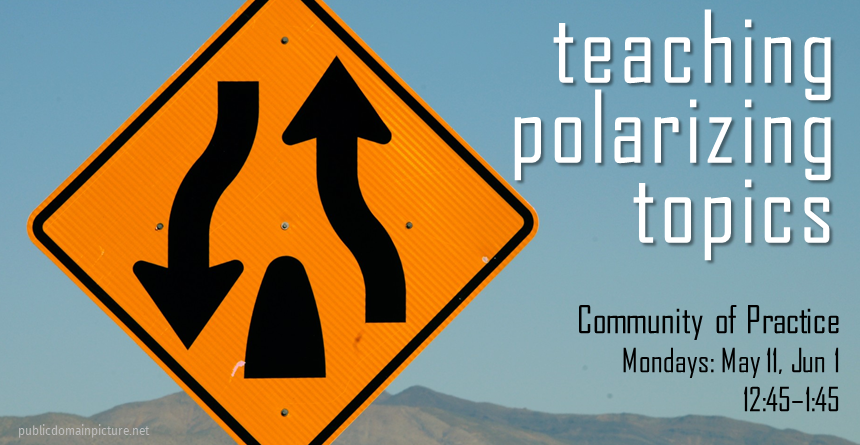
-
20SQ Teaching polarizing topics - details
-
Community of Practice
Co-sponsored by the Office of Diversity and Inclusion, the Center for Faculty Development, and the Center for Digital Learning and Innovation; facilitated by Holly Slay Ferraro
Mondays: May 11 and June 1 | 12:45–1:45 | Zoom link will be sent upon registration
Your courses focus on race, gender, sexuality, or other issues where students encounter new ideas that run counter to master narratives. And now you’re teaching during a global pandemic, an environment where race, gender, class, and more are thrust onto the national stage. Perhaps you feel overwhelmed as you contemplate teaching polarizing content during this time of crisis.
In this Community of Practice, we will share questions and ideas with others who are also teaching hot-button topics. A Community of Practice (Wenger, 1998) is an informal gathering of individuals in similar roles who are spread out across an organization, rather than in frequent contact with one another. The Center for Faculty Development has been using this model with department chairs since 2011; this model is particularly beneficial now since faculty are less able to meet and share best practices.
Our explorations could range from opportunities to challenges faced at every stage of the teaching cycle. Through a community learning approach, we could extract lessons on how to manage resistance, communicate across differences, and integrate current events.
Using the strategies we co-create in this Community of Practice, you will be better able to prepare your students for discussing hot button topics themselves by pushing them to learn and grow in a way that’s appropriate for living through a global crisis.
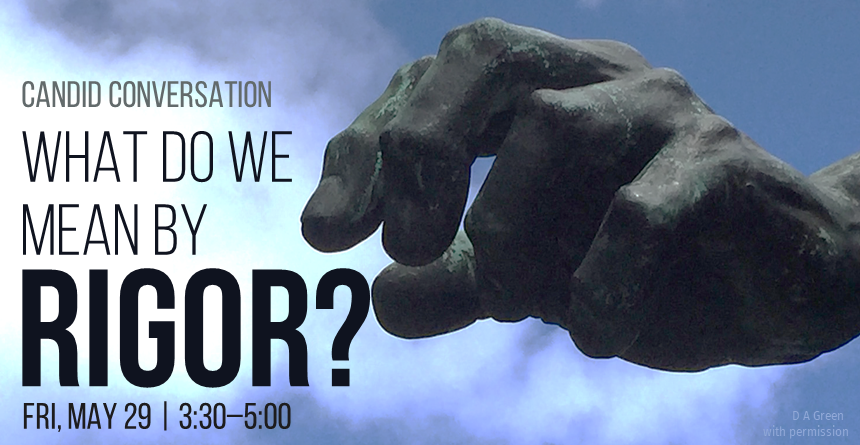
-
20SQ What do we mean by rigor? - details
-
Candid Conversation
Co-sponsored by the Office of Diversity and Inclusion, the Center for Faculty Development, and the Wismer Professor for Gender and Diversity Studies; Facilitated by Holly Slay Ferraro and David Green
Fri, May 29 | 3:30–5:00 | Zoom link will be sent upon registration
As we’ve entered into the COVID-19 crisis, some professors have expressed concerns about rigor being sacrificed for flexibility and care for students. Others have announced gratitude for the current turmoil unveiling the problems of rigor.
Rigor has as many meanings as professors who seek to instill it into their courses. For some, it means creating challenging courses where few, who exhibit extraordinary effort, can be successful (in terms of high grades). For others, rigor is the creation of courses that stretch students to consider perspectives they have not considered before taking the course. For others still, rigor is a pretext for perpetuating discrimination and inequality. For them, the word is synonymous with academic hazing designed to replicate taken-for-granted disciplinary biases and prejudicial assumptions.
In this candid conversation, the Office of Diversity and Inclusion, Center for Faculty Development, and the Wismer Professor for Gender and Diversity Studies create space for frank and honest dialogue on rigor. We begin the discussion with a brief look at the research on rigor and open it to faculty perspectives and concerns.
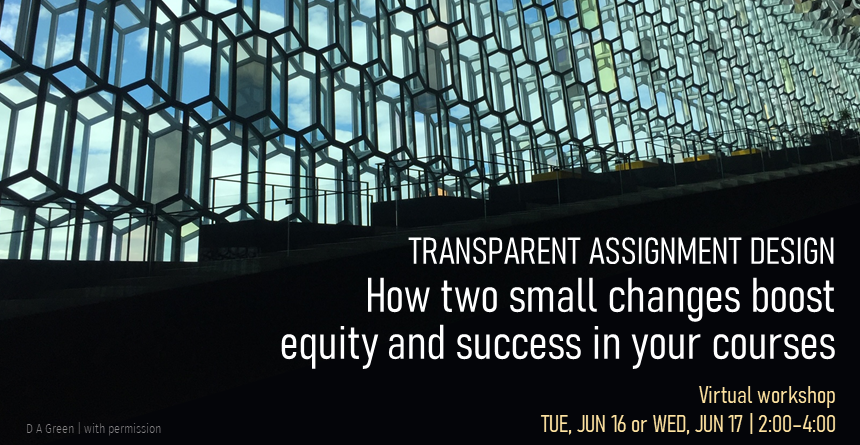
-
20SQ Transparent assignment design - details
-
Virtual workshop
Tue, Jun 16 or Wed, Jun 17 | 2:00–4:00 | Zoom link will be sent upon registration
Co-sponsored with the Office of Diversity and Inclusion and the Assistant Provost for Student Academic Engagement; Facilitated by David Green and Katherine Raichle
Building on our Winter Quarter learning community on Transparent Design, we now bring the wider campus a workshop that helps you begin to address inequities in your own courses through research-based adjustments to your assignments. If you are seeking one thing you can do immediately to move toward a more just learning environment for your students, this research-based intervention could prove a productive starting point.
We know from decades of research that access to learning is inequitable for students, continuing an unjust pattern of underrepresentation and struggle in higher education for people belonging to specific minoritized groups. Faculty are often left feeling that addressing such huge discrepancies is beyond their control. Fortunately, there are immediate ways to begin creating more equitable access to learning in your classes – ones that will in fact aid ALL learners.
In this session, we’ll explore a surprisingly simple and high-impact transformational approach to assignment design – Transparency in Learning and Teaching (TILT). Put simply, TILT is an approach that helps students better understand how and why they are learning course content and completing assignments. Even tiny adjustments informed by TILT have been shown to help bridge inequitable access to learning, enhancing learning for all students, while importantly benefiting underrepresented students in particular. Moreover, research has shown a lasting impact of TILT on student confidence, awareness of skills development, sense of belonging, and persistence.
In this session, you’ll have opportunity to apply the principles of Transparency in Learning and Teaching to one of your assignments so that you can replicate the model for any of your courses.
Have available a copy of an assignment or two to apply the TILT approach to. You might want to focus on assignments where you’re disappointed with students’ performance, where you receive a lot of push-back, confusion, or questions from students, or where you find student motivation lacking.
» Register
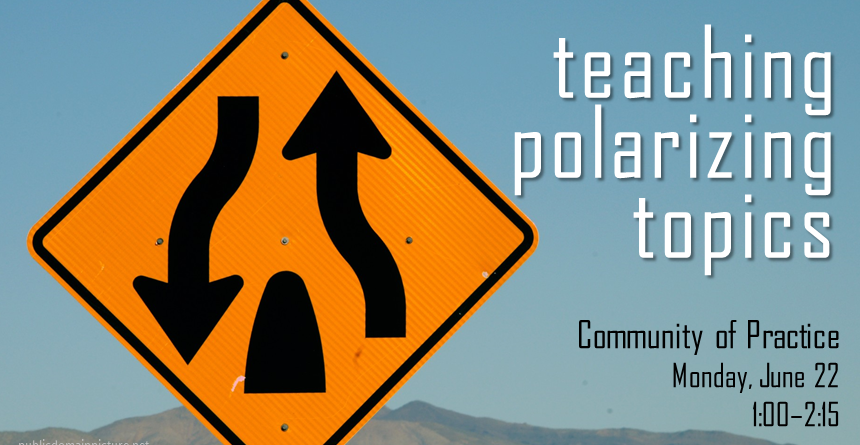
-
20SQ Teaching polarizing topics - additional session
-
Mon, Jun 22 | 1:00–2:15 | Zoom link will be sent upon registration
Co-sponsored by the Office of Diversity and Inclusion, the Center for Faculty Development, and the Center for Digital Learning and Innovation; Facilitated by Holly Slay Ferraro
We’re adding a further session for this community at the request of group members. If you’ve weren’t able to join us in Spring Quarter, please do so now!
Your courses focus on race, gender, sexuality, or other issues where students encounter new ideas that run counter to master narratives. And now you’re teaching during a global pandemic, an environment where race, gender, class, and more are thrust onto the national stage. Perhaps you feel overwhelmed as you contemplate teaching polarizing content during this time of crisis.
In this Community of Practice, we will share questions and ideas with others who are also teaching hot-button topics. A Community of Practice (Wenger, 1998) is an informal gathering of individuals in similar roles who are spread out across an organization, rather than in frequent contact with one another. The Center for Faculty Development has been using this model with department chairs since 2011; this model is particularly beneficial now since faculty are less able to meet and share best practices.
Our explorations could range from opportunities to challenges faced at every stage of the teaching cycle. Through a community learning approach, we could extract lessons on how to manage resistance, communicate across differences, and integrate current events.
Using the strategies we co-create in this Community of Practice, you will be better able to prepare your students for discussing hot-button topics themselves by pushing them to learn and grow in a way that’s appropriate for living through a global crisis.
» Register
2018–19
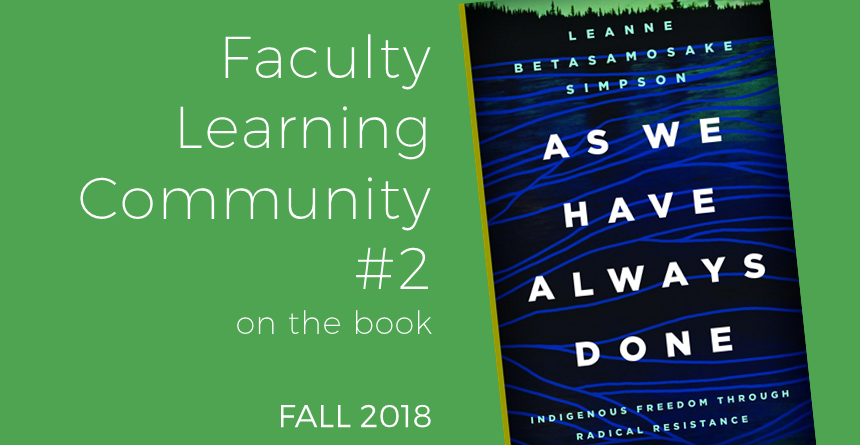
-
18FQ FLC 2 - As we have always done - details
-
Faculty Learning Community #2:
As We Have Always DoneIn preparation for Leanne Betasamosake Simpson's visit to Seattle U on January 11th, you are invited to join a Learning Community focused on the role of the academy in Indigenous liberation, facilitated by Christina Roberts (English Department/Indigenous Peoples Institute).
Over the course of four sessions, we will read Simpson's recent award-winning book, As We Have Always Done: Indigenous Freedom Through Radical Resistance, and 3-4 articles and book chapters that address settler colonialism, decolonization, and Indigenous resistance.
What's in it for you?
In this Learning Community, you'll share timely dialogue with colleagues as you learn more about the destructive logics of the settler colonial state. You'll also consider the role the academy and researchers play in the dispossession of Indigenous peoples from their lands so as to challenge the legacies of these damaging frameworks.
Who is it suited to?
This particular Learning Community is open to any faculty member who works with Indigenous communities or who'd like learn more about decolonizing classrooms, research practices, and lands.
What are the dates?
The four dates in Fall Quarter are
- Mon, Oct 22 | 12:30-2:00 | Xavier 160 (Indigenous Peoples Institute)
- Mon, Nov 5 | 12:30-2:00 | Xavier 160 (Indigenous Peoples Institute)
- Mon, Nov 26 | 12:30-2:00 | Xavier 160 (Indigenous Peoples Institute)
- Mon, Dec 10 | 12:30-2:00 | Xavier 160 (Indigenous Peoples Institute)
How to register
Registration is now closed
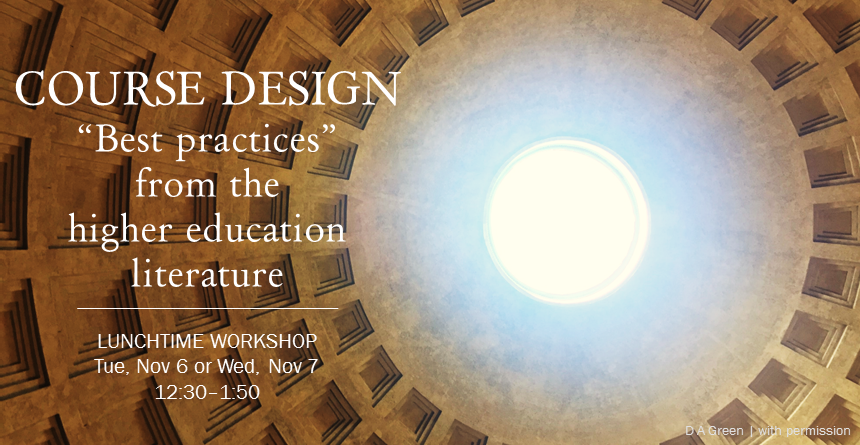
-
18FQ Course design: Best practices - details
-
Course Design: “Best Practices” from the higher education literature
LUNCHTIME WORKSHOP
Tue, Nov 6 | 12:30–2:00 | STCN 210 | Lunch provided
OR
Wed, Nov 7 | 12:30–2:00 | STCN 210 | Lunch provided
Facilitated by Katherine RaichleDesigning (or redesigning) a course can be overwhelming, and we are often unsure where to begin. What content should I include in my course? What do I want my students to do with the content in the course, and beyond? How will I assess my students?
In this workshop, we will address these questions. You will learn how to create an overarching course structure informed by the “constructive alignment” model of course design from the higher education literature. This model provides a road map for course design that clearly aligns the outcomes that you have identified for the course (learning outcomes) with relevant learning and teaching activities and graded assignments.
This type of course design will provide a clear and manageable structure for you and your students in the course, as well as promoting their best learning. You’ll leave the workshop having made concrete progress in designing and/or redesigning a course.
In this workshop, you will learn how to:
- identify suitable learning outcomes for your course.
- design activities that link with your learning outcomes.
- develop graded assignments that align with your learning outcomes.
- align all of the above under a coherent course design structure.
If you are thinking of redesigning an existing course, please bring the current syllabus and any assignments with you.
-
19WQ Leanne Betasamosake Simpson - details
-
Consent in education and land as pedagogy: A faculty conversation with Leanne Betasamosake Simpson
ROUNDTABLE DISCUSSION
Fri, Jan 11 | 12:30-1:50 | Casey Commons (CASY 530)
Co-sponsored with the Indigenous Peoples InstituteJoin us for a conversation on Indigenous theory, practice, thinking, and pedagogy with Leanne Betasamosake Simpson – an acclaimed Michi Saagiig Nishnaabeg scholar, writer, and artist, who has been widely recognized as one of the most compelling Indigenous voices of her generation.
Working for over a decade as an independent scholar using Nishnaabeg intellectual practices, Leanne is currently a Distinguished Visiting Scholar in the Faculty of Arts at Ryerson University, Toronto, and faculty at the Dechinta Centre for Research & Learning in Denendeh. She holds a PhD from the University of Manitoba.
Registration is now closed. [Please note: This is a separate registration form as the event is so early in the quarter]
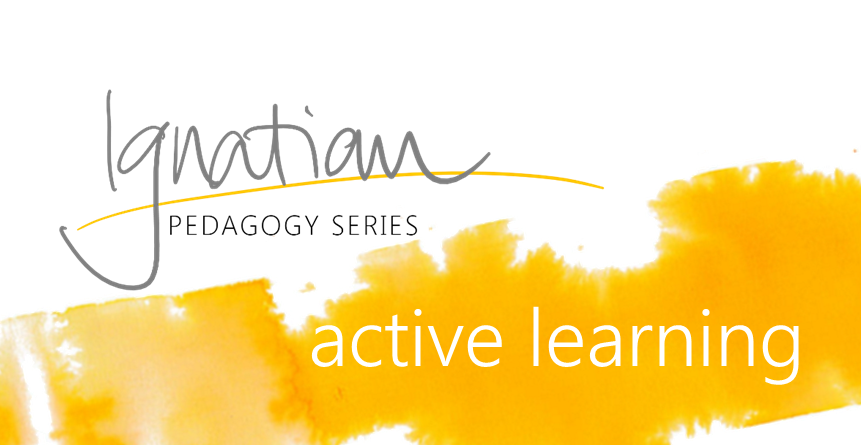
-
19WQ IPS I: Active Learning - details
-
Ignatian Pedagogy Series: Active Learning
In this module of the series, participants will …
- Explore how active learning is supported both in the higher education literature and in Ignatian Pedagogy.
- Experiment with a range of active learning approaches as both a student and a teacher.
- Examine active learning as a vehicle for transformative learning.
- Reflect on the experience of new active learning strategies.
- Develop concrete plans to embed active learning strategies in future courses.
What are the dates?
- Monday, January 14 | 2:00–5:00 | Hunthausen 110 (room provisional)
- Monday, February 4 | 2:00–5:00 | Hunthausen 110 (room provisional)
- Monday, March 4 | 2:00–5:00 | Hunthausen 110 (room provisional)
Refreshments are provided at each session, with support from the Endowed Mission Fund.
Who is facilitating the module?
The entire series is co-directed by David Green of the Center for Faculty Development and Jen Tilghman-Havens of the Center for Jesuit Education. They are atheist and Catholic, respectively, and both share a passion for this transformative educational approach.
Joining them in this module are Jenny Loertscher (Center for Jesuit Education/Chemistry) and Katherine Raichle (Center for Faculty Development/Psychology).
How do I apply?
Please complete our online application form at [Applications are now closed].
Fifteen spaces are available.
Applications close at 09:00 PST on Monday, December 3. Early application is encouraged!
We will notify all applicants of their participation by Monday, December 10.
Please be sure to block off the three sessions in your calendar when you apply so that you are definitely available.
What if I have questions?
If you have any questions about the Ignatian Pedagogy Series, please email faculty-development@seattleu.edu or call David Green (206-296-5386) or Jen Tilghman-Havens (206-296-2335).
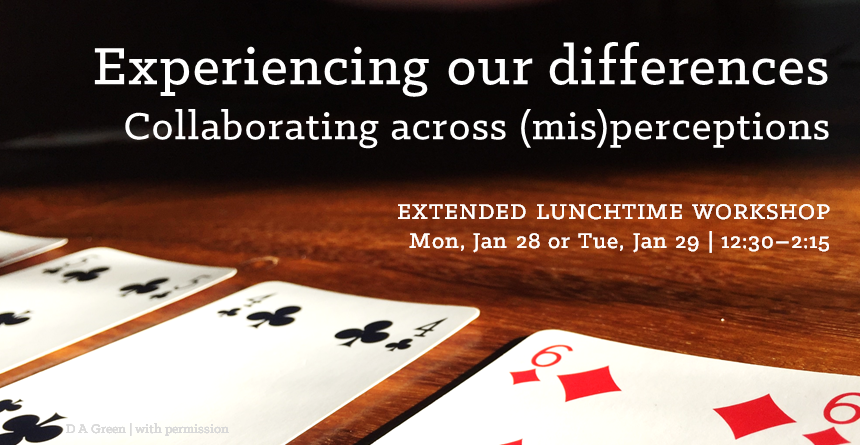
-
19WQ Experiencing our differences - details
-
Experiencing our differences: Collaborating across (mis)perceptions
EXTENDED LUNCHTIME WORKSHOP
Mon 28 or Tue 29 Jan | 12:30-2:15 | Lunch provided
Facilitated by Angelique Jenkins, Director of Learning Assistance ProgramsWhenever groups of people come together – such as in our classrooms – complications can arise, bringing to the surface emotions and behaviors that may make it difficult to progress with the task at hand. This workshop simulates that kind of experience to help us think through strategies for moving forward, as well as tools and ideas for interacting effectively and with awareness of others who are different from us.
The activity serves as an insightful analogy for the subtle and overt learning that takes place in our classrooms on a daily basis and will impact how you approach your teaching in the future.
Registration is now closed.
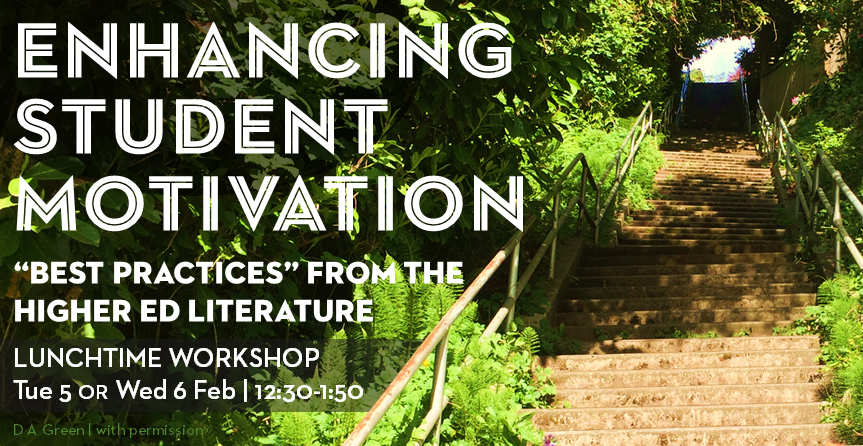
-
19WQ Enhancing student motivation - details
-
Enhancing student motivation: "Best practices" from the higher education literature
LUNCHTIME WORKSHOP
Tue 5 or Wed 6 Feb | 12:30-1:50 | Lunch provided
Facilitated by Katherine RaichleAs disciplinary experts, it is obvious to us why our subject areas and our courses matter. We all too easily forget the perspectives we had when we were students or struggle to imagine the experience of students who are not majoring in our fields. That disconnect can often leave us frustrated and wondering “Why are my students not more motivated to engage with my wonderful course material?”
Naturally, students have numerous competing interests and obligations outside of class that will influence their motivation. Yet we also know that the environment of the classroom and elements of our curriculum can impact students’ motivation, too.
In this workshop, we will explore several of these classroom and curricular factors, how you can readily put them into practice now, and how to build them into future courses from the beginning. With different approaches, we can help our students engage with our class material more deeply.
By the end of this workshop you will:
- Better understand what factors can influence students’ motivation
- Identify several practical changes that you could put in place immediately
- Consider how to structure future courses to enhance motivation from the outset
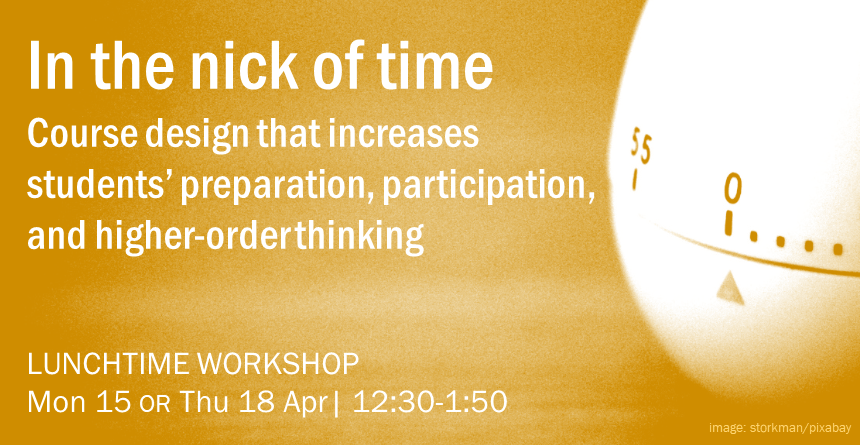
-
19SQ In the nick of time - details
-
In the nick of time: Course design that increases students’ preparation, participation, and higher-order thinking
LUNCHTIME WORKSHOP
Mon, Apr 15 (HUNT 100) or Thu, Apr 18 (STCN 210) | 12:30–1:50 | Lunch provided
Facilitated by David GreenHow do we increase the likelihood that students come to class well-prepared and ready to engage and learn together? And how do we ensure that we use class time to help students process the material that they find hardest to grasp?
In this workshop, we’ll work together to explore one approach to course design that seeks to address these questions constructively. This approach, called “Just-in-Time Teaching” or “Thinking About the Readings,” focuses class time on the sticking points in the curriculum by creating a straightforward feedback loop between you and your students, requiring students to think about—and give feedback on—the reading/class preparation in advance of class, and helping you discover where their energies are best concentrated to enable them to move forward intellectually.
During the workshop, you’ll have the chance to focus on a specific class in one of your courses so that by the end, you’ll have devised some strategies and questions that will allow you to experiment with this learning-focused approach in the near future.
Please remember to bring a syllabus and/or class notes for a specific class session with you.
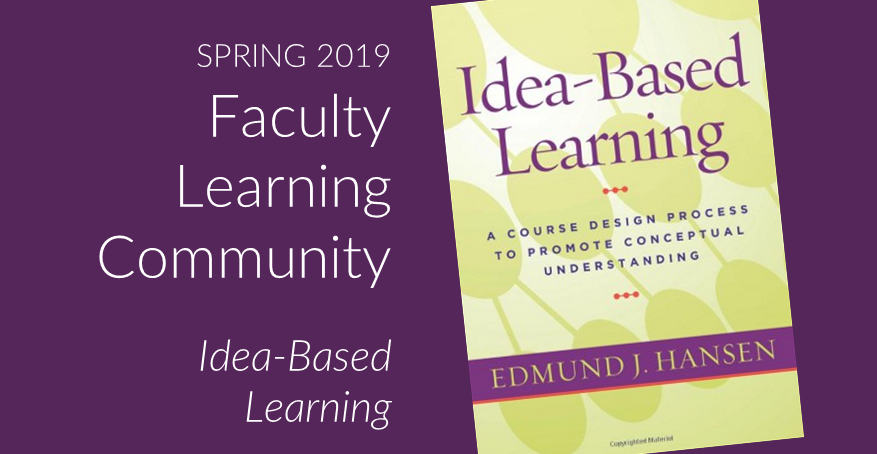
-
19SQ FLC - Idea-based learning - details
-
Faculty Learning Community:
Idea-based learning: A course design process to promote conceptual understandingHow do you systematically design a course so that it truly promotes deep learning and the kinds of critical thinking we espouse in academia? Edmund Hansen’s Idea-Based Learning provides a step-by-step process for thinking about and designing a course, focusing on key elements that will help maximize our students’ potential.
In this four-session Faculty Learning Community in the spring, we will progress through the chapters and develop or revise our own courses following Hansen’s recommendations, and we’ll discuss the sticking points and epiphanies we discover along the way.
How might you benefit from this FLC?
Over the four sessions, facilitated by Katherine Raichle (Center for Faculty Development), this book and our discussions will help you:
- Reconceptualize your discipline based on big ideas, not just a series of topics
- Develop a strong, but flexible, course structure
- Produce longer-lasting learning in our students
- Practice following a scholarly process that you can use for any future course design work
Who is it suited to?
This community is for any faculty member who is either designing a new course or revising an existing one.
What are the dates?
The four dates in Spring Quarter are
- Tue, Apr 30 | 1:30–2:45 | Wismer Room (LOYA 400) | Coffee/tea provided
- Tue, May 14 | 1:30–2:45 | Wismer Room (LOYA 400) | Coffee/tea provided
- Tue, May 28 | 1:30–2:45 | Wismer Room (LOYA 400) | Coffee/tea provided
- Tue, Jun 11 | 1:30–2:45 | CHDN 124 | Coffee/tea provided
How to register
Registration is now closed.
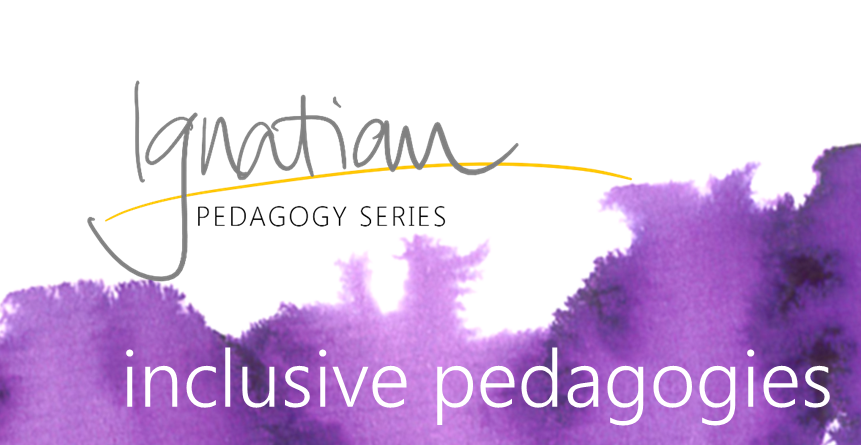
-
19SQ IPS III: Inclusive pedagogies - details
-
Ignatian Pedagogy Series: Inclusive Pedagogies
In this module of the series, participants will …
- Explore what the higher education literature and Ignatian pedagogical principles teach us about inclusive pedagogies.
- Experiment with a range of inclusive approaches to pedagogy as both a student and a teacher.
- Apply a critical lens to course content and classroom climate.
- Reflect on our own approaches to the experience of new pedagogical strategies.
- Develop concrete plans to embed transparently inclusive pedagogies in future courses.
What are the dates?
- Friday, May 10 | 2:00–5:00 | Hunthausen 110
- Friday, May 17 | 2:00–5:00 | Hunthausen 100
- Friday, June 7 | 2:00–5:00 | Hunthausen 100
Refreshments are provided at each session, with support from the Endowed Mission Fund.
Who is facilitating the module?
The entire series is co-directed by David Green of the Center for Faculty Development and Jen Tilghman-Havens of the Center for Jesuit Education. They are atheist and Catholic, respectively, and both share a passion for this transformative educational approach.
Joining them in this module are Holly Slay Ferraro (Management/Center for Faculty Development) and Katherine Raichle (Center for Faculty Development/Psychology).
How do I apply?
Please complete our online application form at [Applications are now closed].
Fifteen spaces are available.
Applications close at 09:00 PST on Monday, April 29.
We will notify all applicants of their participation by Thursday, May 2.
Please be sure to block off the three sessions in your calendar when you apply so that you are definitely available.
What if I have questions?
If you have any questions about the Ignatian Pedagogy Series, please email faculty-development@seattleu.edu or call David Green (206-296-5386) or Jen Tilghman-Havens (206-296-2335).
2017–18
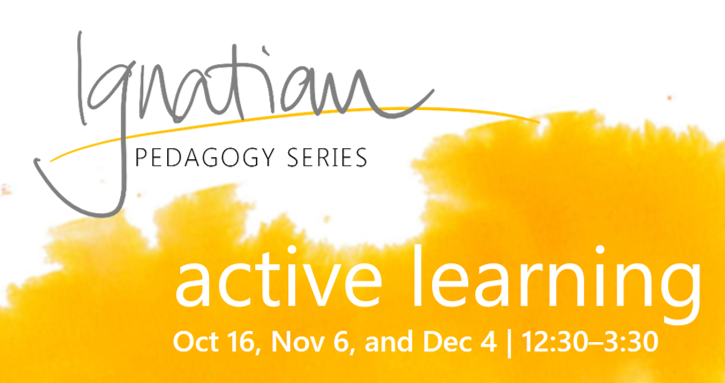
-
17FQ IPS I: Active learning - details
-
Ignatian Pedagogy Series: Active Learning
In this first module of the series, participants will …
- Explore how active learning is supported both in the higher education literature and in Ignatian Pedagogy.
- Experiment with a range of active learning approaches as both a student and a teacher.
- Examine active learning as a vehicle for transformative learning.
- Reflect on the experience of new active learning strategies.
- Develop concrete plans to embed active learning strategies in future courses.
What are the dates?
Monday, October 16 | 12:30–3:30 | Hunthausen 110
Monday, November 6 | 12:30–3:30 | Hunthausen 110
Monday, December 4 | 12:30–3:30 | Hunthausen 110
Lunch and refreshments are provided at each session, with support from the Endowed Mission Fund.
Who is facilitating the module?
The entire series is co-directed by David Green of the Center for Faculty Development and Jen Tilghman-Havens of the Center for Jesuit Education. They are atheist and Catholic, respectively, and both share a passion for this transformative educational approach.
Joining them in this module are Jenny Loertscher (Chemistry), Catherine Punsalan-Manlimos (Institute for Catholic Thought & Culture), and Katherine Raichle (Center for Faculty Development/Psychology).
How do I apply?
Fifteen spaces are available.
To apply, please complete the application form at [Applications are now closed] by noon on Monday, September 25.
We will notify all applicants of their participation by Monday, October 2.
Please be sure to block off the three sessions in your calendar when you apply so that you are definitely available.
What if I have questions?
If you have any questions about the Ignatian Pedagogy Series, please email faculty-development@seattleu.edu or call David Green (206-296-5386) or Jen Tilghman-Havens (206-296-2335).
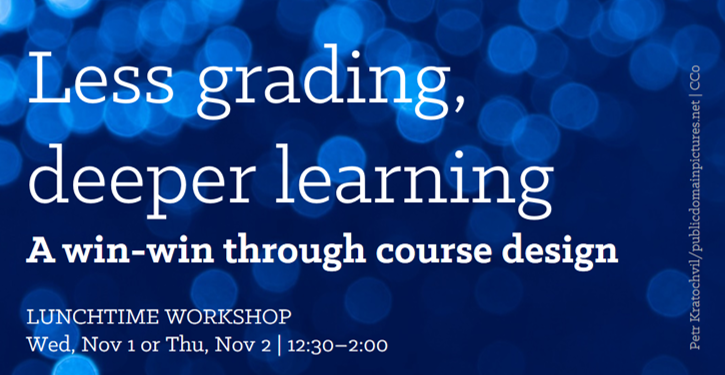
-
17FQ Less grading, deeper learning - details
-
Less grading, deeper learning: a win-win through course design
LUNCHTIME WORKSHOP
Wed, Nov 1 OR Thu, Nov 2 | 12:30–2:00 | Chardin 142
Facilitated by Katherine RaichleDiscover the counterintuitive relationship between the number of graded assignments and the quality of learning. Research shows that students take deeper approaches to learning when they don’t feel overloaded with course content or with a stressful barrage of assignments in a course. With the right design, fewer graded assignments with higher point values can lead to a richer learning experience for your students.
In this workshop, you’ll have chance to focus on one of your own courses to work out what combination of course design adjustments could help your students take a deeper approach to the subject while reducing your grading. The suggestions you’ll explore will address concerns about superficial learning, an inability to transfer knowledge to new areas, perceived busywork, and an overemphasis on grades earned rather than the content learned. You’ll leave the workshop with your own list of priorities to help improve the learning environment in your classes.
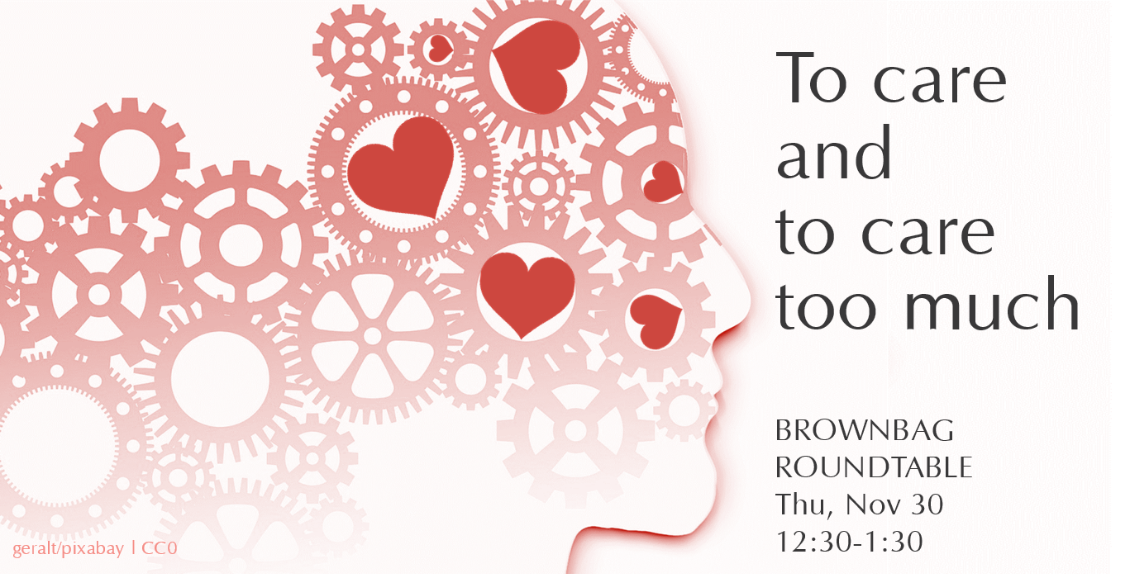
-
17FQ To care and to care too much - details
-
The Consortium of Interdisciplinary Scholars and the Center for Faculty Development invite you to attend
To care and to care too much: What is the right zone of care for students?
BROWNBAG LUNCH, PANEL DISCUSSION, & AUDIENCE ROUNDTABLE
Thu, Nov 30 | 12:30–1:30 | STCN 130
Co-sponsored by Interdisciplinary Liberal Studies and the Center for Faculty DevelopmentIt seems reasonable that caring for others is a moral duty. "Care" is enshrined as the first value in the SU Mission. Is there a disciplinary basis for drawing the line between too much care (if that’s possible) and neglect? How do SU Schools and Colleges – faculty and staff – determine and practice the right zone of care? Where is the boundary between my care for our students and my care for myself?
Panelists:
Paulette Kidder, PhD | Interim Dean of Matteo Ricci College and Associate Professor of Philosophy, College of Arts & Sciences
Kevin Krycka, PsyD | Associate Dean and Professor of Psychology, College of Arts & Sciences
Christina Roberts, PhD | Associate Professor, English, and Women and Gender Studies, College of Arts & Sciences, and Director, Indigenous Peoples Institute
Kristen M Swanson RN, PhD, FAAN | Dean and Professor, College of Nursing
Moderator:
David Green, PhD | Director, Center for Faculty Development & Affiliated faculty, International Studies, College of Arts & Sciences
Bring lunch if you'd like. Coffee, tea, water provided. No RSVP required. For more information, contact Sven Arvidson (Interdisciplinary Liberal Studies)
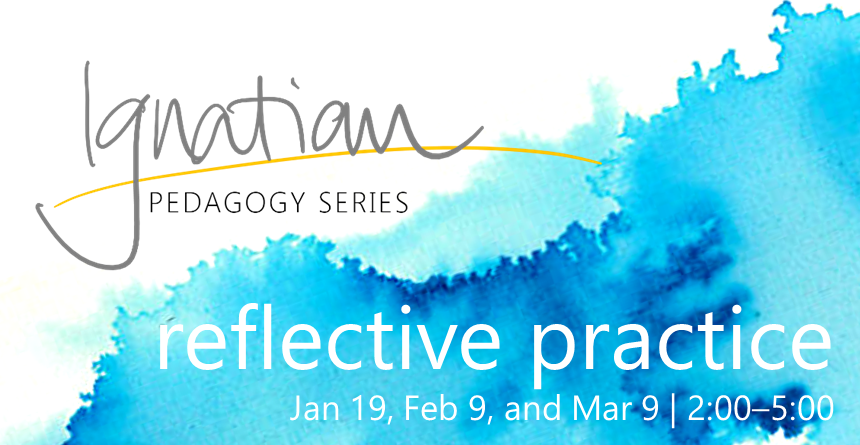
-
18WQ IPS II: Reflective Practice - details
-
Ignatian Pedagogy Series II: Reflective practice
In this second module of the series, participants will …
- Discover why reflection is an integral part of Ignatian pedagogy
- Explore models for thinking about reflective practice, both as an instructor and in your students’ learning
- Learn ways to use reflection for multiple purposes
- Consider methods of effectively assessing reflection
What are the dates?
- Friday, January 19 | 2:00–5:00 | Pigott 204
- Friday, February 9 | 2:00–5:00 | Student Center 130
- Friday, March 9 | 2:00–5:00 | Student Center 130
Refreshments and appetizers are provided at each session, with support from the Endowed Mission Fund.
Who is facilitating the module?
The entire series is co-directed by David Green of the Center for Faculty Development and Jen Tilghman-Havens of the Center for Jesuit Education. They are atheist and Catholic, respectively, and both share a passion for this transformative educational approach.
Joining them in this module are Catherine Punsalan-Manlimos (Institute for Catholic Thought & Culture/Theology & Religious Studies), Katherine Raichle (Center for Faculty Development/Psychology), and Jen Schulz (Interdisciplinary Liberal Studies/Psychology/English).
How do I apply?
Fifteen spaces are available.
To apply, please complete the application form at https://www.surveymonkey.com/r/C7TFTHS by noon on Friday, December 8.
We will notify all applicants of their participation by Monday, December 18.
Please be sure to block off the three sessions in your calendar when you apply so that you are definitely available.
What if I have questions?
If you have any questions about the Ignatian Pedagogy Series, please email faculty-development@seattleu.edu or call David Green (206-296-5386) or Jen Tilghman-Havens (206-296-2335).
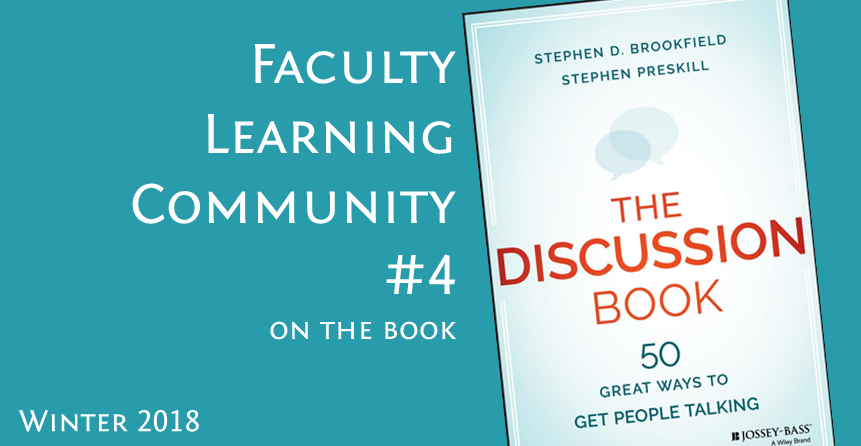
-
18WQ FLC 4 - The Discussion Book - details
-
Faculty Learning Community
The Discussion Book: 50 Great Ways to Get People Talking
Co-sponsored by the Center for Digital Learning & Innovation (CDLI)
Are you looking for new ways to get your students engaged in class discussions, to make sure that everyone gets heard, and to keep the conversation energized without going off-topic? If so this faculty learning community may be just what you are looking for. In their recent book, Stephen Brookfield and Stephen Preskill acknowledge and unpack the various ways that discussions often fail. They then offer 50 techniques to set up successful discussions depending on the setting. For every technique the authors cover: how it works; when and where it works well; what users appreciate; and what to watch out for.
This Learning Community will be facilitated by the Center for Faculty Development and the Center for Digital Learning & Innovation. During each session we will test out at least two of the techniques in the book and make notes about what worked and what didn’t. Between sessions we will also explore how those same techniques work when translated into online formats.
What's in it for you?
During these sessions, we’ll explore techniques—both in class and online—that:
- Get students to engage more fully in discussions
- Democratize participation
- Foster active listening
- Get students out of their comfort zone
- Keep students focused on important topics, contentious issues, and key questions—instead of getting diverted by trivia or avoidance
- Spur creativity so students are actively asking unusual questions, uncovering new perspectives, and proposing novel solutions
- Increase genuine collaboration and teamwork, right from the outset of the course
Who is it suited to?
This community is for any faculty member who is interested in learning how to improve their discussions either in the classroom, online, or both. Consider joining us If you would like to explore quick and easy techniques to get students talking, keep them focused on the topic, and fully engaged.
The Discussion Book is 260 pages long and covers 50 discussion strategies. We will focus on two strategies each session.
What are the dates?
The dates in Winter Quarter 2018 are:
- Fri, Jan 26 | 10:30–11:30 | CDLI Lab (PAVL 050)
- Fri, Feb 9 | 10:30–11:30 | CDLI Lab (PAVL 050
- Fri, Feb 23 | 10:30–11:30 | CDLI Lab (PAVL 050)
- Fri, Mar 9 | 10:30–11:30 | CDLI Lab (PAVL 050)
How to register
Registration is now closed.
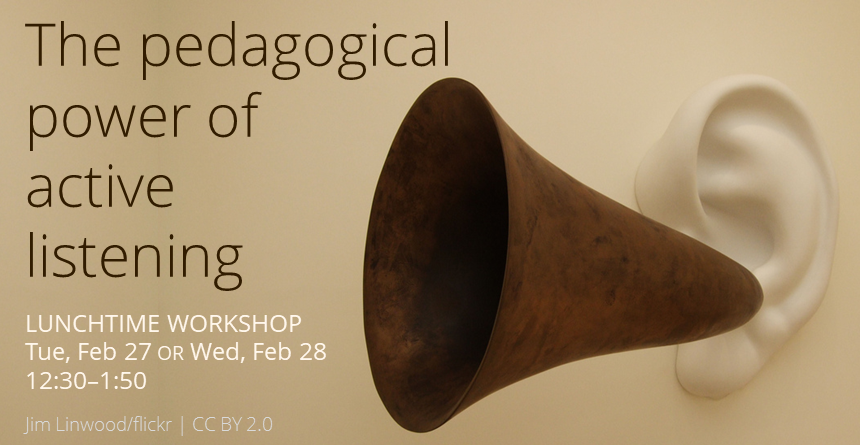
-
18WQ Pedagogical power of active listening - details
-
The Pedagogical Power of Active Listening
LUNCHTIME WORKSHOP
Tue, Feb 27 | 12:30–2:00 | Hunthausen 100| Lunch provided
OR
Wed, Feb 28 | 12:30–2:00 | Casey Commons | Lunch providedFacilitated by Katherine Raichle
Many of us at SU already use discussion as a key component of our classes, not only to ensure our students’ grasp of a topic, but also to invite new perspectives to enrich understanding. An often overlooked element of class discussion – one that has little to do with what is said – is instrumental and necessary for fostering respectful and rich dialogue among students: Listening.
Most people listen with the intent to reply. What if we instead taught and modeled for our students the power of listening to understand?
Active listening is an effective, powerful, and inconspicuous pedagogical tool for deepening discussion, yet it can be deceptively difficult to put into practice.
In this lunchtime workshop, we will explore:
- What is active listening?
- What are the pedagogical advantages of active listening?
- How can you model active listening for your students?
- How can you teach your students active listening?
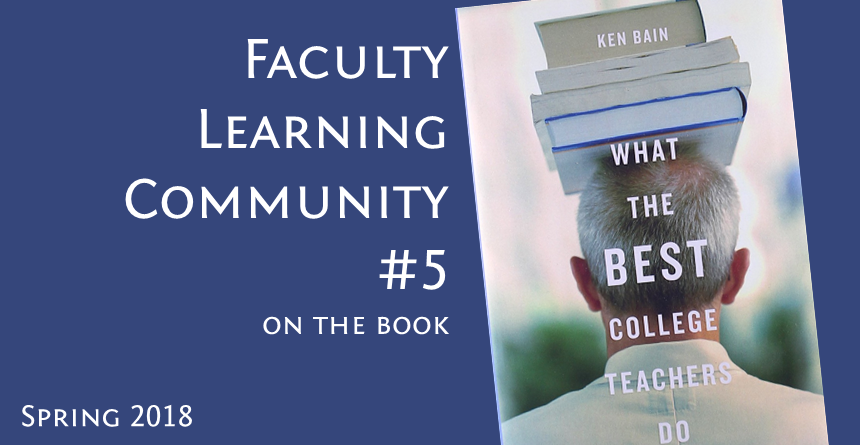
-
18SQ FLC 5 - What the best college teachers do - details
-
Faculty Learning Community
What the Best College Teachers Do
Are you interested in exploring the key characteristics of the most effective college teachers? What do these teachers know and what do they do to challenge their students to achieve their deepest potential? Ken Bain’s What the Best College Teachers Do explores the findings of a 15-year study of almost 100 college teachers, representing numerous academic disciplines and universities, to answer these questions.
In this three-session Learning Community facilitated by Katherine Raichle (Department of Psychology and Associate Director of Leaning and Teaching) in the spring quarter, you'll work your way through Bain’s book, gaining valuable insight into the myriad ways that highly effective college teachers approach their students, scaffold their lessons and classrooms, and design their courses.
What's in it for you?
Over the four sessions, you'll learn how to:
- How the author defines “the best” college teachers.
- How the best college teachers enhance the learning climate of their classrooms, inspire their students, and ultimately further learning outcomes
- How to recognize the ways that you are already successfully reaching your students, as well as how you can deepen these approaches.
- How to incorporate new strategies in your courses to enhance learning.
Who is it suited to?
This community is for any faculty member who is interested in learning how to improve their learning and teaching practices.
What are the dates?
The four dates in Spring Quarter are:
- Fri, Apr 13 | 11:00-12:15 | Wismer Room (LOYA 400)
- Fri, May 4 | 11:00-12:15 | Wismer Room (LOYA 400)
- Fri, May 25 | 11:00-12:15 | Wismer Room (LOYA 400)
How to register
Registration is now closed.
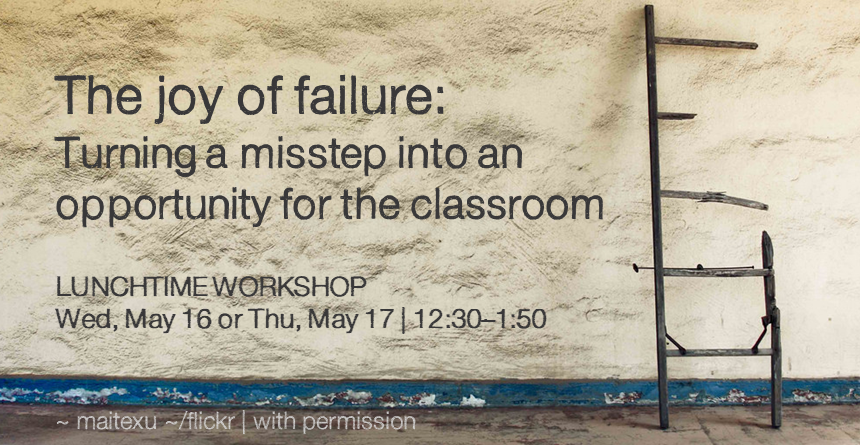
-
18SQ The joy of failure - details
-
The joy of failure: Turning a misstep into an opportunity for the classroom
LUNCHTIME WORKSHOP
Wed, May 16 | 12:30–1:50 | Student Center 130 | Lunch provided
OR
Thu, May 17 | 12:30–1:50 | Casey Commons | Lunch provided
Facilitated by Katherine RaichleFaculty often seek consultation following an in-class misstep, expressing embarrassment as well as uncertainty about if, and how, to best address it with their students. Sometimes those missteps are content-related or terminological, at other times they are interpersonal issues or are matters of how we facilitated a situation in class. No matter how major or minor they may appear on the outside, these mistakes and missteps can easily challenge our confidence in class.
So how can we turn what we might see as personal “failures” into valuable learning opportunities for ourselves and our students? In this workshop we will address how to:
- recognize when we have made a mistake in our classrooms.
- ascertain when such a mistake needs to be addressed with our students.
- identify different ways to respond to such mistakes.
- identify constructive responses to mistakes that will foster learning opportunities for us and our students.
Mistakes are human, and we all make them, yet it can feel uncomfortable to take ownership of our missteps with our students. What if we modeled for them the value in recognizing and learning from “failing,” and demonstrated our own humanity in the process?
2016-17
Spring 2017
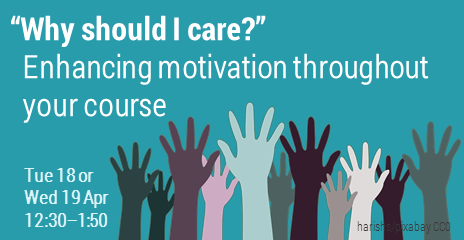
“Why should I care?” Enhancing motivation throughout your course
LUNCHTIME WORKSHOP
Tue, Apr 18
OR
Wed, Apr 19 | 12:30–1:50 | Casey Commons | Lunch provided
Facilitated by Katherine Raichle
Do you sometimes wish that your students would be more motivated to engage with course material? It may be obvious to you why they should care, so why aren’t they more interested?
Students have numerous competing interests and obligations outside of class that undoubtedly influence motivation. At the same time, though, we know that the environment of the classroom and elements of one’s curriculum can also have an impact on student motivation. In this workshop we will explore several of these classroom and curricular factors and how you can readily put them to practice.
By the end of this workshop you will:
- Better understand what factors can influence students’ motivation
- Identify several practical changes that you could put in place immediately
- Consider how to structure future courses to enhance motivation from the outset
Request a consultation on this topic.
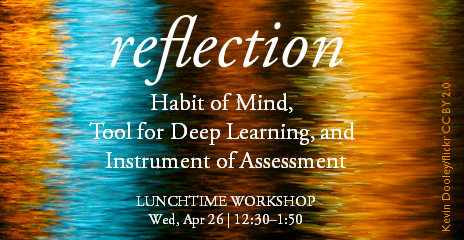
Reflection—Habit of mind, tool for deep learning, and instrument of assessment
LUNCHTIME WORKSHOP
Wednesday, April 26 | 12:30-1:50 | Casey Commons | Lunch provided
Facilitated by June Johnson Bube (Core Writing Consultant and Director of Writing Studies)
Co-sponsored by University Core
We know a lot about reflection. Reflection fosters deep learning by promoting metacognition, synthesis, and the transfer of knowledge from one situation to another. It plays a role in disciplinary ways of knowing and doing. Furthermore, reflective thinking and writing are embedded in Seattle University’s Core and Undergraduate learning objectives as skills and values, and as reflective scholar-teachers ourselves, we all believe in reflection’s pedagogical value.
Yet, even with this consensus, questions remain:
- How do we construct good reflective writing assignments and teach this habit of mind?
- Knowing that students need guidance and practice in writing reflectively, how do we help students acquire this tool for self-assessment of their learning?
- How can we design and integrate reflection assignments so that they serve as assessment instruments?
- Would it be worthwhile to have a common set of expectations, specific learning objectives, and assignment guidelines?
This workshop will focus on these questions. Using several short assignments as a departure point, we will discuss topics from among the key concepts in reflective pedagogy, such as: metacognitive reflection versus discernment reflection; reflection versus reflexivity; reflection as a mode of thinking, not a genre; earning insights through introspection and critical analysis; adopting provisional, dialogic thinking; appreciating ambiguity and delaying closure; and achieving self-understanding. We will share how we use reflection in our classes. As a group, we will brainstorm strategies for formalizing and scaffolding our teaching of reflection. We will discuss whether it would be worthwhile to have a common set of expectations, specific learning objectives, and assignment guidelines. Several rubrics for reflective writing will be distributed for pedagogical adaptation and innovation.
Request a consultation on this topic.
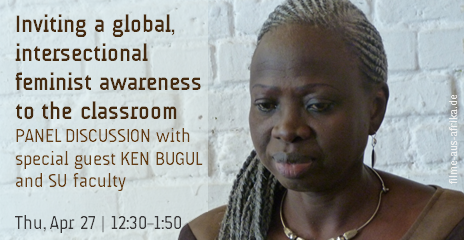
Inviting a global, intersectional feminist awareness to the classroom
With special guest, Ken Bugul, and SU faculty
PANEL DISCUSSION
Thu, Apr 27 | 12:30-1:50 | Casey Commons | Lunch provided
Facilitated by Christina Roberts, English
Co-sponsored by SU’s Indigenous Peoples Institute
Join SU faculty and special guest Ken Bugul in a discussion about global, intersectional feminisms.
This dynamic panel of educators and scholars will interrogate cultural biases, reflect upon their own values and assumptions, and consider how we can be intersectional in our conversations, classrooms, and in our engagements around social justice.
Ken Bugul is a Senegalese writer who, in novel after novel for the past thirty years, has painted a picture of her life as a woman, of her loves, of the relationship between her continent of Africa and the West. “To write”, she says, “is to dazzle the senses, and the senses are colourless.” She is the subject of the 2013 film, Ken Bugul: Nobody Wants Her, directed by Silvia Voser.
Request a consultation on this topic.
Winter 2017
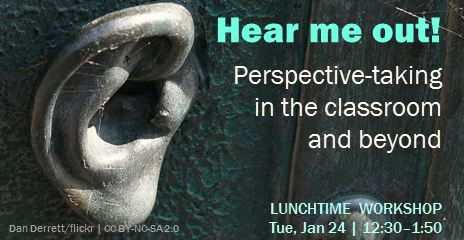
Hear me out! Perspective-taking in the classroom and beyond
LUNCHTIME WORKSHOP
Tue, Jan 24 | 12:30-1:50 | Casey Commons | Lunch provided
Facilitated by Holly Slay Ferraro | Albers
Education is a collaborative experience. Yet think back on some of your educational experiences: As a student or faculty member, have there been times when you resisted sharing your opinion for fear of how others in the room would respond? Conversely, were there times when someone shared an opinion and you didn’t really listen because it was at odds with your own? Do you find this behavior replicated in meetings or in other venues where the ostensible goal is learning and sharing?
You are invited to engage in a workshop on perspective-taking if the answer to any of these questions is “Yes, I’ve been in that classroom/meeting!” In this workshop, we’ll look at how identity impacts perspective-taking. That is, how might our values and how we want to be viewed by others get in the way of listening and speaking? We’ll also look at how asking questions helps us to better understand others and to be understood by them.
Finally, we’ll develop strategies to help students meaningfully exchange perspectives. Our goal is to better equip ourselves and our students to create inclusive classrooms where important discourse can happen.
Request a consultation on this topic.
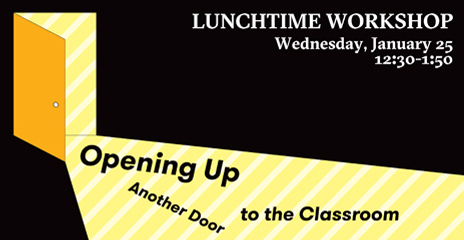
Opening up another door to the classroom: Inviting our selves and our students into the authentic play of dialogue and research
LUNCHTIME WORKSHOP
Wed, Jan 25 | 12:30-1:50 | Casey Commons | Lunch provided
Facilitated by Jennifer Schulz | Arts & Sciences
As you walk through the door into your classroom, are you ever afraid of what Parker Palmer calls, “the judgment of the young?” Speaking in the voice of the students, Palmer fearfully imagines them thinking: “We are here only because we are forced to be here. So, whatever you have to do, get it over with, and let us get on with our lives” (from Courage to Teach 48). If this sounds familiar, now consider what your students imagine you are thinking about them.
The problem is that misperception becomes expectation, which gets in the way of genuine experience in the classroom. And how do we do lab research, analyze a poem, debate the sociology of media and political campaigns in a shared, exciting, and generative way - that is, “make something happen” - when we have such a short time in which to overcome these expectations?
This workshop offers an example of how to open that other door into your classroom through which expectations (and anxieties) can give way to present and creative experience.
Drawing from a growing body of research on the importance of attending to emotional (alongside intellectual and social) dimensions of learning in a college classroom as well as from phenomenologist Hans Georg Gadamer’s discussion of play and genuine dialogue, this workshop presents a framework for thinking about how to foster curiosity among students and between students and faculty. This culture of curiosity sparks, in turn, a collaborative approach to learning that is driven by listening, finding a shared language, and using this shared language to launch new discoveries: all crucial practices in the research process.
Come to this workshop ready to suspend critical thinking and analysis (at least for the moment) and engage in a process of creative play in which no one knows more than anyone else, in which we can’t predict what will happen, and in which we will all be in it together.
Request a consultation on this topic.
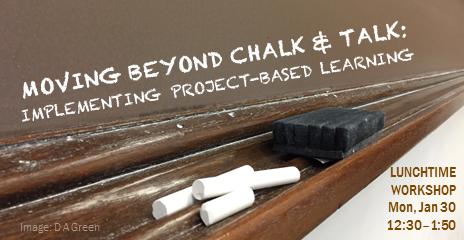
Moving beyond chalk and talk: Implementing project-based learning
LUNCHTIME WORKSHOP
Mon, Jan 30 | 12:30-1:50 | Casey Commons | Lunch provided
Facilitated by Katherine Raichle | Arts & Sciences
Do you sometimes wish that your students would be more motivated to engage with the course material? Are you struggling to identify how to deepen student learning of course content? Perhaps you are seeking new ways to bridge the gap between course content and application?
Project-Based Learning (PBL) is an effective pedagogical tool that has been shown to increase student engagement, motivation, application of course material, and enhanced critical thinking skills. Moreover, there is also evidence that PBL enhances instructor satisfaction of course delivery.
What is PBL? PBL involves guiding students through a quarter-long project specifically aimed to further your students’ understanding of an identified discipline-specific challenge, content area, and/or skill. A PBL project could include addressing a real-world question within your field or furthering and deepening students’ understanding of a particular theoretical model, to name only a couple examples.
By the end of this workshop you will:
- Better understand Project-based Learning (PBL),
- Better understand its pedagogical advantages,
- Cover an example of its implementation,
- Vet a class of your own that you would like to consider for PBL.
Request a consultation on this topic.
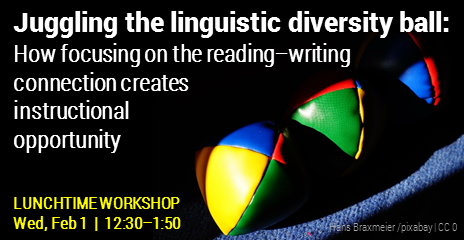
Juggling the linguistic diversity ball: How focusing on the reading–writing connection creates instructional opportunity
LUNCHTIME WORKSHOP
Wed, Feb 1 | 12:30–1:50 | Casey Commons | Lunch provided
Facilitated by Dr. June Johnson Bube (Core Writing Consultant and Director of Writing Studies)
Co-sponsored by the University Core
Sometimes faculty teaching in the Core may feel as though we are juggling too many balls at once: delivering our content-rich Core courses; teaching to the Core’s complex learning objectives for our students’ growth as writers; and meeting the learning needs of our culturally and linguistically diverse students.
While all our students face the academic literacy challenges of managing hefty reading assignments with difficult vocabulary in preparation for writing in the disciplines, these challenges loom larger for our multilingual students. For us, juggling that third ball—that is, providing appropriate instructional help for these students—may feel daunting at times.
Research in writing across the curriculum and game-changing policy statements advocate a culturally sensitive, respectful pedagogy that rejects a difference-as-deficit model (focus on linguistic errors). To help us re-envision our task, scholar-teachers in second language writing offer useful instructional strategies. Perhaps the best news from this research is that, rather than increasing our instructional load, adapting teaching strategies for students working in a second or other language actually makes us more effective in teaching ALL of our students.
One main instructional strategy targets the reading–writing connection. As Dana Ferris and John Hedgcock write in Teaching L2 Composition: Purpose, Process, and Practice (2014) “One cannot successfully teach writing without simultaneously teaching reading” (94). In this workshop, we will explore several of these instructional strategies: attention to the microskills of reading competency and focus on write-to-read and write-to-learn activities. Incorporating these strategies as part of your assignment scaffolding will benefit not only your multilingual students, but all of them.
Request a consultation on this topic.
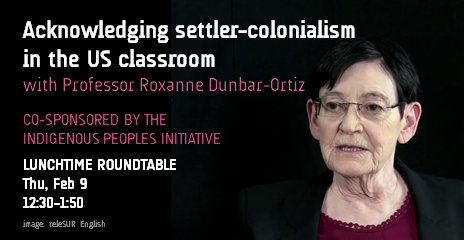
Acknowledging settler-colonialism in the classroom
GUEST SPEAKER DISCUSSION SESSION
Thu, Feb 9 | 12:30-1:50 | Casey 517 | Lunch provided
Guest speaker: Prof. Roxanne Dunbar-Ortiz (Cal State East Bay)
Co-sponsored by SU's Indigenous Peoples Initiatives
US policies and actions related to Indigenous peoples, although often termed "racist" or "discriminatory," are rarely depicted as what they are: classic cases of imperialism and a particular form of colonialism—settler colonialism. The history of the United States is a history of settler colonialism, which forms its socio-political-economic foundation. The objective of US policies was to terminate their existences as peoples—not random individuals. This is the very definition of genocide in international law, and that policy remains in effect today. It is important for faculty to understand settler colonialism in order to deal with the attitudes that it gives rise to, namely an assumption of "white" supremacy, or more accurately, the supremacy of European and Euroamerican values and knowledge systems.
Request a consultation on this topic.
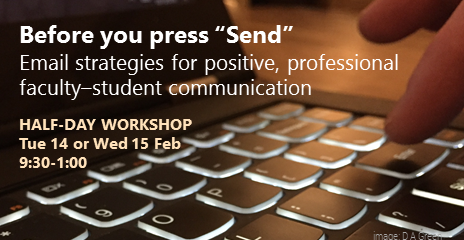
Before you press “Send”: Email strategies for professional and positive relationships with your students
Tue, Feb 14 | 9:30-1:00 | Casey Commons | Lunch provided
OR
Wed, Feb 15 | 9:30-1:00 | Casey Commons | Lunch provided
Facilitated by Bryan Ruppert | Albers
Email is an easy-to-use form of communication between faculty and students. We can email them and they can email us about any topic related to the course from anywhere and at any time of day—or night.
Yet how often do you feel that:
- you’re overwhelmed by the sheer volume of email from students?
- you spend a disproportionate amount of time replying to an email that took a student only a few moments to send?
- you agonize for far too long over how to phrase something in an email to a student?
- you wish you could pull an email back after having hit “send?”
In this half-day workshop, we’ll look at what communication research and one instructor’s application of that research suggest are successful practices in email use in the Seattle University context. We’ll review emerging basic etiquette in professional email and explore how to apply this etiquette to our own context of emails to and from students. Together we’ll identify common themes in faculty–student email communication and draft email templates for recurring message types.
You’ll leave the workshop with a sense of when email can work for or against student learning and professional formation. Importantly, you’ll also see how you can reduce the time you spend in your inbox.
Request a consultation on this topic.
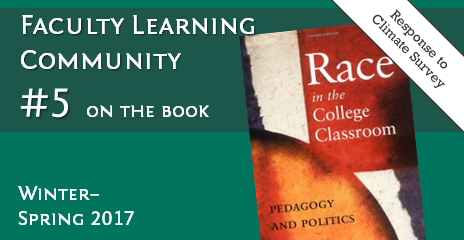
Faculty Learning Community #5:
Race in the college classroom: Pedagogy and politics
Co-sponsored by the Office of Institutional Inclusion and Chief Diversity Officer
What are the challenges facing a college professor who believes that teaching responsibly requires an honest and searching examination of race?
In Race in the College Classroom, edited by Bonnie TuSmith and Maureen T. Reddy, twenty-nine professors from the sciences, social sciences, humanities, and education seek to answer this question as they discuss the multiple facets and implications of teaching race in a racialized society.
Among other aspects, the authors address the temptation not to challenge students for fear of reprisals, how the classroom environment is itself structured by race, and the varying ways that faculty of color and white faculty are affected by teaching about race in their classes.
In this four-session Faculty Learning Community over winter and spring (facilitator TBA), we will progress through the chapters of the book and will reflect on how we currently address race in our own classrooms and what transformative practices will help us do so better.
5a. What's in it for you?
Over the four sessions, this book and our discussions will help you:
- Build a community of colleagues with whom to discuss the pedagogical challenges of race
- Find ways to dismantle the structures of race that often unwittingly operate in our classrooms
- Explore strategies to transform student learning by addressing race, rather than circumventing it
This community is for any faculty members who wish to strengthen their understanding of how race affects the academy in general and their own classes in particular. Whether in a discipline that addresses race as a regular part of the curriculum or one that tends to avoid it, this learning community will benefit all who wish to engage in racially just pedagogies.
Fall 2016
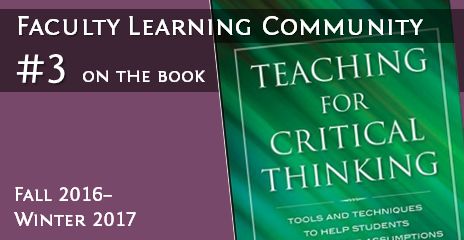
Teaching for critical thinking: Tools and techniques to help students question their assumptions
FACULTY LEARNING COMMUNITY
16FQ-17WQ
One of the few areas of agreement between educators, employers, and politicians is the need for graduates to be able to “think critically,” yet how that looks in reality can vary greatly between disciplines.
In Teaching for Critical Thinking, Stephen Brookfield distills these many approaches to create a basic protocol of critical thinking that focuses on students uncovering assumptions, exploring alternative perspectives, and taking informed action. Through a shared understanding of what constitutes critical thinking and how we might capture it, Brookfield goes on to provide broad principles and targeted exercises and activities that we can adapt to our different disciplinary settings.
In this four-session Faculty Learning Community over fall and winter, facilitated by Dean Peterson (Economics), we will progress through the chapters of the book and will consider how we might focus on critical thinking more proactively and transparently in one of our own courses.
Over the four sessions, this book and our discussions will help you:
- Clarify what critical thinking looks like in your own discipline
- Develop teaching methods that explicitly promote critical thinking among your students
- Explore critical thinking approaches that you might be able to adapt from other disciplines
This community is for any faculty members who wish to strengthen their students’ critical thinking in discussions, reading, and writing, whether in face-to-face, online, or hybrid courses.
Request a consultation on this topic.
Borrow this book from the Center's Library.
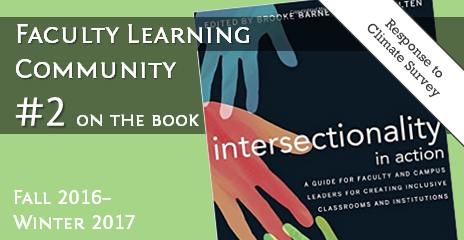
Intersectionality in action: A guide to faculty and campus leaders for creating inclusive classrooms and institutions
FACULTY LEARNING COMMUNITY
16FQ-17WQ
There has been much public debate recently on how to create a campus culture where all members feel included and supported. Brooke Barnett and Peter Felten have collected eleven essays into one learned guide for faculty and campus leaders in their efforts to create inclusive classrooms and institutions that do more than celebrate cultural difference and discourage intolerance of others.
This groundbreaking book aims to help readers, no matter what position they occupy on campus, develop the knowledge and capacities necessary to do this essential work and is premised on the understanding that identity, oppression, power, and marginalization cannot be addressed by looking solely at single identities.
In this three-session Faculty Learning Community facilitated by Natasha Martin (Associate Vice President for Institutional Inclusion and Chief Diversity Officer) over fall and winter, we will progress through topics of intersectionality and 1) the recruitment and retention of students, faculty, and staff; 2) the development of inclusive leaders, governing bodies, and advisory boards; 3) the campus environment; and 4) the larger world.
Over the four sessions, this book and our discussions will help you:
- Understand the multi-dimensional nature of intersectionality as a concept of identity formation;
- Develop campus leaders and structures that sustain an inclusive campus community;
- Create opportunities for civic engagement that are inclusive and transformative; and
- Link how working at the intersections of identity can lead to a more just and humane world.
This community is for any faculty member or academic leader who wishes to explore means of creating a more welcoming and inclusive campus environment using the lens of intersectionality.
Request a consultation on this topic.
Borrow this book from the Center's Library.
Find out about "faculty learning communities" and see the Center for Faculty Development's current FLC offerings.
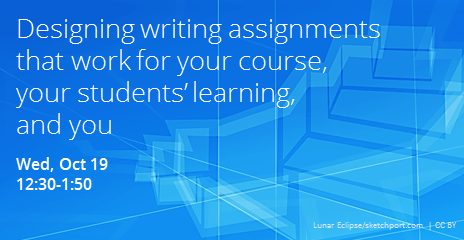
Designing writing assignments that work for your course, your students’ learning, and you
LUNCHTIME WORKSHOP
Wed, Oct 19 | 12:30–1:50 | Casey Commons | Lunch provided
Facilitated by Dr. June Johnson Bube (Core Writing Consultant and Director of Writing Studies)
Co-sponsored by the University Core
- Have you ever been inspired by an idea for a writing assignment but then had reservations about how it furthered your course goals?
- Have you ever given a writing assignment in class and then received emails from puzzled students asking for clarification?
- Have you ever read a set of papers and discovered that only a few students in the class were prepared for the complexity of the writing tasks you had given them?
Creating effective writing assignments is one of the most challenging aspects of teaching and is closely related to the University Core curriculum’s emphasis on encouraging students to become competent, flexible academic writers.
Effective writing assignments stimulate students’ learning and creative/critical thinking and result in papers that are interesting for you to read and grade.
In this workshop we’ll consider the challenges of designing writing assignments and will discuss the features of best practices according to the research on student writing. The second half of the workshop will offer you the opportunity to share and receive feedback on a writing assignment you are using this year in a Core class you are teaching.
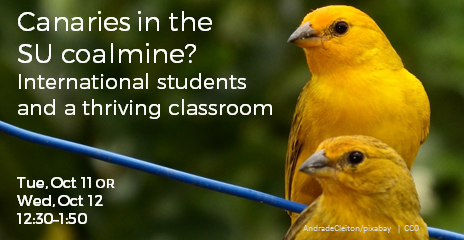
Canaries in the SU coalmine? International students and a thriving classroom
LUNCHTIME WORKSHOP
Tue, Oct 11 | 12:30-1:50 | Casey Commons | Lunch provided
OR
Wed, Oct 12 | 12:30-1:50 | Casey Commons | Lunch provided
Facilitated by David Green
Co-sponsored by the Office of Global Engagement
Fifteen percent of SU’s students are international, according to our latest figures (fall 2015). Their presence brings opportunities to encourage understanding and communication across cultures, but the reality in the classroom can often feel very different.
We hear concerns that class dynamics noticeably shift as the proportion of international students increases; in last year’s campus climate survey, 20% of students reported experiencing tension in classroom discussions that they felt was specifically due to the international status of some class members. In addition, bringing international and US students together for group tasks and projects can pose challenges for both sets of students – and for their professors.
Yet while it is tempting to see international students as a group with unique issues, they have more persuasively been likened to “canaries in the coalmine” of higher education, alerting us to potential issues in our classes that other students could also find challenging (Ryan & Carroll, 2005).
In this workshop, we draw on the research and on our own experiences at SU to explore what these “canaries” might be telling us about our classes and how we might make adjustments – whether subtle or substantial – to cultivate the kinds of culture where all our students feel welcomed and heard, and where everyone is learning.
2015-16
Spring 2016
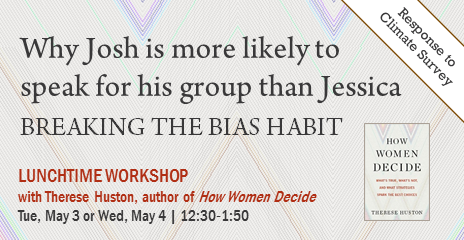
Why Josh is more likely to speak for his group than Jessica: Breaking the bias habit
LUNCHTIME WORKSHOP
Tue, May 3 | 12:30-1:50 | Casey Commons | Lunch provided
OR
Wed, May 4 | 12:30-1:50 | Casey Commons | Lunch provided
Facilitated by Therese Huston
The next time you have students work in small groups, notice who speaks for each group when you ask them to report out. Chances are you’ll hear from more men than women, even if women participated heavily in the discussion and offered thoughtful contributions up until that moment.
Why does this happen? And do similar patterns emerge in, say, department meetings?
We’ll look at some of the ways popular culture treats men as having more intellectual heft and more valuable decision-making skills. How might these all-too-common assumptions about gender and judgment encourage students to participate at some times and not others? How do these habits also unconsciously play out in how we, as faculty, behave?
In this workshop, we'll develop strategies for curbing gender bias in our classrooms and our professional lives. We’ll share approaches for bringing everyone's best ideas to the table.
Therese Huston is author of the much-anticipated book How Women Decide: What’s true, what’s not, and what strategies spark the best choices (2016, Houghton Mifflin Harcourt) and of Teaching What You Don’t Know (2012, Harvard UP). She a cognitive psychologist and was the founding director of Seattle University’s Center for Faculty Development (“CETL”), where she continues to consult with faculty to help them excel in their teaching. A treat for colleagues at Seattle University, this workshop is a sneak peek at some of the ideas from her new book, and how they relate to our classes – as well as our professional lives more generally. You can also hear Therese talk about her book at Town Hall Seattle on May 10; more information at https://townhallseattle.org/event/therese-huston/
Winter 2016
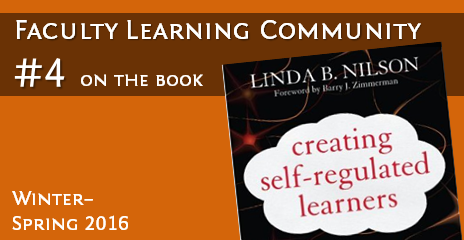
Creating self-regulated learners: Strategies to strengthen students' self-awareness and learning skills
FACULTY LEARNING COMMUNITY
16WQ-16SQ
Most students neither know how learning works nor what they have to do to ensure it, to the detriment both of their studies and their development as lifelong learners.
Linda Nilson’s point of departure in this book is the literature on “self-regulated learning” that tells us that deep, lasting, independent learning requires learners to bring into play a range of cognitive skills, affective attitudes, and even physical activities – about which most students are wholly unaware; and that self-regulation, which has little to do with measured intelligence, can be developed by just about anyone and is a fundamental prerequisite of academic success.
In this four-session Faculty Learning Community over winter and spring, we will progress through the chapters of the book and will consider how we might embed activities on self-regulation in one of our own courses.
Over the four sessions, this book and our discussions will help you:
- Adapt tested activities and assignments to your own courses so that students can progressively reflect on, monitor, and improve their learning skills
- Integrate self-regulation activities with different course components
- Prepare for introducing self-regulation activities in the classroom, recognizing that most of us are unfamiliar with these strategies.
This community is for any faculty members who wish to enhance their students’ skills in reflection, self-regulation, and lifelong learning.
Request a consultation on this topic.
Borrow this book from the Center's Library.
Find out about "faculty learning communities" and see the Center for Faculty Development's current FLC offerings.
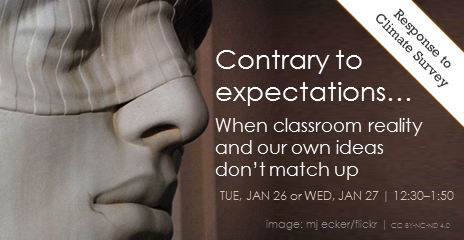
Contrary to expectations: When classroom reality and our own expectations don't match up
LUNCHTIME WORKSHOP
January 26 and 27, 2016
Facilitated by David Green
In response to the Campus Climate Survey
Walk into any classroom at Seattle U and the chances are that the make-up of the classroom does not resemble the classes you attended when you were a student. Today’s students entering higher education at all levels come from more varied backgrounds than in the past, and we see a greater diversity of characteristics, perspectives, and experiences than ever before.
Our own mental image of students, however, is often more homogenous. How does this influence our behaviors and expectations? What unintended consequences may unfold when our unconscious ideas of higher education are not aligned with the classroom reality?
The university’s recent Campus Climate Survey reveals that we have plenty of room to make our classes a place where our students feel both welcomed and intellectually challenged. So in this lunchtime workshop, we’ll explore our expectations and mental images by examining a student vignette, based on real data from a published study of faculty expectations (Popovic & Green, 2012). Through discussion, we’ll develop our own tailored strategies for keeping our mental images in check so that the classroom reality is one in which all our students can thrive.
Request a consultation on this topic.
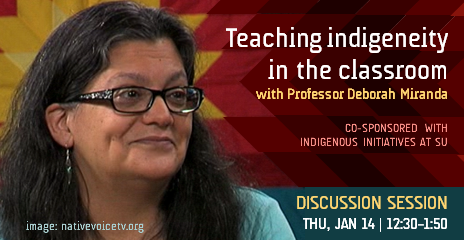
Teaching indigeneity in the classroom
GUEST SPEAKER DISCUSSION SESSION
January 14, 2016
Guest speaker: Dr. Deborah Miranda (Washington and Lee University)
Co-sponsored by Dr. Christina Roberts, Program Director for Indigenous Initiatives at SU
Indigenous voices and perspectives remain for the most part absent or silent in US university classrooms, and Seattle U is no exception. If we want to change that, though, how do we approach conversations about Indigeneity and Native American history, cultures, and societies in our courses? What does it even mean to be Indigenous in the 21st century? To explore these questions and think about them in your own context, join Professor Deborah Miranda, author of Bad Indians: A Tribal Memoir and Raised by Humans, for this open discussion.
Dr. Deborah Miranda is Professor of English at Washington & Lee University in Lexington, VA, where she teaches creative writing and literature of the margins. Her work has been widely published in literary journals, scholarly journals and anthologies, and lends itself to interdisciplinary approaches; it is taught in Native Studies, Creative Writing, Women and Gender Studies, Anthropology, American Literature, Poetry, History, Sociology courses across North America, Europe, and Australia.
Request a consultation on this topic.
Fall 2015
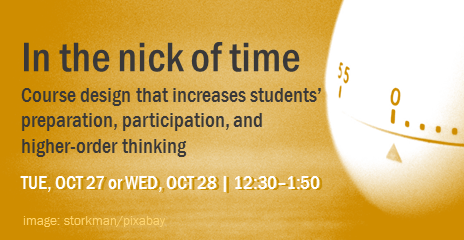
In the nick of time: Course design that increases students' preparation, participation, and higher-order thinking
LUNCHTIME WORKSHOP
October 27 or 28, 2015
Have you ever been disappointed—even exasperated!—by the poor level of discussion and participation in class, despite having really capable students? You may have witnessed lackluster conversation that struggles to reach the levels we (and our students) are right to expect at university. You may have also been frustrated by your students’ apparent lack of familiarity with the most basic facts and theory. Worse still, you may have been faced with either a wall of silence or have conducted a one-on-one conversation with what seems to be the only student both prepared and willing to speak up.
These scenarios may not happen often, but they may happen enough that you’re now looking for ways of helping your students raise their game. After all, national and SU-specific data tell us that many students are indeed underprepared for their classes: We know from the NSSE Survey that the average SU undergrad studies outside class for 15 hours per week total.
So how might course design help you to help them so that they are genuinely ready to engage and learn in class?
In this workshop, we’ll work together to explore one approach to course design that seeks to address this issue constructively. This approach, called “just-in-time teaching,” focuses class time on the sticking points in the curriculum by creating a straightforward feedback loop between you and your students, requiring students to think about—and give feedback on—the reading in advance of class, and helping you discover where their energies are best concentrated.
During the workshop, you’ll get the chance to focus on a specific session in one of your courses so that by the end, you’ll have devised some strategies and questions that will allow you to experiment with this learning-focused approach in the near future. Please remember to bring a syllabus and/or class notes for a specific session with you.
2014-15
Spring 2015
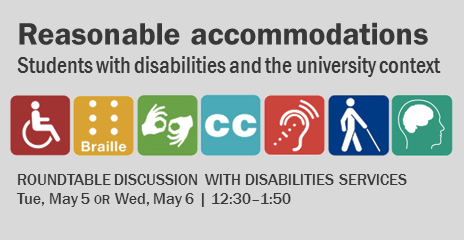
Reasonable accommodations: Students with disabilities and the university context
ROUNDTABLE DISCUSSION WITH DISABILITIES SERVICES
May 5 or 6, 2015
Student disabilities are manifested in many different ways – from the mild to the chronic, from the physical to the psychological – and the university works hard to find reasonable accommodations that allow our students with disabilities to succeed without changing the criteria on which they are evaluated.
Even when we are familiar with these practices, though, we still have questions about how best to support our students and how to manage particular situations. For example, how do we best support students with chronic conditions? How do we respond to students’ emotional outbursts in class? Above all, how can we have constructive and comfortable conversations with our students about how we accommodate their disabilities in our classes?
In this roundtable session with Disabilities Services staff, you’ll have the opportunity to raise areas of uncertainty, learn from your peers, and develop new strategies for ensuring that our students with disabilities receive both a reasonable and an equitable academic experience.
Request a consultation on this topic.
Winter 2015
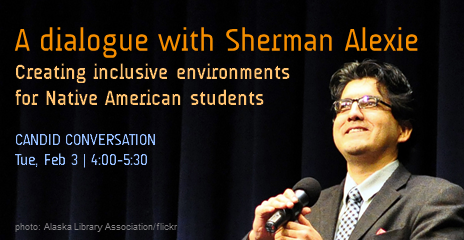
A dialogue with Sherman Alexie: Creating inclusive environments for Native American students
CANDID CONVERSATION
February 3, 2015
Co-sponsored by Dr. Christina Roberts, Program Director for Indigenous Initiatives at SU
As SU faculty consider various approaches to "Inclusive Excellence," we also need to consider inequities in student success and how to close achievement gaps by creating opportunities for underrepresented students. Recent literature about Native American student success in higher education points to the importance of maintaining familial connections and a student's ability to function bi-culturally.
So what resources do faculty need to make excellence inclusive of Native American, Alaska Native, and Indigenous students? How do we support these students toward success at Seattle University? Join local author Sherman Alexie in a candid conversation about working with Native American students.
Request a consultation on this topic.
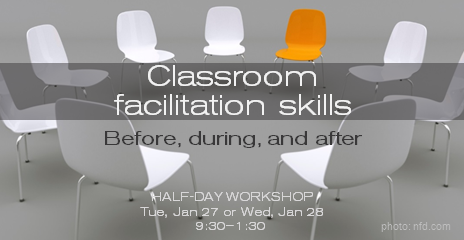
Classroom facilitation skills: Before, during, and after
HALF-DAY WORKSHOP
January 27 or 28, 2015
Facilitated by Suzanne de Janasz (2014-15 Thomas F. Gleed Chair of Business Administration, Albers School of Business & Economics)
Many professors have heard about faculty moving from the “sage on the stage” to the “guide on the side,” eschewing the traditional lecture format in favor of more participative approaches to boost student learning. But how exactly do we put that idea into practice? What facilitation approaches might be most effective before, during, and after an interactive class session?
In this hands-on extended workshop, you will first engage in discussion on the art of classroom facilitation—a student-centered approach that involves relinquishing control and allowing class sessions to evolve naturally. And then you will have the opportunity to learn, practice, and receive feedback on your own facilitation skills using a highly experiential format.
This session provides you the chance to hone your classroom facilitation skills and to consider the benefits and challenges of being a facilitator as opposed to a lecturer.
Request a consultation on this topic.
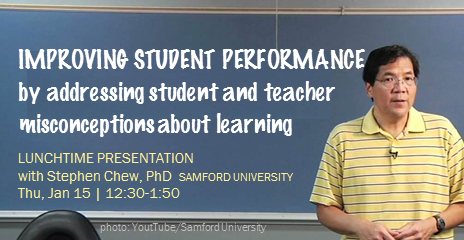
Improving student performance by addressing student and teacher misconceptions about learning
LUNCHTIME WORKSHOP
January 15, 2015
Presented by Stephen Chew (professor and chair of psychology at Samford University; Birmingham, Alabama)
Co-sponsored by Student Academic Services, Housing and Residence Life, and University CORE
This lunchtime presentation examines common misconceptions among both students and teachers that undermine student learning.
Students often overestimate their level of understanding, mistakenly believe they can multi-task effectively, and select poor learning strategies. Teachers often believe that student engagement, “active” learning, and struggle are critical to teaching effectiveness when these concepts have serious limitations.
In this session, our guest presenter will discuss and demonstrate some key cognitive principles that must be addressed for any pedagogy to be effective. Finally, he will describe a series of videos he has developed to help students learn to study effectively based on cognitive research.
Request a consultation on this topic.
Fall 2014
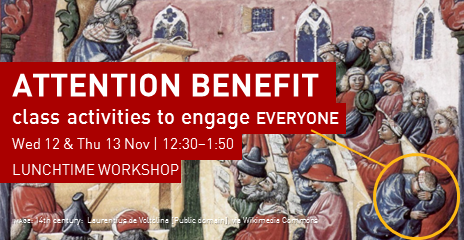
Attention benefit: Class activities to engage everyone
LUNCHTIME WORKSHOP
November 12 or 13, 2014
Facilitated by David Green
The issue of short attention spans is not new: A 14th-century Italian painting of a lecture shows one student with his head on his arm, either bored or asleep.
And we have also known for a long time that breaking up classes into different types of activity – group work, presentation, pair work, individual reflection – aids attention and keeps students intellectually engaged.
While we talk about active learning a lot on campus, we don't often discuss the process – the nuts and bolts of how we put it into practice. In this hands-on session, you will get to experiment with active learning strategies both as an instructor and as a participant.
Whether this is new to you or is simply a refresher, you will come away with a handful of techniques and activities that you can adapt for your own courses to vary the pace and keep your students’ attention.
Request a consultation on this topic.
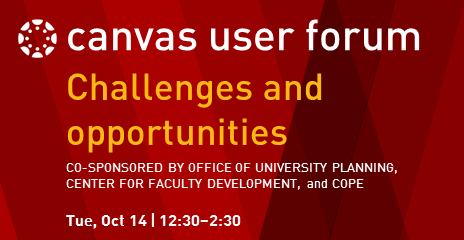
Canvas User Forum: Challenges and opportunities
October 14, 2014
Co-sponsored with the Office of University Planning and COPE
At this third Canvas User Forum, faculty presenters will share how they addressed common questions in teaching and learning through innovative uses of the Canvas Learning Management System (LMS).
What opportunities does the technology provide to improve teaching and learning? Have there been unexpected results in the application of technology – both challenging and remarkable?
Each faculty presenter will share their experience and introduce ongoing questions to the group for general discussion.
In the weeks following the forum, hands-on workshops will be held to help interested faculty with “how-to” logistics of implementing use of particular tools.
For individual consultations, in-person workshops, and online resources for using Canvas, contact the
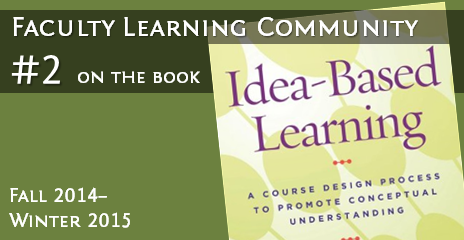
Idea-Based Learning
FACULTY LEARNING COMMUNITY
14FQ-15WQ
How do you systematically design a course so that it truly promotes deep learning and the kinds of critical thinking we espouse in academia? Edmund Hansen’s Idea-Based Learning provides a step-by-step process for thinking about and designing a course around our disciplines’ big ideas, focusing on key elements that will help maximize our students’ potential.
In this four-session, facilitated Faculty Learning Community over fall and winter, we will progress through the chapters and develop or revise our own courses following Hansen’s recommendations, and we’ll discuss the sticking points and epiphanies we discover along the way.
This community is for any faculty member who is either designing a new course or revising an existing one.
Request a consultation on this topic.
Borrow this book from the Center's Library.
2013-14
Spring 2014
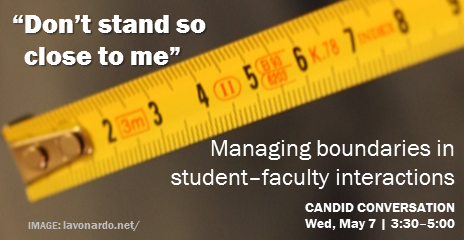
Don't stand so close to me: Managing boundaries in student-faculty interactions
CANDID CONVERSATION
Wed, May 7, 2014
Facilitated by David Green
On the face of it, boundaries may sound like a non-issue at SU, and yet we know from the associate deans that this is a hot topic on campus that can begin on either side of a student–faculty interaction.
These interactions cover a wide range, from using first names to taking a student for lunch to discuss a class issue, from texting between instructor and student to a faculty member adopting the role of counselor or social worker in an attempt to support a student.
Inescapable power differentials—where one individual grades the work of another—add a layer of complexity to these interactions, especially when SU faculty often feel a strong responsibility to get to know their students as part of the university’s value of “care.” Indeed the research on the importance of rapport for a positive learning environment would back up those efforts, but only up to a point.
So where exactly does the dividing line lie? What difficulties might we unexpectedly find ourselves in? And what kinds of repercussions are colleges and schools reporting around the country?
In this late-afternoon session, we’ll have the chance for a candid conversation over drinks and appetizers to discuss this tightrope-walk of being friendly without being a friend and to weigh up the many options available to us to demonstrate we care in a way that is healthy for us all.
Request a consultation on this topic.
Winter 2014
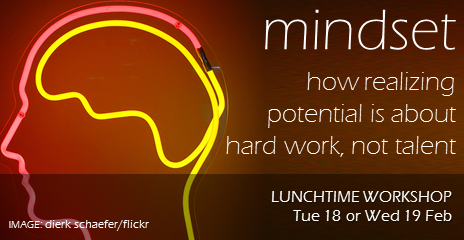
Mindset: How realizing potential is about hard work, not talent
LUNCHTIME WORKSHOP
Tue, Feb 18 and Wed, Feb 19, 2014
Presented by Therese Huston and David Green
There's a popular notion in many western countries that some of us are “naturally talented” at, say, math or writing, while others “just aren't good at it.” Although it can feel marvelous to hear we're “talented,” we've probably also experienced situations where we've felt pigeonholed by our supposed lack of talent. Talking about ability in these terms creates a surprisingly self-defeating mindset that holds many of us back; we stop trying and we underperform.
In our roles as instructors, we hope for students who will stretch themselves and keep trying, even when they find the material hard to learn. So how can we foster that attitude toward ability?
In this workshop, we’ll take a close look at research showing that changing how we talk about success can lead to tremendous improvements in students’ perseverance and performance. We'll examine what we might be saying that inadvertently discourages some students from trying harder and will identify strategies for working positive, change-oriented language into our everyday teaching. By recalibrating mindsets – both the students' and our own – we can boost our students' potential and see it realized in our courses.
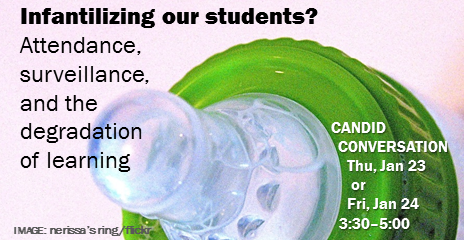
Infantilizing our students? Attendance, surveillance, and the degradation of learning
CANDID CONVERSATION
Thu, Jan 23, and Fri, Jan 24, 2014
Facilitated by David Green
Many of us require attendance in our classes. We expect students to engage actively with the material and with one another. We check who has viewed pages on Canvas. We monitor online discussions for levels of contribution. And we often assign points for each of these as a carrot, or introduce penalties as a stick.
Why do we do this? Common reasons are that it is for the students’ own good, that it reflects our university’s value of “care,” and that it gives students practice for workplace professionalism.
While these reasons may be valid, could the opposite be true at the same time? That by removing choice, we infantilize students, deny them agency and academic freedom, and thwart their chances of developing their own professionalism through trial and error? Or that by awarding points for everything students do, we perpetuate a point-chasing attitude more akin to high school, at the expense of higher learning in a post-compulsory setting?
In this late-afternoon session, we’ll have the chance for a candid conversation over drinks and appetizers to discuss these troubling and paradoxical notions and to weigh up the many alternatives available to us.
Fall 2013
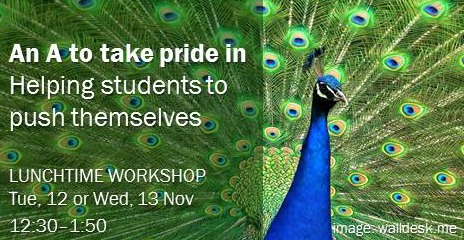
An A to take pride in: Helping students to push themselves
LUNCHTIME WORKSHOP
Tue, Nov 12, or Wed, Nov 13, 2013
When did “superior work” – an A – become viewed as commonplace? How do we reset our students’ expectations so that they achieve more in their assignments and so that everyone comes away feeling that genuine learning has taken place? As university professors, many of us grapple with these questions, and with the thorny issue of how to “frame” assignments to motivate students while remaining challenging.
In this workshop, we’ll explore an approach to assignments that combines our desire for academic rigor with a constructive use of grading schemes—probably unlike ones you have seen before. This alternative approach encourages students to be more imaginative, critical, and ambitious in their studies; it means they’ll have to stretch themselves to earn that “superior” A, and that a B returns to its rightful place as the label for “good work.”
Remember to bring an assignment or two with you so that you can work on your own courses during the workshop.
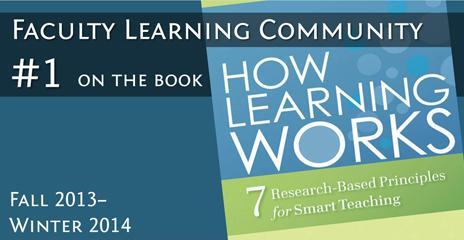
How learning works
FACULTY LEARNING COMMUNITY
13FQ and 14WQ
Are you interested in finding out more about your students’ learning and adjusting your own courses as a result? How Learning Works, written by faculty developers from Carnegie Mellon University, is grounded in evidence from cognitive sciences, education, and psychology, and presents seven key principles that we can use to underpin the design of our courses. Covering such topics as mastery, prior knowledge, motivation, and classroom climate, this book has gained an international reputation for its clarity, rigor, and practicality. Over five sessions in Fall and Winter, we’ll be able to increase our understanding of learning, plan concrete changes for our classes, and discuss the results of these changes with an interdisciplinary group of peers.
Over the course of this 5-part series, you’ll
- set regular goals to try out new ideas in your current courses,
- learn insights from the book and other group members,
- provide one another feedback on your course experiments and adjustments,
- have the support of colleagues who are facing similar issues, and
- gain confidence in your ability to make well-informed decisions to aid your students’ learning.
This community is for any faculty member who would like to take a more research-based approach to teaching. Ideally, you would be teaching in both Fall and Winter so that you can put new ideas into use immediately and are therefore better able to contribute to group discussion and reflection. This will give everyone greater insight into the variability of teaching contexts and norms, and can lead to a deeper appreciation of disciplinary nuances in higher education.
Request a consultation on this topic.
Borrow this book from the Center's Library.
2012-13
Spring 2013
No learning and teaching events held this quarter.
Winter 2013
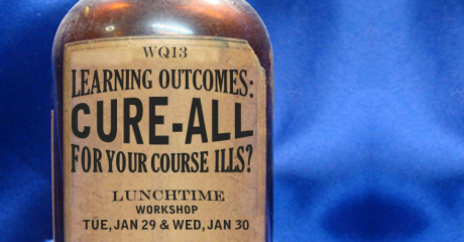
Learning outcomes: Cure-all for your course ills?
LUNCHTIME WORKSHOP
January 29 or 30, 2013
Presented by David Green
Many course ailments arise from problems with course design: students’ misunderstanding of our expectations, students’ difficulty seeing the forest for the trees, everyone feeling overwhelmed with content to cover, and a mismatch between our course delivery methods and the ways in which we assess our students’ performance. These are among the most common issues raised with CETL consultants.
At the root of these ills is the tricky question of “learning outcomes.” Whatever type of course we choose to run – face-to-face, hybrid, or online – good learning outcomes can help our courses stay healthy environments for learning. But despite seeming straightforward, learning outcomes can be fiendishly difficult to write well. In this workshop, you’ll experiment with learning outcomes to help you prevent the course aches and pains that drain your time and energy, replacing them with a healthy foundation for a positive educational experience.
Bring a copy of a course syllabus you’d like to revise.
Request a consultation on this topic.
Fall 2012
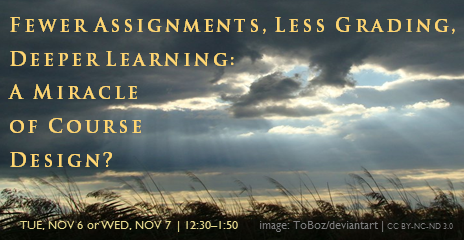
Fewer assignments, less grading, deeper learning: A miracle of course design?
LUNCHTIME WORKSHOP
November 6, or 7, 2012
Presented by David Green
Discover the counter-intuitive relationship between the number of graded assignments and the quality of learning. Research shows that students take deeper approaches to learning when they don’t feel overloaded with course content or with a stressful barrage of assignments in a course. With the right design, fewer graded assignments with higher point values can lead to a richer learning experience for your students.
In this workshop, you’ll have chance to focus on one of your own courses to work out what combination of course design adjustments could help your students take a deeper approach to the subject while reducing your grading. The suggestions you’ll explore will address concerns about superficial learning, an inability to transfer knowledge to new areas, perceived busywork, and an overemphasis on grades earned rather than the content learned. You’ll leave the workshop with your own list of priorities to help improve the learning environment in your classes.
2011-12
Spring 2012
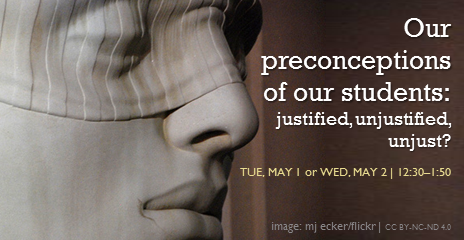
Our preconceptions of our students: Justified, unjustified, unjust?
LUNCHTIME WORKSHOP
May 1 or 2, 2012
Presented by David Green
We all have ideas about the typical stellar or not-so-stellar student, but we rarely have the opportunity to test these ideas. Our preconceptions may put us at risk of missing key evidence; more importantly, they may prevent us from noticing students in real need of our support and encouragement. This workshop is based on an international study where professors’ preconceptions were compared with data from over 1,000 of their students, including actual grades. So is it true, for instance, that students with sports scholarships do less well than other students, or that white students are more likely to excel? Does it make a difference if students sit at the back of the class, if they regularly attend religious services, or if they speak English at home? Together we’ll examine which preconceptions proved accurate and which inaccurate and will then explore what actions we might take in our classes to level the playing field so that our students have a more equitable chance of success.
Request a consultation on this topic.
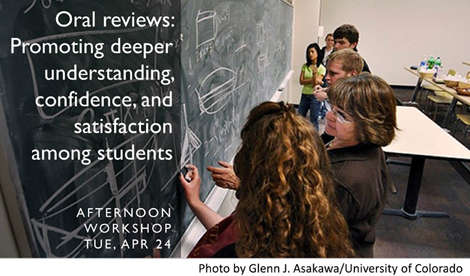
Oral reviews: Promoting deeper understanding, confidence, and satisfaction among students
AFTERNOON WORKSHOP
April 24, 2012
Presented by Mary Nelson (George Mason University)
Co-sponsored by the Mathematics Department, College of Science & Engineering
Oral reviews are hour-long, ungraded opportunities for students, working with faculty, to negotiate meaning, make conceptual connections, discuss why procedures work, and draw representations that make concepts clearer. In this talk, our guest speaker will outline the oral review process and present data that demonstrate a strong correlation between oral reviews and improved conceptual understanding, confidence, retention, and satisfaction, using examples from the field of calculus.
Calculus I was once notoriously reported to have a 40% failure rate nationally. To address this, the Applied Mathematics Department at the University of Colorado, Boulder, offers oral reviews to all Calculus I and II students, which has resulted in dramatic improvement in student performance. This talk gives us all opportunity to consider how we might use oral reviews in our own disciplines to enhance the learning experience.
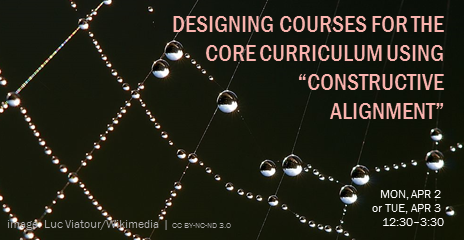
Designing courses for the Core Curriculum using "constructive alignment"
April 2 or 3, 2012
Facilitated by David Green
At this stage in the Core revision process, many of us are busy working to produce outlines of new or adapted courses that will be exciting for us to teach and engaging for students to participate in and learn from. During this three-hour workshop, we’ll share CETL’s spin on the course design process, using the “constructive alignment” model for producing solid course proposals. Constructive alignment will help make the implementation process much smoother for you and your students, saving you time in the long run. It leaves you with a clear, but flexible framework for your course, providing enough clarity up-front, while allowing you scope to get creative in the final run-up to delivering your courses. You’ll leave the workshop having made concrete progress along the way to producing your final outline ready for the Core review process.
Winter 2012
POGIL: Award-winning pedagogy from Washington State's Professor of the Year
LUNCHTIME WORKSHOP
February 15 or 16, 2012
Facilitated by Vicky Minderhout and Jenny Loertscher | Chemistry Department
Washington State Professor of the Year Vicky Minderhout has been celebrated for transforming her chemistry classes with POGIL—Process-Oriented Guided Inquiry Learning. POGIL is a pedagogy based on evidence that learners are more likely to succeed when they work in small groups in an active classroom; it recognizes that knowledge is personal, that students develop greater ownership over course material when they can construct their own understanding, and that they enjoy learning more when actively engaged. In this interactive workshop, led by Vicky and her POGIL colleague, Jenny Loertscher, you’ll experience the POGIL structure and explore how you might apply POGIL principles in your own courses to promote student learning.

Professional formation in the age of entitlement
LUNCHTIME WORKSHOP
February 8 or 9, 2012
Facilitated by David Green
Co-sponsored by Albers School of Business and Economics
With increasing talk of a students’ sense of entitlement and with the student-as-consumer metaphor gaining ground in higher education, how can we as faculty dedicate ourselves to the “professional formation” of students, as called for in SU’s mission? How might we reframe our interactions with students and harness their self-assuredness to enhance their educational experience? In this workshop, we’ll discuss strategies, opportunities, and liabilities in how we interact with students both in- and out-of-class. You’ll also reach some preliminary conclusions about how best to enhance your students’ professional formation in your own courses.
Request a consultation on this topic.
“Outcomes schmoutcomes” versus “Impressive objectives:” A candid conversation on Learning Outcomes
CANDID CONVERSATION
January 20, 2012
Facilitated by David Green
Mere mention of the phrase “learning outcomes” – or “learning objectives” – can raise the hackles of many a faculty member throughout the English-speaking world. And yet the learning outcomes agenda and the discourse of outcomes assessment are fast permeating US higher education, driven in large part by the accrediting bodies that assure the quality of our degree programs.
In this late-afternoon session, we’ll have the chance for a candid conversation over drinks and appetizers to discuss both the problematic and the promising aspects of learning outcomes. What pitfalls do we see and how do we sidestep them? What benefits might learning outcomes present and how do we capitalize on them? What can we learn from faculty experiences of the learning outcomes process in other countries? We look forward to your cordial contentiousness.
Fall 2011
The good, the bad, and the ugly: Analyzing and acting on student evaluation comments
October 19 or 20, 2011
Presented by Therese Huston
2010-11
Spring 2011
No learning and teaching events this quarter.
Winter 2011
Academic reflective writing: Practice connecting the mind to what matters? | Larry Nichols (English and The Writing Center) | February 2011
"It's in the syllabus—So why don't they get it?" Universal Design for Learning | Carol Weaver (Education) | February 2011
A candid conversation on "grade inflation" | David Green | January 2011
Fall 2010
"That's so gay." Responding to incendiary comments in the classroom | David Green | November 2010
Energizing long classes | David Green and Therese Huston | October 2010
"Minimal Marking:" Reducing the grading load while giving good feedback | John Bean (English) and David Green | October 2010
2009-10
Spring 2010
What's said and not said: Navigating classroom discomfort around gender, race, and social class | Ed Reed (Matteo Ricci College) | May 2010
Looking to learn: Developing visual literacy across the disciplines | Deandra Little (University of Virginia) | May 2010
Project and protect: Voice skills for faculty | Sibylle Just (Neurologisches Reha-Zentrum, Wiesbaden & University of Giessen, Germany) | April 2010
Winter 2010
Encouraging students to read: incentives, disincentives, and raising the bar intellectually | David Green | February 2010
Teaching to diversity: the multinational classroom | David Green (Co-sponsored by Albers School of Business and Economics) | February 2010
Responsive teaching: how mid-term evaluations and minor course adjustments can improve student learning | David Green and Therese Huston | January 2010
Fall 2009
No learning and teaching events this quarter.
2008-09
Spring 2009
Pursuing deep learning and social change: academic service learning | Jeffrey Anderson (College of Education / Faculty Fellows Program) and Kent Koth (Center for Service and Community Engagement) | May 2009
Teaching what you don't know | David Green and Therese Huston | April and May 2009
"Students today aren't what they used to be!" The millennial generation and its impact on the classroom | David Green and Therese Huston (Co-sponsored by Albers School of Business and Economics) | April 2009
Winter 2009
Optimizing student teams: key lessons from teams research to enhance the team experience for everyone | Jennifer Marrone (Management, Albers School of Business and Economics) | February 2009
Future-gazing and sustainability: Teaching students to conceptualize change | Celia Popovic (Birmingham City University, UK) | February 2009
Academic rigor: promoting deep approaches to learning | David Green and Therese Huston | February 2009
Teaching multiculturally inclusive courses – across the disciplines | Matt Ouellett (University of Massachusetts, Amherst) | January 2009
Fall 2008
Pearls of wisdom or just grit: Soliciting more helpful feedback from students on course evaluations | David Green and Therese Huston | November 2008
Redesigning your writing assignments | John Bean (English, College of Arts & Sciences) and Larry Nichols (The Writing Center) | November 2008
Trouble-shooting your classroom discussions | David Green and Therese Huston | October 2008
2007-08
Spring 2008
Feedback that informs: Creating stimulus for change in peer reviews of teaching | Carol Weaver (Education) | May 2008
The art of good seminars | Russ Lidman (Institute for Public Service, College of Arts and Sciences) | May 2008
From monologue to dialogue: Moderating online discussions | Carlos De Mello-e-Souza (Accounting, Albers School of Business and Economics), David Green, and Bill Hill (Office of Information Technology) | April 2008
Winter 2008
Globalization in the classroom: Making the most of multinational student groups | David Green | February 2008
"But the test had nothing to do with the class!" Redesigning courses to match assignments, outcomes and teaching methods | David Green | February 2008
Thinking outside the box: Promoting students' independent thinking skills | David Green | February 2008
Responding to challenges in the classroom: Incidents and impacts of disruptive student behavior | David Green and Therese Huston | January 2008
Fall 2007
Carrot or stick: Getting students to do the reading | David Green and Therese Huston | November 2007
Integrating service and learning through reflection | David Green, Therese Huston, and Kent Koth (Center for Service and Community Engagement) | November 2007
Using mid-term evaluations to improve your teaching | David Green and Therese Huston | October 2007
2006-07
Spring 2007
Engaging diversity (impromptu session after guest speaker was unable to attend) | David Green and Therese Huston | May 2007
Changes in attitudes: Incidents and impacts of disruptive student behavior | David Green and Therese Huston | May 2007
PowerPoint: Always for good, never for evil! | David Green and Bill Hill (Office of Information Technology) | May 2007
The art of good discussions II | David Green and Therese Huston | May 2007
The art of good discussions I | Jacob Diaz (Student Development) and Bridget Kelly (Education) | May 2007
Turning difficult moments into teachable moments III: Academic service learning and the self-righteous mindset | Therese Huston and Kent Koth (Center for Service and Community Engagement) | April 2007
Using grading rubrics to make your expectations clear | David Green and Therese Huston | April 2007
Brown bag sessions on teaching and faculty issues around Virginia Tech | David Green and Therese Huston | April 2007
Winter 2007
Making your assignments more interesting to grade | David Green | January and February 2007
Turning difficult moments into teachable moments II: Academic service learning and gender | David Green and Kent Koth (Center for Service and Community Engagement) | January 2007
Teaching writing across borders | David Green, Therese Huston, and Larry Nichols (The Writing Center) | January 2007
Fall 2006
Turning difficult moments into teachable moments I: Academic service learning and race | Therese Huston and Kent Koth (Center for Service and Community Engagement) | November 2006
Teaching through a collective tragedy | Therese Huston | October 2006
More information will be added here soon; check back again later.
